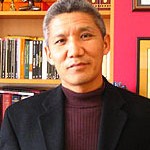
President, Institute of Tibetan Classics
Senior Contemplative Advisor and Board of Directors Chair, Mind and Life Institute
Adjunct Professor of Religious Studies, McGill University

by CCARE Staff

President, Institute of Tibetan Classics
Senior Contemplative Advisor and Board of Directors Chair, Mind and Life Institute
Adjunct Professor of Religious Studies, McGill University
In this dialogue CCARE’s founder and director, Dr. James Doty, asks Thupten Jinpa about his life’s work and what role compassion may have played.
Thupten Jinpa is a former monk and has been the principal English translator to H.H. the Dalai Lama for nearly thirty years. Trained as a Geshe in the Tibetan tradition Jinpa also holds a BA and PhD from Cambridge University, where he worked as a research fellow. As a visiting scholar at Stanford University, Jinpa was a founding member of CCARE and the principal author of Compassion Cultivation Training (CCT). His published works include translations of numerous books by the Dalai Lama such as Ethics for the New Millennium and Beyond Religion, as well as his own work Self, Reality and Reason in Tibetan Philosophy and the forthcoming A Fearless Heart: How the Courage to be Compassionate Can Transform Our Lives. He is an adjunct professor of religious studies at McGill University, president of the Institute of Tibetan Classics, and chairman of the Mind and Life Institute, which is dedicated to promoting dialogues and collaborations between the sciences and contemplative knowledge, especially Buddhism. He lives in Montreal with his wife and daughters.
by
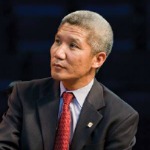
About This Event
In this dialogue CCARE’s founder and director, Dr. James Doty, will ask Thupten Jinpa about his life’s work and what role compassion may have played. This event is an hour-long dialogue followed by questions from the audience. The talk will be recorded and posted to CCARE’s YouTube Channel and website several weeks after the event.
About Thupten Jinpa
Thupten Jinpa is a former monk and has been the principal English translator to H.H. the Dalai Lama for nearly thirty years. Trained as a Geshe in the Tibetan tradition Jinpa also holds a BA and PhD from Cambridge University, where he worked as a research fellow. As a visiting scholar at Stanford University, Jinpa was a founding member of CCARE and the principal author of Compassion Cultivation Training (CCT). His published works include translations of numerous books by the Dalai Lama such as Ethics for the New Millennium and Beyond Religion, as well as his own work Self, Reality and Reason in Tibetan Philosophy and the forthcoming A Fearless Heart: How the Courage to be Compassionate Can Transform Our Lives. He is an adjunct professor of religious studies at McGill University, president of the Institute of Tibetan Classics, and chairman of the Mind and Life Institute, which is dedicated to promoting dialogues and collaborations between the sciences and contemplative knowledge, especially Buddhism. He lives in Montreal with his wife and daughters.
About His New Book
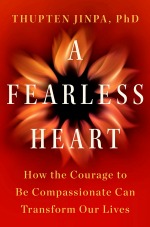 His new book, A Fearless Heart, teaches, argues, and inspires, filled with remarkable stories of transformations that have resulted from the practice of compassion, including the author’s extraordinary personal experience as well; from a monastery in India, to fatherhood in Montreal, and all the lessons learned in between. A Fearless Heart is now available to order here and can be found in stores.
His new book, A Fearless Heart, teaches, argues, and inspires, filled with remarkable stories of transformations that have resulted from the practice of compassion, including the author’s extraordinary personal experience as well; from a monastery in India, to fatherhood in Montreal, and all the lessons learned in between. A Fearless Heart is now available to order here and can be found in stores.
*Event Update: Stanford Bookstore will be selling copies of A Fearless Heart at the event, and Jinpa will be signing books after the talk.
A Fearless Heart is a rare book that shows how the meeting of contemplative insights and practices with modern science can lead to offerings that are beneficial for everyone interested in deeper personal spiritual transformation. The book shows how such practices can have positive impact in our daily lives. I applaud my long-time English translator Thupten Jinpa for writing this timely book on compassion and its cultivation. –The Dalai Lama
Registration
Registration is required for access to seating before the event starts.
Non-registrants are still welcome to attend. Dependent upon space, any available seats will be offered on a first-come, first-serve basis once the event begins.
Doors open at 5:30PM.
Parking
Cubberley Auditorium is located just off the Main Quad, in the School of Education, next to the clock tower at the intersection of Escondido Mall and Lasuen Mall. Parking is generally free on campus after 4pm; however, please read signs carefully. Park either on the main Oval, or the Memorial Lot just north of the Memorial Hall on Memorial Way, or South of the campus union at Mayfield Ave.
“The Science of Compassion: Origins, Measures, and Interventions,” which took place July 19th to 22nd, 2012 in Telluride, Colorado, was the first large-scale international conference of its kind dedicated to scientific inquiry into compassion. The conference convened a unique group of leading world experts in the fields of altruism, compassion, and service to present their latest research. This talk was part of the panel “Origins and Conceptual Models of Compassion” by Thupten Jinpa, Ph.D.
Thupten Jinpa has been a principal English translator to His Holiness the Dalai Lama since 1985. He has translated and edited more than a dozen books by the Dalai Lama including the New York Times bestseller Ethics for the New Millennium (Riverhead, 1999), Transforming the Mind (Thorsons, 2000), and Universe in a Single Atom: The Convergence of Science and Spirituality (Morgan Road Books, 2005). Jinpa’s own works include Self, Reality and Reason in Tibetan Philosophy and Mind Training: The Great Collection. Thupten Jinpa received his early education and training as a monk and received the Geshe Lharam degree from Ganden Monastic University, south India. Jinpa holds B.A. Honors in Philosophy and a Ph.D. in Religious Studies, both from Cambridge University, UK, where he also worked as a research fellow in Eastern Religion. Since 1999 Jinpa has been the president of the Institute of Tibetan Classics and editor-in-chief of the Institute’s The Library of Tibetan Classics series. Jinpa is an adjunct professor at McGill University’s Faculty of Religious Studies and is a senior contemplative advisor to the Mind and Life Institute, dedicated to fostering creative dialogue between the Buddhist tradition and modern science.
by
Thupten Jinpa has been a principal English translator to His Holiness the Dalai Lama since 1985. He has translated and edited more than a dozen books by the Dalai Lama including the New York Times bestseller Ethics for the New Millennium (Riverhead, 1999), Transforming the Mind (Thorsons, 2000 ), and Universe in a Single Atom: The Convergence of Science and Spirituality (Morgan Road Books, 2005). Jinpa’s own works include Self, Reality and Reason in Tibetan Philosophy and Mind Training: The Great Collection. Thupten Jinpa received his early education and training as a monk and received the Geshe Lharam degree from Ganden Monastic University, south India. Jinpa holds B.A. Honors in Philosophy and a Ph.D. in Religious Studies, both from Cambridge University, UK, where he also worked as a research fellow in Eastern Religion. Since 1999 Jinpa has been the president of the Institute of Tibetan Classics and editor-in-chief of the Institute’s The Library of Tibetan Classics series. Jinpa is an adjunct professor at McGill University’s Faculty of Religious Studies and is a senior contemplative advisor to the Mind and Life Institute, dedicated to fostering creative dialogue between the Buddhist tradition and modern science.
Watch an interview with Thupten Jinpa: Video
Register here. Registration guarantees a seat if you check in prior to 6:15PM at the event, after that the doors will be opened up for the public and seating will not be guaranteed.
October 14, 2011

Written by Margaret Cullen.
Most English speakers who have attended the teachings of the Dalai Lama have actually heard his wisdom through the voice of Thupten Jinpa, who has served as translator for His Holiness since 1985. A highly trained Buddhist scholar and practitioner in his own right, Jinpa’s monastic training at the Shartse College of Ganden culminated in the distinguished Geshe Lharam degree. He then obtained a BA in philosophy and a Ph.D. in religious studies, both from Cambridge University. He has translated and edited more than twelve books by the Dalai Lama and written books of his own. And yet, what is striking about Jinpa’s presence with His Holiness is not only his exquisite fluency with the English language, and the depth of his understanding of complex and subtle aspects of Buddhist philosophy, but the genuine warmth, humor and unstinting affection displayed on stage between these two remarkable men. More often than not, they are leaning in toward each other, the tops of their heads almost touching, until one or the other roars with laughter.
Jinpa was invited to be a visiting research scholar by the recently established Center for Compassion and Altruism Research and Education (CCARE) at Stanford University, where he has developed a program titled Compassion Cultivation Training. This eight-week secular program consists of a sequence of exercises that progressively cultivate mental stability through present-focused attention and compassion for friends and family, self, strangers and disliked people. (To learn more about this program, read the accompanying article Opening the Heart at Stanford, Google and Beyond.)
To read the full article, click here.
Jazaieri, H., McGonigal, K., Lee, I. A., Jinpa, T., Doty, J. R., Gross, J. J., & Goldin, P. R. (2017). Altering the trajectory of affect and affect regulation: The impact of compassion training. Mindfulness. Advance online publication. doi: 10.1007/s12671-017-0773-3
Investigators examined the effects of a compassion training program on affect and affect regulation by implementing a 9-week compassion cultivation training (CCT) program and analyzing four affective states (anxiety, calm, fatigue, alertness) as well as the desire and capability to regulate them. Daily trajectories showed a general decrease in anxiety and an increase in calmness, likely due to participants tending to choose acceptance of the affective experience, regardless of whether they were negative or positive. At the same time, participants also reported more capability in meeting their goals for affective regulation. Over the course of the training program, participants reported greater acceptance in the face of stress and/or anxiety. Implications for the effects of compassion training programs on affective regulation and self-efficacy are discussed.
by CCARE Staff
September 3, 2015 | Uncategorized
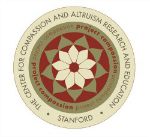
Compassion Cultivation Training (CCT) is an educational program designed to help improve resilience and build connections with others—ultimately providing an enhanced overall sense of well-being. The founders and senior teachers who developed CCT combined traditional contemplative practices with contemporary psychology and scientific research designed to effectively help create a more compassionate life for all participants in the program.
CCT has been highly impactful and evidence continues to grow demonstrating its efficacy. Since the initial development of CCT, its founders and senior teachers have been busy helping people develop more ways to access this profound material. Here are a few of the latest developments from the CCT founding team:
New East Bay CCT course offering! Join Erika Rosenberg at UC Berkeley
Senior CCT teacher, Erika Rosenberg, will be offering a CCT course this fall at the University of California-Berkeley. The course meets on Mondays, October 5-November 30, from 7-9pm. Tuition is $285/person. To register, please complete this submission form.
Principal Founder of CCT, Thupten Jinpa, Releases New Book, A Fearless Heart
Thupten Jinpa’s new book, A Fearless Heart: How the Courage to Be Compassionate Can Transform Our Lives, teaches and inspires! Filled with remarkable stories of transformation that have resulted from the practice of compassion, including Jinpa’s extraordinary personal story, this book conveys lessons of CCT in a whole new way. Read about Jinpa’s journey; from a monastery in India to fatherhood in Montreal, and all the lessons learned in between. A Fearless Heart is available to order here.
Think about stress in a new way with CCT Senior Teacher Kelly McGonigal
Kelly McGonigal shares the surprising science behind stress in her latest book,mThe Upside of Stress: Why Stress is Good For You, and How to Get Good at It. She is known for her popular TED Talk on this topic, “How to Make Stress Your Friend,” and in her new book, she dives into the research to show we can actually lead a healthier life when we know how to embrace stress. Click here to order your copy of Kelly’s book now.
New Workbook by Margaret Cullen and Colleagues
Margaret Cullen, senior CCT teacher, and Gonzalo Brito Pons, certified CCT instructor, co-authored the new workbook: The Mindfulness-Based Emotional Balance Workbook: An Eight-Week Program for Improved Emotion Regulation and Resilience, which is listed as #1 New Release in Mood Disorders on Amazon. Order your copy here!
The book brings together the fundamentals of mindfulness based stress reduction with a focus on the understanding and management of emotions, including challenging emotions such as fear and anger, as well as the cultivation of forgiveness, compassion and kindness. The nature and function of emotions are explored and there are 11 guided meditations and visualizations that accompany the book.
by

Discover potent practices that cultivate more inner peace and soul-powered ways to take inspired action in your home, your community and the world. Join 75+ top peacebuilders, including CCARE’s Dr. James Doty, Thupten Jinpa, and Kelly McGonigal along with Deepak Chopra, Ervin Laszlo, Grandmother Agnes Pilgrim, Karen Armstrong and Congressman Tim Ryan, who will help you bring inner, interpersonal and collective peace efforts to the next level.
This year, The Summer of Peace is featuring 3 new summits you won’t want to miss. They include:
The Global Compassion Summit (July 7-9)
The Subtle Activism Summit (September 8-10)
11 Days of Global Unity Summit (September 11-21)
The largest online peace event on the planet is happening for free June 13 – Sept. 21. Join here: https://shiftnetwork.isrefer.com/go/sop15JD/doty/
July 2, 2015

Written by Leah Weiss.
Many of us are called to make the world a better place, but it isn’t necessarily clear where to start. We want to respond to the big and small suffering in our communities and the larger world but it isn’t straightforward how to do this in a way that is both sustainable for ourselves and objectively impactful. Out of the desire to support people in embodying compassion in the midst of busy, complicated lives, the idea for the Compassion Cultivation Training Protocol was born.
The Compassion Cultivation Training (CCT) program was developed at Stanford University’s Center for Compassion and Altruism Research and Education (CCARE). CCARE investigates methods for cultivating compassion and promoting altruism within individuals and society through rigorous research, scientific collaborations, and academic conferences. CCT and other featured public events and programs belong to the educational part of CCARE or the E in the acronym CCARE.
The CCT protocol was created by Thupten Jinpa, a former Tibetan monk and the principal English interpreter for the Dalai Lama. The program was enhanced with contributions from an interdisciplinary team of researchers including neuroscientists, psychologists, and contemplative scholars – Kelly McGonigal, Margaret Cullen, Erika Rosenberg, Leah Weiss, and Philippe Goldin.
To read the full article, click here.
Jazaieri, H., Lee, I. A., McGonigal, K., Jinpa, T., Doty, J. R., Gross, J. J., & Goldin, P. (2015). A wandering mind is a less caring mind: Daily experience sampling during compassion meditation training. Journal of Positive Psychology. doi:10.1080/17439760.2015.1025418
The effects of the Compassion Cultivation Training (CCT) program, a 9-week, twice daily compassion meditation, was found to reduce mind wandering towards neutral thoughts and increased caring behaviors for oneself. Further path analysis indicated that compassion meditation was associated with reduced mind wandering for unpleasant thoughts and increased mind wandering to pleasant thoughts, and that both were associated with increased caring behavior for oneself and others. This is the first known study to lend partial support that formal compassion training reduces mind wandering while increasing caring behavior not only for oneself but also for others.
by CCARE Staff
December 18, 2013 | Uncategorized

Tania Singer of the Max Planck Institute has spearheaded a fantastic new resource for compassion enthusiasts. Compassion researchers and trainers have comp together and produced a free e-book compiling great information on compassion science and education. Some of our CCARE instructors and affiliated scientists have written chapters. You can find all of the materials here, enjoy!
“In July 2011, I was honored to be invited to an innovative meeting in Berlin, Germany, hosted by Neuroscientist Dr. Tania Singer, of the Max Planck Institute, and held in the studio space of artist Olafur Eliasson. The purpose of the meeting was to present and explore different was of measuring compassion from teachers, scientists, contemplatives, and practitioners from various disciplines. Professor Singer originally called this meeting to help her develop ideas for a secularized compassion-training program for her longitudinal neuroscience research. What emerged from this gathering, in addition to a glorious three days of conversation, presentation, practice, was a deep enthusiasm to share what we learned with others in the service of cultivating compassion. In addition to the research and training that resulted from this effort (and much has!), we agreed to collectively produce some kind of document or book to share with other and commemorate the event.
Olafur Eliasson had already started a film about compassion, in which he interviewed many of the participants about compassion, science, contemplative practice, and art called Raising Compassion (http://www.compassion-
CCARE Compassion Cultivation Teacher and Teacher Trainer
 Margaret Cullen is a Licensed Marriage and Family Therapist and a Certified Mindfulness-Based Stress Reduction Teacher, having trained extensively with Jon Kabat-Zinn. She has also trained with Zindel Segal in Mindfulness-Based Cognitive Therapy and in MB Eat with Jean Kristeller. For sixteen years she has been teaching and pioneering mindfulness programs in a variety of settings including cancer support, HIV support, physician groups, executive groups, teachers, and Kaiser Permanente patients. She collaborated on teaching and writing curricula for several research programs at UCSF, including “Cultivating Emotional Balance,” designed for teachers and “Craving and Lifestyle Management with Meditation,” for overweight women. In 2008 she launched a mindfulness-based emotional balance program (SMART) for teachers and school administrators in Denver, Boulder, Ann Arbor, and Vancouver, B.C. She has collaborated on the revision of mindfulness curricula for Kaiser Permanente in northern California and for the Center for Compassion at Stanford, and has spoken publicly on these and related topics, including forgiveness and conflict resolution. She has also been a facilitator of support groups for cancer patients and their loved ones for 20 years at The Wellness Community. A meditation practitioner for 30 years, she is a frequent contributor to “Inquiring Mind.”
Margaret Cullen is a Licensed Marriage and Family Therapist and a Certified Mindfulness-Based Stress Reduction Teacher, having trained extensively with Jon Kabat-Zinn. She has also trained with Zindel Segal in Mindfulness-Based Cognitive Therapy and in MB Eat with Jean Kristeller. For sixteen years she has been teaching and pioneering mindfulness programs in a variety of settings including cancer support, HIV support, physician groups, executive groups, teachers, and Kaiser Permanente patients. She collaborated on teaching and writing curricula for several research programs at UCSF, including “Cultivating Emotional Balance,” designed for teachers and “Craving and Lifestyle Management with Meditation,” for overweight women. In 2008 she launched a mindfulness-based emotional balance program (SMART) for teachers and school administrators in Denver, Boulder, Ann Arbor, and Vancouver, B.C. She has collaborated on the revision of mindfulness curricula for Kaiser Permanente in northern California and for the Center for Compassion at Stanford, and has spoken publicly on these and related topics, including forgiveness and conflict resolution. She has also been a facilitator of support groups for cancer patients and their loved ones for 20 years at The Wellness Community. A meditation practitioner for 30 years, she is a frequent contributor to “Inquiring Mind.”
 Mary Gomes is a Professor of Psychology at Sonoma State University, and a core faculty member in Sonoma State’s Depth Psychology MA program. She has been practicing Tibetan Buddhist meditation for 25 years at the Nyingma Institiute of Tibetan Studies in Berkeley. She integrates mindfulness and compassion practices into her undergraduate coursework at Sonoma State, and has a long-standing interest in nature awareness practices and a commitment to ecological sustainability. She is co-editor of the book “Ecopsychology: Restoring the Earth, Healing the Mind.” Dr. Gomes received her BA from Harvard University, and her PhD in Psychology from Stanford.
Back to top of page
Mary Gomes is a Professor of Psychology at Sonoma State University, and a core faculty member in Sonoma State’s Depth Psychology MA program. She has been practicing Tibetan Buddhist meditation for 25 years at the Nyingma Institiute of Tibetan Studies in Berkeley. She integrates mindfulness and compassion practices into her undergraduate coursework at Sonoma State, and has a long-standing interest in nature awareness practices and a commitment to ecological sustainability. She is co-editor of the book “Ecopsychology: Restoring the Earth, Healing the Mind.” Dr. Gomes received her BA from Harvard University, and her PhD in Psychology from Stanford.
Back to top of page
 Meika Hamisch has practiced psychotherapy for over 30 years. She has been a trainer and educator in the area of compassionate communication skills, substance abuse, counseling skills, psychology, cross cultural perspectives in therapy, mindfulness and self-compassion cultivation methods. She is a certified teacher in Cultivating Emotional Balance. Meika provides consultation, groups, and training in mindfulness and CCT in both Sacramento and Monterey, California. Meika can be contacted through her website.
Meika Hamisch has practiced psychotherapy for over 30 years. She has been a trainer and educator in the area of compassionate communication skills, substance abuse, counseling skills, psychology, cross cultural perspectives in therapy, mindfulness and self-compassion cultivation methods. She is a certified teacher in Cultivating Emotional Balance. Meika provides consultation, groups, and training in mindfulness and CCT in both Sacramento and Monterey, California. Meika can be contacted through her website.
 Priscilla is a board certified physician in Internal Medicine, Pulmonary and Sleep Medicine, certified teacher in Compassion Cultivation Training (CCT), Ananda Meditation, Hatha and Restorative Yoga, and teacher/facilitator in Mindfulness Based Stress Reduction. Priscilla has interests in the role of mindfulness, compassion, mindful movement, Yang Tai Chi, writing practice “Writing Down The Bones” by Natalie Goldberg, nature photography, and music in health, wellness, and healing.
Priscilla is a board certified physician in Internal Medicine, Pulmonary and Sleep Medicine, certified teacher in Compassion Cultivation Training (CCT), Ananda Meditation, Hatha and Restorative Yoga, and teacher/facilitator in Mindfulness Based Stress Reduction. Priscilla has interests in the role of mindfulness, compassion, mindful movement, Yang Tai Chi, writing practice “Writing Down The Bones” by Natalie Goldberg, nature photography, and music in health, wellness, and healing.
 Lori Wong is the founding teacher of Insight Meditation Central Valley, a graduate of Spirit Rock’s Community Dharma Leader program, a board member of Sati Center for Buddhist Studies, and has been offering mindfulness meditation and Buddhist teachings in the Central Valley since 2009. She was a founding director of the Buddhist Insight Network and has volunteered for the Buddhist Pathways Prison Project. She has offered workshops on mindfulness and compassion for Stanislaus County Behavioral Health and Recovery Services as part of their Community Capacity Building Initiative. She is collaborating with Stanislaus County Department of Aging and Veteran Services to teach CCT to family caregivers and to social workers who provide services for veterans. She has been practicing Insight Meditation and mindfulness since 2003 under the guidance of Gil Fronsdal, who is the principal and founding teacher of the Insight Meditation Center (IMC) in Redwood City, CA. For information on upcoming CCT classes, workshops, or other teachings in Modesto and the Central Valley, please visit the Awaken Compassion website.
Back to top of page
Lori Wong is the founding teacher of Insight Meditation Central Valley, a graduate of Spirit Rock’s Community Dharma Leader program, a board member of Sati Center for Buddhist Studies, and has been offering mindfulness meditation and Buddhist teachings in the Central Valley since 2009. She was a founding director of the Buddhist Insight Network and has volunteered for the Buddhist Pathways Prison Project. She has offered workshops on mindfulness and compassion for Stanislaus County Behavioral Health and Recovery Services as part of their Community Capacity Building Initiative. She is collaborating with Stanislaus County Department of Aging and Veteran Services to teach CCT to family caregivers and to social workers who provide services for veterans. She has been practicing Insight Meditation and mindfulness since 2003 under the guidance of Gil Fronsdal, who is the principal and founding teacher of the Insight Meditation Center (IMC) in Redwood City, CA. For information on upcoming CCT classes, workshops, or other teachings in Modesto and the Central Valley, please visit the Awaken Compassion website.
Back to top of page
 Nicholas is the Director of CompassionLA, a Los Angeles-based nonprofit offering compassion and mindfulness programs. In addition to being a certified CCT Teacher, he has been trained to teach Mindful Self-Compassion (MSC) by founding teachers Kristin Neff and Christopher Germer. He also teaches the heavily researched Mindfulness-Based Stress Reduction (MBSR) program and is a Certified Mindfulness Facilitator by UCLA’s Mindful Awareness Research Center at the Semel Institute for Neuroscience and Human Behavior. Nicholas is a perennial student of wisdom and compassion practices and has been cross-trained in multiple arenas with compassion at their core such as mindfulness, Internal Family Systems psychotherapy, somatic-based trauma resiliency, nonviolent communication, and end of life presence. He has practiced Vipassana meditation intensively in the US, Burma, and Thailand and is a graduate of Spirit Rock’s Dedicated Practitioner’s Program.
Nicholas is the Director of CompassionLA, a Los Angeles-based nonprofit offering compassion and mindfulness programs. In addition to being a certified CCT Teacher, he has been trained to teach Mindful Self-Compassion (MSC) by founding teachers Kristin Neff and Christopher Germer. He also teaches the heavily researched Mindfulness-Based Stress Reduction (MBSR) program and is a Certified Mindfulness Facilitator by UCLA’s Mindful Awareness Research Center at the Semel Institute for Neuroscience and Human Behavior. Nicholas is a perennial student of wisdom and compassion practices and has been cross-trained in multiple arenas with compassion at their core such as mindfulness, Internal Family Systems psychotherapy, somatic-based trauma resiliency, nonviolent communication, and end of life presence. He has practiced Vipassana meditation intensively in the US, Burma, and Thailand and is a graduate of Spirit Rock’s Dedicated Practitioner’s Program.
 Albert Grabb is a practicing radiologist at Torrance Memorial Medical Center located in the greater Los Angeles area. Having practiced yoga and meditation for over 15 years, his primary focus has become sharing these practices with fellow healthcare workers. In 2013, he completed the certification in Mindfulness Facilitation program offered through the Mindful Awareness Research Center at UCLA and became certified to teach CCT in 2014. Dr. Grabb currently co-teaches CCT within the Torrance Memorial Health System with Compassion LA founder Nicholas Bruss, another CCT Certified Instructor. For information about CCT facilitation in the greater Los Angeles area, please contact Albert at his website.
Back to top of page
Albert Grabb is a practicing radiologist at Torrance Memorial Medical Center located in the greater Los Angeles area. Having practiced yoga and meditation for over 15 years, his primary focus has become sharing these practices with fellow healthcare workers. In 2013, he completed the certification in Mindfulness Facilitation program offered through the Mindful Awareness Research Center at UCLA and became certified to teach CCT in 2014. Dr. Grabb currently co-teaches CCT within the Torrance Memorial Health System with Compassion LA founder Nicholas Bruss, another CCT Certified Instructor. For information about CCT facilitation in the greater Los Angeles area, please contact Albert at his website.
Back to top of page
 For Mary Doane, teaching CCT joins threads of study and practice that have carried through her life for more than 25 years. She is the Senior Instructor of Education Programs and a curriculum consultant at Zen Caregiving Project (formerly known as Zen Hospice Project) in San Francisco, CA, where she served as a volunteer bedside caregiver for over a decade. Mary has completed Buddhist Chaplaincy training at the Sati Center for Buddhist Studies, and Being With Dying training for clinicians at Upaya Institute and Zen Center. Prior, she studied socially engaged Buddhist practice with the Buddhist Peace Fellowship. Mary is trained and certified by Stanford University’s Center for Compassion and Altruism Research and Education (CCARE) as a Compassion Cultivation Training (CCT©) instructor. Her teaching is informed by an abiding trust in compassion as the truest response to all our human experiences. Mary teaches throughout the San Francisco Bay Area, and welcomes contact by email.
For Mary Doane, teaching CCT joins threads of study and practice that have carried through her life for more than 25 years. She is the Senior Instructor of Education Programs and a curriculum consultant at Zen Caregiving Project (formerly known as Zen Hospice Project) in San Francisco, CA, where she served as a volunteer bedside caregiver for over a decade. Mary has completed Buddhist Chaplaincy training at the Sati Center for Buddhist Studies, and Being With Dying training for clinicians at Upaya Institute and Zen Center. Prior, she studied socially engaged Buddhist practice with the Buddhist Peace Fellowship. Mary is trained and certified by Stanford University’s Center for Compassion and Altruism Research and Education (CCARE) as a Compassion Cultivation Training (CCT©) instructor. Her teaching is informed by an abiding trust in compassion as the truest response to all our human experiences. Mary teaches throughout the San Francisco Bay Area, and welcomes contact by email.
 Erika Rosenberg is scientist and a meditation teacher. At the Center for Mind and Brain at UC Davis, she is a senior investigator on the Shamatha Project, a multi-disciplinary study of how intensive meditation affects cognition, emotion, and neurophysiology. Dr. Rosenberg is a world-renowned expert in facial expressions of emotion who trains and consults on facial measurement with academic, corporate, and entertainment industry clients. She is a senior teacher at Stanford University’s Center for Compassion and Altruism Research and Education, where she contributed substantially to the development of the Compassion Cultivation Training (CCT) program with Thupten Jinpa and others in 2009. In 2010 she offered the new course at Google, Inc. and presented the CCT program to His Holiness the Dalai Lama. Dr. Rosenberg is Faculty at The Nyingma Institute of Tibetan Studies in Berkeley and has offered meditation trainings in diverse international venues such as: Lerab Ling Monastery, Upaya Zen Center, The Telluride Institute, and Burning Man. Erika Rosenberg is co-author of the McGraw-Hill textbook, Psychology: Perspectives and Connections, 3e, and numerous scientific articles and chapters on facial expression, emotion, and meditation.
Back to top of page
Erika Rosenberg is scientist and a meditation teacher. At the Center for Mind and Brain at UC Davis, she is a senior investigator on the Shamatha Project, a multi-disciplinary study of how intensive meditation affects cognition, emotion, and neurophysiology. Dr. Rosenberg is a world-renowned expert in facial expressions of emotion who trains and consults on facial measurement with academic, corporate, and entertainment industry clients. She is a senior teacher at Stanford University’s Center for Compassion and Altruism Research and Education, where she contributed substantially to the development of the Compassion Cultivation Training (CCT) program with Thupten Jinpa and others in 2009. In 2010 she offered the new course at Google, Inc. and presented the CCT program to His Holiness the Dalai Lama. Dr. Rosenberg is Faculty at The Nyingma Institute of Tibetan Studies in Berkeley and has offered meditation trainings in diverse international venues such as: Lerab Ling Monastery, Upaya Zen Center, The Telluride Institute, and Burning Man. Erika Rosenberg is co-author of the McGraw-Hill textbook, Psychology: Perspectives and Connections, 3e, and numerous scientific articles and chapters on facial expression, emotion, and meditation.
Back to top of page
 In her day job, Chanda works in the Tech industry, lending reality to understanding the stresses of everyday living. For two decades, she has been an active practitioner of meditation, self-inquiry and the Healing arts. Chanda is a recent graduate of the Compassion Institute and a certified Facilitator of Compassion Cultivation Training. She is a Reiki Master and has over a decade of active practice experience in Reiki and Healing Touch in the local community. Additionally she has two years of experience teaching Reiki to small class sizes. Her organizational and management skills, stemming from 20+ years of working as an exec in the tech industry have helped her with presentations, organizing classes and teaching. Her PhD in Computer Science, and the discipline for data driven analysis has been an asset to her when it comes to understanding the in-depth research around compassion and the workings of the mind! She is continually amazed at human-kind’s immense capacity to nurture and stay centered in the heart and to be magically connected with every one and every thing around us. She can be reached via email.
In her day job, Chanda works in the Tech industry, lending reality to understanding the stresses of everyday living. For two decades, she has been an active practitioner of meditation, self-inquiry and the Healing arts. Chanda is a recent graduate of the Compassion Institute and a certified Facilitator of Compassion Cultivation Training. She is a Reiki Master and has over a decade of active practice experience in Reiki and Healing Touch in the local community. Additionally she has two years of experience teaching Reiki to small class sizes. Her organizational and management skills, stemming from 20+ years of working as an exec in the tech industry have helped her with presentations, organizing classes and teaching. Her PhD in Computer Science, and the discipline for data driven analysis has been an asset to her when it comes to understanding the in-depth research around compassion and the workings of the mind! She is continually amazed at human-kind’s immense capacity to nurture and stay centered in the heart and to be magically connected with every one and every thing around us. She can be reached via email.
 James Hallenbeck is an Associate Professor of Medicine at Stanford University in the Division of General Medical Disciplines. He is Associate Chief of Staff for Extended Care and Director of Palliative Care services at the VA Palo Alto Healthcare System. As a hospice physician, Dr. Hallenbeck has worked extensively with veterans at the end of life over the past 20 years. Building on a personal interest in meditation, in 2011 he was trained as a facilitator in Stanford’s Compassion Cultivation Training course. Over the past year he has been teaching the course to veterans struggling with post-traumatic stress disorder at VA Palo Alto. He is also interested in adaptations of the course for healthcare workers, who may be struggling with burnout and compassion fatigue. He is the author of the book Palliative Care Perspectives, published in 2003 by Oxford University Press. He has received awards from the California Hospice and Palliative Care Association and the Journal of Palliative Medicine as a pioneer in palliative care.
James Hallenbeck is an Associate Professor of Medicine at Stanford University in the Division of General Medical Disciplines. He is Associate Chief of Staff for Extended Care and Director of Palliative Care services at the VA Palo Alto Healthcare System. As a hospice physician, Dr. Hallenbeck has worked extensively with veterans at the end of life over the past 20 years. Building on a personal interest in meditation, in 2011 he was trained as a facilitator in Stanford’s Compassion Cultivation Training course. Over the past year he has been teaching the course to veterans struggling with post-traumatic stress disorder at VA Palo Alto. He is also interested in adaptations of the course for healthcare workers, who may be struggling with burnout and compassion fatigue. He is the author of the book Palliative Care Perspectives, published in 2003 by Oxford University Press. He has received awards from the California Hospice and Palliative Care Association and the Journal of Palliative Medicine as a pioneer in palliative care.
 Monica Hanson specializes in introducing and adapting meditation with specific populations. As an instructor for the Center for Compassion and Altruism Research and Education (CCARE), Monica piloted the Compassion Cultivation Training (CCT) program with military veterans in the Palo Alto VA Healthcare System, and currently teaches CCT in the Be Well program for undergraduate and graduate students at Stanford University and in public classes offered through the Stanford School of Medicine. In addition, she has taught meditation with corporate and healthcare professionals, teachers, families, and people experiencing chronic pain and stress. Her background includes training in mindfulness, nonviolent communication, and therapeutic yoga at Duke University’s Integrative Medicine Center.
Monica Hanson specializes in introducing and adapting meditation with specific populations. As an instructor for the Center for Compassion and Altruism Research and Education (CCARE), Monica piloted the Compassion Cultivation Training (CCT) program with military veterans in the Palo Alto VA Healthcare System, and currently teaches CCT in the Be Well program for undergraduate and graduate students at Stanford University and in public classes offered through the Stanford School of Medicine. In addition, she has taught meditation with corporate and healthcare professionals, teachers, families, and people experiencing chronic pain and stress. Her background includes training in mindfulness, nonviolent communication, and therapeutic yoga at Duke University’s Integrative Medicine Center.
 Gary is a hospice and palliative care physician. He is the Director of the Hospice and Palliative Care Center at the Veterans Affairs Palo Alto Health Care System, and Clinical Associate Professor of Medicine (affiliated) at Stanford University School of Medicine. Gary has been involved in international health care efforts in Africa and Asia through the Center for Disease Control and Prevention (CDC), Doctors Without Borders (MSF), and the Johnson & Johnson Global Health Scholars Program. Compassion connects and sustains his interests in medical education, palliative care, and global health by focusing on our common humanity. In teaching CCT to health care providers and hospice volunteers he has seen how compassion cultivation can deepen one’s commitment and resilience in work and life. He can be reached via email.
Gary is a hospice and palliative care physician. He is the Director of the Hospice and Palliative Care Center at the Veterans Affairs Palo Alto Health Care System, and Clinical Associate Professor of Medicine (affiliated) at Stanford University School of Medicine. Gary has been involved in international health care efforts in Africa and Asia through the Center for Disease Control and Prevention (CDC), Doctors Without Borders (MSF), and the Johnson & Johnson Global Health Scholars Program. Compassion connects and sustains his interests in medical education, palliative care, and global health by focusing on our common humanity. In teaching CCT to health care providers and hospice volunteers he has seen how compassion cultivation can deepen one’s commitment and resilience in work and life. He can be reached via email.
 Chantal Lacau is a French clinical psychologist who studied at Paris Descartes University (Paris V). For the past two decades, her clinical practice has been primarily in Neurology and Geriatrics at the Assistance Publique Hôpitaux Parisiens (APHP), offering psychotherapy to people during hospitalization and in outpatient consultations. Chantal is certified as a CCT teacher through the Compassion Institute (CI) and Stanford University’s Center for Compassion and Altruism Research and Education (CCARE). She looks forward to supporting healthcare professionals and any other individuals who are curious about developing their inner compassion resources for sustainable well-being while deepening their resilience, motivation, and sense of connection, even in demanding life circumstances. Her wish is to share CCT among Francophone communities and to contribute to a better world. For information on upcoming CCT classes in French, please visit her website.
Chantal Lacau is a French clinical psychologist who studied at Paris Descartes University (Paris V). For the past two decades, her clinical practice has been primarily in Neurology and Geriatrics at the Assistance Publique Hôpitaux Parisiens (APHP), offering psychotherapy to people during hospitalization and in outpatient consultations. Chantal is certified as a CCT teacher through the Compassion Institute (CI) and Stanford University’s Center for Compassion and Altruism Research and Education (CCARE). She looks forward to supporting healthcare professionals and any other individuals who are curious about developing their inner compassion resources for sustainable well-being while deepening their resilience, motivation, and sense of connection, even in demanding life circumstances. Her wish is to share CCT among Francophone communities and to contribute to a better world. For information on upcoming CCT classes in French, please visit her website.
 Through Margy’s years working as a licensed Marriage and Family Therapist both in private practice and as a staff clinician at the Stanford Faculty Staff Help Center, she has observed that compassion for self is in short supply. In our hard-driving, high achieving area, many people are hard on themselves and suffer as a result. Margy finds great satisfaction in introducing people to the concept of compassion for self and ultimately for others. Self-compassion is, in the deepest sense, self-care and fosters resilience and a feeling of connectedness, often reducing feelings of anxiety and depression. In teaching Compassion Cultivation Training (CCT), her aim is to provide the skills necessary to cultivate and maintain a sense of kindness toward self and others in order to enhance the sense of wellbeing in our homes, communities and places of work and to prepare us for life’s inevitable challenges. She can be reached via email.
Through Margy’s years working as a licensed Marriage and Family Therapist both in private practice and as a staff clinician at the Stanford Faculty Staff Help Center, she has observed that compassion for self is in short supply. In our hard-driving, high achieving area, many people are hard on themselves and suffer as a result. Margy finds great satisfaction in introducing people to the concept of compassion for self and ultimately for others. Self-compassion is, in the deepest sense, self-care and fosters resilience and a feeling of connectedness, often reducing feelings of anxiety and depression. In teaching Compassion Cultivation Training (CCT), her aim is to provide the skills necessary to cultivate and maintain a sense of kindness toward self and others in order to enhance the sense of wellbeing in our homes, communities and places of work and to prepare us for life’s inevitable challenges. She can be reached via email.
 Kelly McGonigal is a health psychologist at Stanford University and a leading expert on the mind-body relationship. She co-authored the Compassion Cultivation Training (CCT) course and taught the first CCT class in 2010. In addition to teaching for CCARE, she teaches for the School of Medicine’s Health Improvement Program. Her popular public courses through Stanford’s Continuing Studies program — including “The Science of Willpower” and “The Science of a Calmed Mind” — demonstrate the applications of psychological science to personal health and happiness, as well as organizational success and social change. She received her PhD in psychology from Stanford University, with a concentration in humanistic medicine. She was awarded the prestigious National Science Foundation Fellowship for her work on how different strategies for handling difficult emotions influence physical health and close relationships. Her scientific research has been published in the Journal of Personality and Social Psychology and the International Journal of Psychiatry in Medicine. She is the Editor in Chief of the International Journal of Yoga Therapy, a peer-reviewed journal of mind-body research, healthcare policy, and clinical practice, and an ad hoc reviewer for medical journals such as Pain and the Journal of Aging and Health.
Kelly McGonigal is a health psychologist at Stanford University and a leading expert on the mind-body relationship. She co-authored the Compassion Cultivation Training (CCT) course and taught the first CCT class in 2010. In addition to teaching for CCARE, she teaches for the School of Medicine’s Health Improvement Program. Her popular public courses through Stanford’s Continuing Studies program — including “The Science of Willpower” and “The Science of a Calmed Mind” — demonstrate the applications of psychological science to personal health and happiness, as well as organizational success and social change. She received her PhD in psychology from Stanford University, with a concentration in humanistic medicine. She was awarded the prestigious National Science Foundation Fellowship for her work on how different strategies for handling difficult emotions influence physical health and close relationships. Her scientific research has been published in the Journal of Personality and Social Psychology and the International Journal of Psychiatry in Medicine. She is the Editor in Chief of the International Journal of Yoga Therapy, a peer-reviewed journal of mind-body research, healthcare policy, and clinical practice, and an ad hoc reviewer for medical journals such as Pain and the Journal of Aging and Health.
 Lakiba Pittman is an educator and creative artist with more than 30 years experience with meditation and contemplative practices in Christian, Buddhist, and non-denominational traditions. She is offering Compassion Cultivation Training (CCT) to the general public in Palo Alto and in the broader bay area, and for Concrn (the Compassionate Response Network) as part of their overall training program. She also teaches and consults with children, youth, adult and senior-serving organizations that want to integrate mindfulness, meditation, and compassion and art journaling into their program offerings. She is the Director for the Office of Diversity at Notre Dame de Namur University, an Adjunct Professor at Menlo College and business consultant with Corporate Creative Solutions. She is the founder of Creating New Images, a motivational and inspirational business focused on presentations, products, and services that open hearts and minds. Her latest book, “Bread Crumbs From The Soul… Finding Your Way Back Home,” is a showcase featuring her original art, poetry and autobiographical revelations and reflections. In addition to Stanford’s CCARE – CCT training, Lakiba has trained with Mindful Schools, MissionBe and The Center for Mind-Body Medicine. Lakiba holds a BA in Creative Arts and an MA in Organizational Development. She received an honorary Doctor of Ministry for her decades of artistry and community service from the Belle Grove Theological Seminary and is a new doctoral student in Psychology with a specialization in Transformative Social Change at Saybrook University. Her current work and focus is investigating how cultivating compassion can help mitigate bias, soften the construct of ‘the outsider’ and foster respect and authentic and humanitarian connections between the varied dimensions of diversity. To find out about upcoming CCT classes, you can email her.
Lakiba Pittman is an educator and creative artist with more than 30 years experience with meditation and contemplative practices in Christian, Buddhist, and non-denominational traditions. She is offering Compassion Cultivation Training (CCT) to the general public in Palo Alto and in the broader bay area, and for Concrn (the Compassionate Response Network) as part of their overall training program. She also teaches and consults with children, youth, adult and senior-serving organizations that want to integrate mindfulness, meditation, and compassion and art journaling into their program offerings. She is the Director for the Office of Diversity at Notre Dame de Namur University, an Adjunct Professor at Menlo College and business consultant with Corporate Creative Solutions. She is the founder of Creating New Images, a motivational and inspirational business focused on presentations, products, and services that open hearts and minds. Her latest book, “Bread Crumbs From The Soul… Finding Your Way Back Home,” is a showcase featuring her original art, poetry and autobiographical revelations and reflections. In addition to Stanford’s CCARE – CCT training, Lakiba has trained with Mindful Schools, MissionBe and The Center for Mind-Body Medicine. Lakiba holds a BA in Creative Arts and an MA in Organizational Development. She received an honorary Doctor of Ministry for her decades of artistry and community service from the Belle Grove Theological Seminary and is a new doctoral student in Psychology with a specialization in Transformative Social Change at Saybrook University. Her current work and focus is investigating how cultivating compassion can help mitigate bias, soften the construct of ‘the outsider’ and foster respect and authentic and humanitarian connections between the varied dimensions of diversity. To find out about upcoming CCT classes, you can email her.
 A former technology lawyer and preschool teacher, Martha has devoted herself recently to learning and sharing the “good stuff” of life and offers workshops in compassion cultivation, stress management, negotiation and communication to parents and teens, and professionals in business, education and health care. Martha is a certified CCT Teacher through CCARE at Stanford University. She also draws on her experience teaching laughter yoga and dance and her love of improv. Martha serves on the Advisory Board of the Greater Good Science Center at UC Berkeley. She holds a BA in Psychology from UC Berkeley, and a JD/MBA from UCLA. For information about upcoming CCT classes or to schedule a workshop or speaking engagement, please email her.
A former technology lawyer and preschool teacher, Martha has devoted herself recently to learning and sharing the “good stuff” of life and offers workshops in compassion cultivation, stress management, negotiation and communication to parents and teens, and professionals in business, education and health care. Martha is a certified CCT Teacher through CCARE at Stanford University. She also draws on her experience teaching laughter yoga and dance and her love of improv. Martha serves on the Advisory Board of the Greater Good Science Center at UC Berkeley. She holds a BA in Psychology from UC Berkeley, and a JD/MBA from UCLA. For information about upcoming CCT classes or to schedule a workshop or speaking engagement, please email her.
 Priscilla is a board certified physician in Internal Medicine, Pulmonary and Sleep Medicine, certified teacher in Compassion Cultivation Training (CCT), Ananda Meditation, Hatha and Restorative Yoga, and teacher/facilitator in Mindfulness Based Stress Reduction. Priscilla has interests in the role of mindfulness, compassion, mindful movement, Yang Tai Chi, writing practice “Writing Down The Bones” by Natalie Goldberg, nature photography, and music in health, wellness, and healing.
Priscilla is a board certified physician in Internal Medicine, Pulmonary and Sleep Medicine, certified teacher in Compassion Cultivation Training (CCT), Ananda Meditation, Hatha and Restorative Yoga, and teacher/facilitator in Mindfulness Based Stress Reduction. Priscilla has interests in the role of mindfulness, compassion, mindful movement, Yang Tai Chi, writing practice “Writing Down The Bones” by Natalie Goldberg, nature photography, and music in health, wellness, and healing.
 Leah Weiss is a contemplative educator whose research focuses on the application of meditation in secular contexts. She has taught in a variety of settings, including Harvard-affiliated hospitals, the Boston Center for Refugee Health and Human Rights, the Alzheimer’s Association, and the Department of Veterans Affairs. In 2008, Leah co-founded the Foundation for Active Compassion, a nonprofit organization that provides meditation practices of compassion and wisdom to people involved in social service and social change work. Leah has an appointment as a Lecturer in Stanford’s Religious Studies department and teaches courses in Stanford’s Continuing Studies department. Leah received her BA from Stanford University, her MA in clinical social work from Boston College, and her PhD in theology and education from Boston College.
Leah Weiss is a contemplative educator whose research focuses on the application of meditation in secular contexts. She has taught in a variety of settings, including Harvard-affiliated hospitals, the Boston Center for Refugee Health and Human Rights, the Alzheimer’s Association, and the Department of Veterans Affairs. In 2008, Leah co-founded the Foundation for Active Compassion, a nonprofit organization that provides meditation practices of compassion and wisdom to people involved in social service and social change work. Leah has an appointment as a Lecturer in Stanford’s Religious Studies department and teaches courses in Stanford’s Continuing Studies department. Leah received her BA from Stanford University, her MA in clinical social work from Boston College, and her PhD in theology and education from Boston College.
 Karen Xiaolin Wang is a Chinese psychotherapist and co-founder of Wisdom Academy. Karen has over ten years’ experiences in the development field with the United Nations. Her focus was mainly on community-based psychosocial support for children. She has a strong interest in the development, application, and assessment of innovative and cost-effective mind training tools that can promote an individual’s long term physical and psychological wellbeing. Karen is an experienced meditator. Her practice followed teachings from both eastern contemplative teachers as well as western evidence-based programs. She became a certified Compassion Cultivation Training (CCT) teacher with the 2017-2018 cohort. In addition to CCT, she also offers tailored meditation courses, cognitive training, and workshops for the general public. Her particular strength is in providing support for children and their caregivers.
Back to top of page
Karen Xiaolin Wang is a Chinese psychotherapist and co-founder of Wisdom Academy. Karen has over ten years’ experiences in the development field with the United Nations. Her focus was mainly on community-based psychosocial support for children. She has a strong interest in the development, application, and assessment of innovative and cost-effective mind training tools that can promote an individual’s long term physical and psychological wellbeing. Karen is an experienced meditator. Her practice followed teachings from both eastern contemplative teachers as well as western evidence-based programs. She became a certified Compassion Cultivation Training (CCT) teacher with the 2017-2018 cohort. In addition to CCT, she also offers tailored meditation courses, cognitive training, and workshops for the general public. Her particular strength is in providing support for children and their caregivers.
Back to top of page
 Sylvia Dolce is the founder of Integrative Self Care (ISC) in Petaluma, California. She directed Stanford Medical Center’s Art for Health Program and established Kaiser Permanente Hospital in San Jose California’s innovative ArtCare program. A meditation practitioner for over 25 years, Sylvia holds a master’s degree in Art Therapy with a focus on emotion regulation and health from Concordia University, Montreal. Sylvia is trained to teach the mindfulness-based stress reduction (MBSR) program, is certified as a guided imagery practitioner and as a yoga instructor. She is committed to providing evidence-based tools to empower individuals in developing skills and in accessing inner resources to promote health and wellbeing.
Back to top of page
Sylvia Dolce is the founder of Integrative Self Care (ISC) in Petaluma, California. She directed Stanford Medical Center’s Art for Health Program and established Kaiser Permanente Hospital in San Jose California’s innovative ArtCare program. A meditation practitioner for over 25 years, Sylvia holds a master’s degree in Art Therapy with a focus on emotion regulation and health from Concordia University, Montreal. Sylvia is trained to teach the mindfulness-based stress reduction (MBSR) program, is certified as a guided imagery practitioner and as a yoga instructor. She is committed to providing evidence-based tools to empower individuals in developing skills and in accessing inner resources to promote health and wellbeing.
Back to top of page
 Dr. Erik Conklin is a Compassion Cultivation Facilitator certified at the Compassion Cultivation Training (CCT) Teacher Certification Program at the Center for Compassion and Altruism Research and Education housed at Stanford University’s Medical School. Dr. Conklin is a frequent presenter at peer-reviewed research education conferences and enjoys presenting and discussing work at universities, social-service organizations, and private businesses in order to help individuals and organizations inventory and close the gap between what they truly value and how they actually operate. He frequently works in public schools with at-risk adolescents and teaches at the University of California, San Diego integrating mindfulness-based practices into the doctoral program for Educational Leadership. His teaching and coaching experience includes working with athletes, students, parents, researchers, teachers, and leaders in athletics, education, and social service agencies. Dr. Conklin teaches CCT in the southern California area and offers workshops worldwide. To reach him, please email or visit his website.
Dr. Erik Conklin is a Compassion Cultivation Facilitator certified at the Compassion Cultivation Training (CCT) Teacher Certification Program at the Center for Compassion and Altruism Research and Education housed at Stanford University’s Medical School. Dr. Conklin is a frequent presenter at peer-reviewed research education conferences and enjoys presenting and discussing work at universities, social-service organizations, and private businesses in order to help individuals and organizations inventory and close the gap between what they truly value and how they actually operate. He frequently works in public schools with at-risk adolescents and teaches at the University of California, San Diego integrating mindfulness-based practices into the doctoral program for Educational Leadership. His teaching and coaching experience includes working with athletes, students, parents, researchers, teachers, and leaders in athletics, education, and social service agencies. Dr. Conklin teaches CCT in the southern California area and offers workshops worldwide. To reach him, please email or visit his website.
 Ed Harpin received a BA from Boston College, an MA from Stanford, and a PhD in clinical psychology from the State University of New York at Stony Brook. He has been a clinician, teacher, and researcher at the Massachusetts General Hospital/Harvard Medical School, the University of Maryland Medical School/Hospital, the University of California at Irvine Medical School/Kern Medical Center, and Sharp HealthCare in San Diego, where he is head psychologist in the Sharp Pain Rehabilitation Program. He is on the faculty of the California School of Professional Psychology. He studies and practices meditation (20 years) with Ezra Bayda and Elizabeth Hamilton at the Zen Center of San Diego. He studied in the Mindfulness-Based Stress Reduction (MBSR) professional training program with Dr. Jon Kabat-Zinn, and taught MBSR at Sharp HealthCare for 10 years. He has trained in the Compassion Cultivation Training Teacher Certification Program at Stanford University and now teaches the CCT course at Sharp HealthCare.
Ed Harpin received a BA from Boston College, an MA from Stanford, and a PhD in clinical psychology from the State University of New York at Stony Brook. He has been a clinician, teacher, and researcher at the Massachusetts General Hospital/Harvard Medical School, the University of Maryland Medical School/Hospital, the University of California at Irvine Medical School/Kern Medical Center, and Sharp HealthCare in San Diego, where he is head psychologist in the Sharp Pain Rehabilitation Program. He is on the faculty of the California School of Professional Psychology. He studies and practices meditation (20 years) with Ezra Bayda and Elizabeth Hamilton at the Zen Center of San Diego. He studied in the Mindfulness-Based Stress Reduction (MBSR) professional training program with Dr. Jon Kabat-Zinn, and taught MBSR at Sharp HealthCare for 10 years. He has trained in the Compassion Cultivation Training Teacher Certification Program at Stanford University and now teaches the CCT course at Sharp HealthCare.
 Lorraine Hobbs is dedicated to teaching mindfulness and compassion cultivation to adolescents and parents. She currently serves as the Director of the Youth and Family Programs at the UC San Diego Center for Mindfulness, where she has created curricula in mindfulness based interventions for multiple age groups and parents. She has recently co-authored a Mindful Self-Compassion curriculum for teens, Making Friends with Yourself, adapted from the adult version created by Drs. Neff and Germer. Lorraine is also the Director of the Adolescent Mindfulness Training & Mentoring Program for Professionals, which focuses on training core competencies in teaching mindfulness and self-compassion to professionals working with adolescents and families. Lorraine is currently involved in several research projects focusing on mindfulness and chronic pain in teens and the benefits of mindfulness and self-compassion as mediators of stress for teens and parents. Lorraine is a certified/mentoring MBSR teacher, and is certified in Mindful Self-Compassion and Compassion Cultivation at CCARE. She also consults with educators on the integration of mindfulness-based programs in schools and offers teacher training workshops and courses. To reach her, please send an email.
Lorraine Hobbs is dedicated to teaching mindfulness and compassion cultivation to adolescents and parents. She currently serves as the Director of the Youth and Family Programs at the UC San Diego Center for Mindfulness, where she has created curricula in mindfulness based interventions for multiple age groups and parents. She has recently co-authored a Mindful Self-Compassion curriculum for teens, Making Friends with Yourself, adapted from the adult version created by Drs. Neff and Germer. Lorraine is also the Director of the Adolescent Mindfulness Training & Mentoring Program for Professionals, which focuses on training core competencies in teaching mindfulness and self-compassion to professionals working with adolescents and families. Lorraine is currently involved in several research projects focusing on mindfulness and chronic pain in teens and the benefits of mindfulness and self-compassion as mediators of stress for teens and parents. Lorraine is a certified/mentoring MBSR teacher, and is certified in Mindful Self-Compassion and Compassion Cultivation at CCARE. She also consults with educators on the integration of mindfulness-based programs in schools and offers teacher training workshops and courses. To reach her, please send an email.
 Susan Knier is a Licensed Clinical Occupational Therapist, Senior Rehabilitation Education Specialist, Project Manager, Lean/Six Sigma Facilitator and Stanford University Certified Compassion Cultivation Teacher serving the community of San Diego, California through her work at Sharp HealthCare (1989–present). Susan’s mission is to influence healing via education, altruism and leadership (iHEAL!™). She provides educational training, consultation, and outreach, including, but not limited to professional development planning, teaching and mentoring to service-oriented professionals, leaders, consumers, and teams at Sharp HealthCare and organizations in third sector communities in India and Sub-Saharan Africa, facilitating self-sustaining support, development, safety, and wellness outcomes. As a life-long learner, Susan continues to develop her understanding of transformational learning with an interest in the universality of mindfulness- and compassion-based contemplative and “real world” experiential learning sciences. She is a resource, often called upon to guide teams in the innovation of structures and processes that incorporate mindfulness and compassion as a framework to achieve desired organizational outcomes.
Susan Knier is a Licensed Clinical Occupational Therapist, Senior Rehabilitation Education Specialist, Project Manager, Lean/Six Sigma Facilitator and Stanford University Certified Compassion Cultivation Teacher serving the community of San Diego, California through her work at Sharp HealthCare (1989–present). Susan’s mission is to influence healing via education, altruism and leadership (iHEAL!™). She provides educational training, consultation, and outreach, including, but not limited to professional development planning, teaching and mentoring to service-oriented professionals, leaders, consumers, and teams at Sharp HealthCare and organizations in third sector communities in India and Sub-Saharan Africa, facilitating self-sustaining support, development, safety, and wellness outcomes. As a life-long learner, Susan continues to develop her understanding of transformational learning with an interest in the universality of mindfulness- and compassion-based contemplative and “real world” experiential learning sciences. She is a resource, often called upon to guide teams in the innovation of structures and processes that incorporate mindfulness and compassion as a framework to achieve desired organizational outcomes.
 Robert McClure was trained by Stanford University CCARE in 2011 to teach Compassion Cultivation Training (CCT). He has practiced meditation for 17 years. His current focus is to provide CCT training for staff, professionals, and leaders at Sharp HealthCare, a large integrated healthcare system in San Diego, California. Robert is a Licensed Clinical Social Worker and Certified Employee Assistance Professional and manager for the Sharp Employee Assistance Program. His areas of expertise include employee assistance, brief counseling, critical incident management, and consultation and training in the workplace. His experience as a mental health professional has included positions with Scripps Mercy Hospital in San Diego, United Airlines, Pacific Bell (AT&T), United Behavioral Health, and Blue Cross of California/WellPoint. He serves on the Expert Panel for ICANATWORK, a service of Community Health Improvement Partners.
Robert McClure was trained by Stanford University CCARE in 2011 to teach Compassion Cultivation Training (CCT). He has practiced meditation for 17 years. His current focus is to provide CCT training for staff, professionals, and leaders at Sharp HealthCare, a large integrated healthcare system in San Diego, California. Robert is a Licensed Clinical Social Worker and Certified Employee Assistance Professional and manager for the Sharp Employee Assistance Program. His areas of expertise include employee assistance, brief counseling, critical incident management, and consultation and training in the workplace. His experience as a mental health professional has included positions with Scripps Mercy Hospital in San Diego, United Airlines, Pacific Bell (AT&T), United Behavioral Health, and Blue Cross of California/WellPoint. He serves on the Expert Panel for ICANATWORK, a service of Community Health Improvement Partners.
 Megan Prager is Compassion Programs Director at UC San Diego Center for Mindfulness and an Adjunct Faculty member at San Diego State University. She is a Certified Instructor and Teacher Trainer of Mindfulness Based Stress Reduction (MBSR), a Certified Instructor and Mentor of Mindful Self-Compassion (MSC), and a Certified Instructor of Stanford’s Compassion Cultivation Training (CCT). Megan specializes in developing and delivering mindfulness and compassion trainings for Fortune 500 companies, as well as for educational, healthcare, and academic settings. In all her ventures, Megan’s passion and mission are the same: to empower individuals with an understanding of the important role they play in shaping their lives and well-being. Megan believes through compassionate awareness individuals are able to utilize one of the best resources they have: themselves.
Megan Prager is Compassion Programs Director at UC San Diego Center for Mindfulness and an Adjunct Faculty member at San Diego State University. She is a Certified Instructor and Teacher Trainer of Mindfulness Based Stress Reduction (MBSR), a Certified Instructor and Mentor of Mindful Self-Compassion (MSC), and a Certified Instructor of Stanford’s Compassion Cultivation Training (CCT). Megan specializes in developing and delivering mindfulness and compassion trainings for Fortune 500 companies, as well as for educational, healthcare, and academic settings. In all her ventures, Megan’s passion and mission are the same: to empower individuals with an understanding of the important role they play in shaping their lives and well-being. Megan believes through compassionate awareness individuals are able to utilize one of the best resources they have: themselves.
 Dr. Janina Scarlet is a Licensed Clinical Psychologist, a scientist, and a certified CCT Teacher. She uses acceptance and commitment therapy, as well as compassion and mindfulness practices to help patients with anxiety, depression, chronic pain, and trauma at the Center for Stress and Anxiety Management and Sharp Memorial Hospital. Dr. Scarlet is also a professor at Alliant International University, San Diego. She is teaching CCT at Sharp Memorial Hospital in San Diego, California and is also studying the effects of CCT on burnout prevention in healthcare providers.
Dr. Janina Scarlet is a Licensed Clinical Psychologist, a scientist, and a certified CCT Teacher. She uses acceptance and commitment therapy, as well as compassion and mindfulness practices to help patients with anxiety, depression, chronic pain, and trauma at the Center for Stress and Anxiety Management and Sharp Memorial Hospital. Dr. Scarlet is also a professor at Alliant International University, San Diego. She is teaching CCT at Sharp Memorial Hospital in San Diego, California and is also studying the effects of CCT on burnout prevention in healthcare providers.
 Sara Schairer is the founder and CEO of COMPASSION IT, a start-up nonprofit organization and global social movement whose mission is to inspire daily compassionate actions. She created the one-of-a-kind reversible COMPASSION IT wristband that is now prompting compassionate actions on six continents, 40+ countries and nearly all 50 states. Wristband sales fund compassion education programs for youth, teens and adults. As a public speaker, Sara encourages her audiences to “compassion it” in their daily lives, and she is a contributing author to the book The Neuroscience of Learning and Development: Enhancing Creativity, Compassion, Critical Thinking and Peace in Higher Education. Sara has taught CCT at the UCSD Center for Mindfulness, Kaiser Permanente and the Naval Medical Center, and she (along with fellow CCT Teacher Susan Knier) led compassion trainings in Africa sponsored by the Botswana Ministries of Health and Education.
Back to top of page
Sara Schairer is the founder and CEO of COMPASSION IT, a start-up nonprofit organization and global social movement whose mission is to inspire daily compassionate actions. She created the one-of-a-kind reversible COMPASSION IT wristband that is now prompting compassionate actions on six continents, 40+ countries and nearly all 50 states. Wristband sales fund compassion education programs for youth, teens and adults. As a public speaker, Sara encourages her audiences to “compassion it” in their daily lives, and she is a contributing author to the book The Neuroscience of Learning and Development: Enhancing Creativity, Compassion, Critical Thinking and Peace in Higher Education. Sara has taught CCT at the UCSD Center for Mindfulness, Kaiser Permanente and the Naval Medical Center, and she (along with fellow CCT Teacher Susan Knier) led compassion trainings in Africa sponsored by the Botswana Ministries of Health and Education.
Back to top of page
 Amit received his MBA from Stanford, where he also established a regular meditation practice and was inspired to travel to India, France, and Sweden to study and practice various forms of meditation. Amit founded Team Shanti, which designs workplace meditation programs to help innovation-driven organizations foster the qualities of compassion, mindfulness, and wellbeing. Amit has taught CCT in the San Francisco Bay Area to entrepreneurs as well as executives in the technology, healthcare, and consumer products industries. Amit also shares compassion-based practices as a host for TheDinnerParty, a community of 20- and 30-somethings who have experienced significant loss. Prior to attending business school, Amit led the M&A department for a healthcare services company and worked as a healthcare investor at a private equity firm. He can be contacted via email.
Amit received his MBA from Stanford, where he also established a regular meditation practice and was inspired to travel to India, France, and Sweden to study and practice various forms of meditation. Amit founded Team Shanti, which designs workplace meditation programs to help innovation-driven organizations foster the qualities of compassion, mindfulness, and wellbeing. Amit has taught CCT in the San Francisco Bay Area to entrepreneurs as well as executives in the technology, healthcare, and consumer products industries. Amit also shares compassion-based practices as a host for TheDinnerParty, a community of 20- and 30-somethings who have experienced significant loss. Prior to attending business school, Amit led the M&A department for a healthcare services company and worked as a healthcare investor at a private equity firm. He can be contacted via email.
 Jennifer Block’s life work is providing spiritual care to people in crisis, mentoring caregivers, and teaching people how to access their innate capacity for caring and healing. She is an Interfaith minister and Buddhist chaplain who works in healthcare settings. Jennifer is also an educator and consultant who bridges spiritual, hospice, and contemplative care modalities through the curriculum developed from her many years of hospice and chaplaincy service.
Jennifer Block’s life work is providing spiritual care to people in crisis, mentoring caregivers, and teaching people how to access their innate capacity for caring and healing. She is an Interfaith minister and Buddhist chaplain who works in healthcare settings. Jennifer is also an educator and consultant who bridges spiritual, hospice, and contemplative care modalities through the curriculum developed from her many years of hospice and chaplaincy service.
 Keryn Breiterman-Loader received a BA in Psychology, with distinction and Phi Beta Kappa, from Stanford University. She completed an honors thesis on the relationship between self-compassion and personal growth, investigating how we can best relate to our challenges so that we actually make the changes needed to live the life we want. At Stanford, she was a fellow at CCARE and initiated and led a course on Nonviolent Communication. Keryn is inspired by teaching people about their own agency in relating to themselves (including our thoughts and emotions) and others to live a life of compassion, happiness, and wellbeing. In addition to teaching CCT, Keryn works writing and designing coaching messages for a health app called lark and is a professional modern dancer. To find out about upcoming CCT classes, you can email her. For more information, see her website.
Keryn Breiterman-Loader received a BA in Psychology, with distinction and Phi Beta Kappa, from Stanford University. She completed an honors thesis on the relationship between self-compassion and personal growth, investigating how we can best relate to our challenges so that we actually make the changes needed to live the life we want. At Stanford, she was a fellow at CCARE and initiated and led a course on Nonviolent Communication. Keryn is inspired by teaching people about their own agency in relating to themselves (including our thoughts and emotions) and others to live a life of compassion, happiness, and wellbeing. In addition to teaching CCT, Keryn works writing and designing coaching messages for a health app called lark and is a professional modern dancer. To find out about upcoming CCT classes, you can email her. For more information, see her website.
 Robert Cusick is a longtime student of Gil Fronsdal, PhD. He is a former Buddhist monk who has practiced insight meditation since 1997. Trained in 1998 by Frank Ostaseski, as a Zen Hospice Project EOL (end-of-life) volunteer caregiver, he has worked at the bedside of the dying and with their families, loved ones, co-workers, and companions. In 2009 he trained and currently serves as a bereavement counselor at KARA, in Palo Alto, CA, where he provides one-on-one grief support for adults and leads men’s grief groups. He trained in the Soto Zen tradition at Tassajara Zen Mountain Center, in the Ridhwan School’s Diamond Approach with A.H. Almaas (Hameed Ali), and in Spirit Rock Meditation Center’s multiyear Dedicated Practioner’s Program with Jack Kornfield and others. He ordained in Burma under the world-renowned Burmese meditation master Venerable Pa Auk Sayadaw, and studied there with him for a number of years. Robert is a certified Kripalu Yoga instructor and currently sits on the board of directors at the Sati Center for Buddhist Studies. His practice is focused on recognizing and cultivating compassion through the application of mindfulness. You can contact him by email or listen to his talks on Audiodharma.
Robert Cusick is a longtime student of Gil Fronsdal, PhD. He is a former Buddhist monk who has practiced insight meditation since 1997. Trained in 1998 by Frank Ostaseski, as a Zen Hospice Project EOL (end-of-life) volunteer caregiver, he has worked at the bedside of the dying and with their families, loved ones, co-workers, and companions. In 2009 he trained and currently serves as a bereavement counselor at KARA, in Palo Alto, CA, where he provides one-on-one grief support for adults and leads men’s grief groups. He trained in the Soto Zen tradition at Tassajara Zen Mountain Center, in the Ridhwan School’s Diamond Approach with A.H. Almaas (Hameed Ali), and in Spirit Rock Meditation Center’s multiyear Dedicated Practioner’s Program with Jack Kornfield and others. He ordained in Burma under the world-renowned Burmese meditation master Venerable Pa Auk Sayadaw, and studied there with him for a number of years. Robert is a certified Kripalu Yoga instructor and currently sits on the board of directors at the Sati Center for Buddhist Studies. His practice is focused on recognizing and cultivating compassion through the application of mindfulness. You can contact him by email or listen to his talks on Audiodharma.
 Michael Downs is a teacher, retreat leader, outdoor educator, and coach. He currently serves as religious studies department chair and teacher of Ethics and Social Justice at Bellarmine College Preparatory, a Jesuit high school in San Jose, California. After living abroad for three years and returning to study theology, Michael has taken a particular interest in compassion as an agent of transformation in the classroom, as a parenting practice, and as a means of inter-religious dialogue. His graduate thesis focused on adolescent spiritual development, and Michael regularly incorporates mindfulness and compassion practices into his pedagogy with teens and parents. He earned his undergraduate and M.Ed. from the University of Notre Dame, and his MA in Christian Spirituality from the Graduate Theological Union at Berkeley. He can be reached via email.
Michael Downs is a teacher, retreat leader, outdoor educator, and coach. He currently serves as religious studies department chair and teacher of Ethics and Social Justice at Bellarmine College Preparatory, a Jesuit high school in San Jose, California. After living abroad for three years and returning to study theology, Michael has taken a particular interest in compassion as an agent of transformation in the classroom, as a parenting practice, and as a means of inter-religious dialogue. His graduate thesis focused on adolescent spiritual development, and Michael regularly incorporates mindfulness and compassion practices into his pedagogy with teens and parents. He earned his undergraduate and M.Ed. from the University of Notre Dame, and his MA in Christian Spirituality from the Graduate Theological Union at Berkeley. He can be reached via email.
 Meika Hamisch has practiced psychotherapy for over 30 years. She has been a trainer and educator in the area of compassionate communication skills, substance abuse, counseling skills, psychology, cross cultural perspectives in therapy, mindfulness and self-compassion cultivation methods. She is a certified teacher in Cultivating Emotional Balance. Meika provides consultation, groups and training in mindfulness and CCT in both Sacramento and Monterey, California. Meika can be contacted through her website.
Meika Hamisch has practiced psychotherapy for over 30 years. She has been a trainer and educator in the area of compassionate communication skills, substance abuse, counseling skills, psychology, cross cultural perspectives in therapy, mindfulness and self-compassion cultivation methods. She is a certified teacher in Cultivating Emotional Balance. Meika provides consultation, groups and training in mindfulness and CCT in both Sacramento and Monterey, California. Meika can be contacted through her website.
 Emily Hine dedicates her life to advancing peace and compassion in the world, with the belief that inner peace is the path to world peace. In 2008, Emily served on the Executive Team for Seeds of Compassion, a global event with the Dalai Lama and Archbishop Desmond Tutu that brought 150,000 people together and contributed to the current worldwide compassion movement. While moderating a panel discussion, Emily made a commitment to the Dalai Lama on stage to expand compassion education. She is fulfilling her promise by teaching Compassion Cultivation Training (CCT) and by hosting an annual Global Compassion Summit – an online educational program designed to inspire, inform and involve a global audience in the movement. Emily spent many years in the high-tech corporate sector at Microsoft and enjoys bringing CCT into organizations. Emily is a faculty member of The Shift Network’s Peace Ambassador Training and she leads mindfulness workshops for businesses interested in creating more harmonious work environments. Emily is an inspirational writer at HolySit.com. She has also studied nonviolent communication (NVC) and Vipassana/mindfulness meditation. To connect with Emily, please email her or visit her website.
Emily Hine dedicates her life to advancing peace and compassion in the world, with the belief that inner peace is the path to world peace. In 2008, Emily served on the Executive Team for Seeds of Compassion, a global event with the Dalai Lama and Archbishop Desmond Tutu that brought 150,000 people together and contributed to the current worldwide compassion movement. While moderating a panel discussion, Emily made a commitment to the Dalai Lama on stage to expand compassion education. She is fulfilling her promise by teaching Compassion Cultivation Training (CCT) and by hosting an annual Global Compassion Summit – an online educational program designed to inspire, inform and involve a global audience in the movement. Emily spent many years in the high-tech corporate sector at Microsoft and enjoys bringing CCT into organizations. Emily is a faculty member of The Shift Network’s Peace Ambassador Training and she leads mindfulness workshops for businesses interested in creating more harmonious work environments. Emily is an inspirational writer at HolySit.com. She has also studied nonviolent communication (NVC) and Vipassana/mindfulness meditation. To connect with Emily, please email her or visit her website.
 Shandra LaMotte is a coach, facilitator, and teacher, who is passionate about supporting people of all ages to come into healthier relationships with themselves. She believes that compassion is key to creating a better world and deeper, more connected relationships with each other. She’s been trained in a variety of educational, coaching, and therapeutic modalities—including but not limited to mindfulness, communication best practices, emotional and physiological regulation and trauma skills, self-compassion, and parts work. She is certified as a Compassion Cultivation Training instructor through CCARE at Stanford University and the Compassion Institute, a lead facilitator of rites of passage workshops through COR, and she specializes in training facilitators and coaches for leading transformational organizations COR and the CCF. To connect with Shandra, please email her or visit her website.
Shandra LaMotte is a coach, facilitator, and teacher, who is passionate about supporting people of all ages to come into healthier relationships with themselves. She believes that compassion is key to creating a better world and deeper, more connected relationships with each other. She’s been trained in a variety of educational, coaching, and therapeutic modalities—including but not limited to mindfulness, communication best practices, emotional and physiological regulation and trauma skills, self-compassion, and parts work. She is certified as a Compassion Cultivation Training instructor through CCARE at Stanford University and the Compassion Institute, a lead facilitator of rites of passage workshops through COR, and she specializes in training facilitators and coaches for leading transformational organizations COR and the CCF. To connect with Shandra, please email her or visit her website.
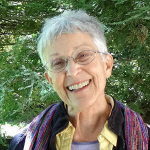 Judy Long is a palliative care chaplain with UCSF’s Symptom Management Service and UCSF’s Parkinson’s Disease Supportive Care Clinic. She provides interfaith spiritual care with a deep commitment to care for caregivers, both family members and clinicians, that grew out of her experience as a hospital and hospice chaplain, as well as facilitating grief and family caregiver support groups. As a chaplain and educator, she provides evidence-based training in balanced resilience to make caregiving sustainable and reduce burnout.
Judy is a certified senior teacher of Compassion Cultivation Training (CCT) through the Compassion Institute and CCARE at Stanford Medical School, a trained teacher of Mindful Self-Compassion and Mindfulness-Based Emotional Balance through the Center for Mindfulness at UCSD Health. She also teaches the G.R.A.C.E. protocol, developed by Roshi Joan Halifax, PhD, Upaya Institute, to train clinicians and caregivers in compassion and resilience, as well as UMass Medical Center’s Mindfulness-Based Stress Reduction (MBSR) program. Judy is a member of the San Francisco Palliative Care Task Force working group. You can reach Judy at judith.long@ucsf.edu, (415)734-0108.
Judy Long is a palliative care chaplain with UCSF’s Symptom Management Service and UCSF’s Parkinson’s Disease Supportive Care Clinic. She provides interfaith spiritual care with a deep commitment to care for caregivers, both family members and clinicians, that grew out of her experience as a hospital and hospice chaplain, as well as facilitating grief and family caregiver support groups. As a chaplain and educator, she provides evidence-based training in balanced resilience to make caregiving sustainable and reduce burnout.
Judy is a certified senior teacher of Compassion Cultivation Training (CCT) through the Compassion Institute and CCARE at Stanford Medical School, a trained teacher of Mindful Self-Compassion and Mindfulness-Based Emotional Balance through the Center for Mindfulness at UCSD Health. She also teaches the G.R.A.C.E. protocol, developed by Roshi Joan Halifax, PhD, Upaya Institute, to train clinicians and caregivers in compassion and resilience, as well as UMass Medical Center’s Mindfulness-Based Stress Reduction (MBSR) program. Judy is a member of the San Francisco Palliative Care Task Force working group. You can reach Judy at judith.long@ucsf.edu, (415)734-0108.
 Dawa has been a student of Tibetan Buddhism for over 35 years and completed the traditional Tibetan Buddhist three-year retreat under the guidance of Kalu Rinpoche in 1985. Her life’s objective is a seamless integration of Buddhist practice and ethics into daily life—balancing a contemplative retreat life with family and work. Following her retreat she moved to Hawaii where she co-directed the Paleaku Meditation Center and began working in social services. In 1992 while living in Hawaii, Dawa met the Dzogchen Master Chögyal Namkhai Norbu and began studying Vajra Dance and Dzogchen. In 1995 Dawa moved to the Bay Area to pursue a PhD while continuing to work in the field of social services for Alameda County, serving families and children impacted by abuse, neglect, and violence. Her doctoral research employed ethnographic methods to study identity transformation resulting from long-term mediation practice in three-year retreats. She currently serves on the board of directors of the Dzogchen Community West Coast. Dawa teaches CCT in the San Francisco Bay Area (2012 – 2015). She is currently compiling her research on three-year Tibetan Buddhist retreats into a book. She can be contacted via email or through her website, Practicing Compassion.
Dawa has been a student of Tibetan Buddhism for over 35 years and completed the traditional Tibetan Buddhist three-year retreat under the guidance of Kalu Rinpoche in 1985. Her life’s objective is a seamless integration of Buddhist practice and ethics into daily life—balancing a contemplative retreat life with family and work. Following her retreat she moved to Hawaii where she co-directed the Paleaku Meditation Center and began working in social services. In 1992 while living in Hawaii, Dawa met the Dzogchen Master Chögyal Namkhai Norbu and began studying Vajra Dance and Dzogchen. In 1995 Dawa moved to the Bay Area to pursue a PhD while continuing to work in the field of social services for Alameda County, serving families and children impacted by abuse, neglect, and violence. Her doctoral research employed ethnographic methods to study identity transformation resulting from long-term mediation practice in three-year retreats. She currently serves on the board of directors of the Dzogchen Community West Coast. Dawa teaches CCT in the San Francisco Bay Area (2012 – 2015). She is currently compiling her research on three-year Tibetan Buddhist retreats into a book. She can be contacted via email or through her website, Practicing Compassion.
 Nikki Mirghafori is a scientist and a dharma teacher. She has studied meditation on intensive silent retreats with well-known Western and Eastern Buddhist teachers. In 2008, she was authorized by her teacher, the renowned Burmese meditation master, Venerable Pa Auk Sayadaw to teach in the Theravada Buddhist lineage. In addition to Stanford CCT training, Nikki is also a UCLA-certified mindfulness facilitator. Invited by Jack Kornfield, she is part of the 2013-16 Spirit Rock/IMS/IMC teacher training, where she teaches silent retreats. Concurrent with her contemplative practice, Nikki is a senior research scientist at ICSI, an academic research institute affiliated with UC Berkeley, where she received her PhD in computer science. She has led research teams as the Principle Investigator, taught graduate-level courses at UC Berkeley, mentored post-docs and grad students, published over forty peer-reviewed scientific articles and patents, given talks at international conferences, and served as a consultant for Silicon Valley startups. For a list of her contemplative courses and retreats see her website.
Nikki Mirghafori is a scientist and a dharma teacher. She has studied meditation on intensive silent retreats with well-known Western and Eastern Buddhist teachers. In 2008, she was authorized by her teacher, the renowned Burmese meditation master, Venerable Pa Auk Sayadaw to teach in the Theravada Buddhist lineage. In addition to Stanford CCT training, Nikki is also a UCLA-certified mindfulness facilitator. Invited by Jack Kornfield, she is part of the 2013-16 Spirit Rock/IMS/IMC teacher training, where she teaches silent retreats. Concurrent with her contemplative practice, Nikki is a senior research scientist at ICSI, an academic research institute affiliated with UC Berkeley, where she received her PhD in computer science. She has led research teams as the Principle Investigator, taught graduate-level courses at UC Berkeley, mentored post-docs and grad students, published over forty peer-reviewed scientific articles and patents, given talks at international conferences, and served as a consultant for Silicon Valley startups. For a list of her contemplative courses and retreats see her website.
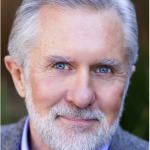 The greatest opportunities are found in the presence of the greatest needs. I know of no greater opportunity than using informed methods to enable people to grow their natural abilities to be kind and compassionate to each other; and themselves. I know the value of this learning from my own experience. Acts of compassion freely given to me made it possible for my life to become a journey towards self-compassion. The personal experience of self-compassion enabled transformative positive change within myself and in my relationships. This experience allows me to be an authentic witness for those who may doubt the value of this kind of experiential learning. Meditation first became an always-evolving part of my life forty-five years ago. My experience during that time has included a broad range of meditation and science-based trainings, seminars, retreats, and courses including professional training in Mindfulness-Based Stress Reduction (MBSR) Mind-Body Medicine. I have also experienced a transformative Recovery. It is an empowering gift to be certified as a teacher of the Compassion Cultivation Training (CCT) Program by CCARE in the Stanford University School of Medicine. My Intention is to honor that gift in the actions of my daily life. I am credentialed as an Associate Certified Coach (ACC) by the International Coach Federation (ICF) and certificated by the Core Strengths Coaching Program at San Francisco State University. My B.A. was in Behavior Sciences. My business background included being the founder of Suburban Equity Investments, Inc. and Cybernetic Electronic Commerce, LLC. It is a privilege and fulfilling joy to teach CCT and coach a limited number of clients in Silicon Valley. Please feel welcome to call or text me at 650-966-1166; or send an email to David@CompassionClasses.com.
The greatest opportunities are found in the presence of the greatest needs. I know of no greater opportunity than using informed methods to enable people to grow their natural abilities to be kind and compassionate to each other; and themselves. I know the value of this learning from my own experience. Acts of compassion freely given to me made it possible for my life to become a journey towards self-compassion. The personal experience of self-compassion enabled transformative positive change within myself and in my relationships. This experience allows me to be an authentic witness for those who may doubt the value of this kind of experiential learning. Meditation first became an always-evolving part of my life forty-five years ago. My experience during that time has included a broad range of meditation and science-based trainings, seminars, retreats, and courses including professional training in Mindfulness-Based Stress Reduction (MBSR) Mind-Body Medicine. I have also experienced a transformative Recovery. It is an empowering gift to be certified as a teacher of the Compassion Cultivation Training (CCT) Program by CCARE in the Stanford University School of Medicine. My Intention is to honor that gift in the actions of my daily life. I am credentialed as an Associate Certified Coach (ACC) by the International Coach Federation (ICF) and certificated by the Core Strengths Coaching Program at San Francisco State University. My B.A. was in Behavior Sciences. My business background included being the founder of Suburban Equity Investments, Inc. and Cybernetic Electronic Commerce, LLC. It is a privilege and fulfilling joy to teach CCT and coach a limited number of clients in Silicon Valley. Please feel welcome to call or text me at 650-966-1166; or send an email to David@CompassionClasses.com.
 Roy Remer has been an end-of-life caregiver and educator since 1997 when he trained with Zen Caregiving Project (formerly Zen Hospice Project) to become a volunteer caregiver. Roy served on the ZCP board of directors from 2002 until 2008. Following a career in book publishing, Roy assumed a leadership role at ZCP in 2010 and serves as the organization’s Executive Director. Roy teaches Mindful Caregiver Education courses internationally and facilitates grief support workshops and Open Death Conversations for ZCP. A dedicated practitioner of Soto Zen Buddhism, Roy is a student at the San Francisco Zen Center where he received lay ordination in 2018. He also guides wilderness-based rites of passage programs in partnership with EarthWays LLC of Sebastopol, CA. Please contact Roy by email.
Roy Remer has been an end-of-life caregiver and educator since 1997 when he trained with Zen Caregiving Project (formerly Zen Hospice Project) to become a volunteer caregiver. Roy served on the ZCP board of directors from 2002 until 2008. Following a career in book publishing, Roy assumed a leadership role at ZCP in 2010 and serves as the organization’s Executive Director. Roy teaches Mindful Caregiver Education courses internationally and facilitates grief support workshops and Open Death Conversations for ZCP. A dedicated practitioner of Soto Zen Buddhism, Roy is a student at the San Francisco Zen Center where he received lay ordination in 2018. He also guides wilderness-based rites of passage programs in partnership with EarthWays LLC of Sebastopol, CA. Please contact Roy by email.
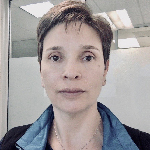 Sandra Sanabria was born and raised in Bogota, Colombia and holds a BS in Physics, an MS in Biomedical Engineering and a PhD in Biomedical Sciences. Life has been generous to her. She enjoys her family, friends and job, but life is never short of trials and tribulations: the day-to-day bores and disappointments, challenging situations and relationships, aging, the loss of loved ones, and more. Cultivation of mindfulness and insight meditation practice are at the base of her compassion practice. Becoming a meditation facilitator and a CCT teacher allows her to closely witness the wisdom and goodness in the hearts of people, a source of optimism and resilience in these difficult times. She deeply believes that the cultivation of compassion and kindness is essential for achieving profound and lasting joy, within ourselves, with others and in the world. Compassion can become a way to be in the world. She teaches in English and Spanish.
Sandra Sanabria was born and raised in Bogota, Colombia and holds a BS in Physics, an MS in Biomedical Engineering and a PhD in Biomedical Sciences. Life has been generous to her. She enjoys her family, friends and job, but life is never short of trials and tribulations: the day-to-day bores and disappointments, challenging situations and relationships, aging, the loss of loved ones, and more. Cultivation of mindfulness and insight meditation practice are at the base of her compassion practice. Becoming a meditation facilitator and a CCT teacher allows her to closely witness the wisdom and goodness in the hearts of people, a source of optimism and resilience in these difficult times. She deeply believes that the cultivation of compassion and kindness is essential for achieving profound and lasting joy, within ourselves, with others and in the world. Compassion can become a way to be in the world. She teaches in English and Spanish.
 Richard Cranch Scott has had a dedicated spiritual practice for more than 30 years, with an emphasis in Buddhism that includes study and long-term retreat practice with highly respected Asian and Western meditation teachers. He has also studied the Diamond Heart teachings. He has participated in and led Buddhist study groups, has given a number of dharma talks and has taught meditation. He completed the Spirit Rock Meditation Center’s multiyear Dedicated Practitioner’s Program and is currently enrolled in their multiyear Heavenly Messengers course which is training for service to those dealing with aging, illness and death. Formerly he served as President of the Board of Spirit Rock Meditation Center. He is a volunteer with Hospice By the Bay.
Richard Cranch Scott has had a dedicated spiritual practice for more than 30 years, with an emphasis in Buddhism that includes study and long-term retreat practice with highly respected Asian and Western meditation teachers. He has also studied the Diamond Heart teachings. He has participated in and led Buddhist study groups, has given a number of dharma talks and has taught meditation. He completed the Spirit Rock Meditation Center’s multiyear Dedicated Practitioner’s Program and is currently enrolled in their multiyear Heavenly Messengers course which is training for service to those dealing with aging, illness and death. Formerly he served as President of the Board of Spirit Rock Meditation Center. He is a volunteer with Hospice By the Bay.
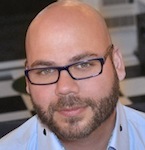 Matthew Skinta is a board-certified clinical health psychologist with a private practice in the Castro neighborhood of San Francisco. His past research has focused on the impact of shame and stigma on health and wellness, primarily among persons living with HIV/AIDS. Matthew earned his PhD in clinical health psychology from Kent State University in 2007 and completed a clinical post-doctoral fellowship in HIV Behavior Medicine at Harbor-UCLA Medical Center. After completing his training in the Los Angeles area, Matthew relocated to San Francisco, where he has spent five years as the manager of the Research Program at the UCSF Alliance Health Project. More recently, he has provided training and consultation in Acceptance & Commitment Therapy, Functional Analytic Psychotherapy, and compassion-based approaches. His work on stigma and shame has appeared in a number of peer-reviewed journals of health psychology and health education, as well as chapters on psychotherapy with persons living with chronic illness. Matthew has also practiced Zen Buddhism since 2005, and is a member of the Hartford St. Zen Center. For information about upcoming CCT classes, or to schedule a workshop or speaking engagement, please visit his website.
Back to top of page
Matthew Skinta is a board-certified clinical health psychologist with a private practice in the Castro neighborhood of San Francisco. His past research has focused on the impact of shame and stigma on health and wellness, primarily among persons living with HIV/AIDS. Matthew earned his PhD in clinical health psychology from Kent State University in 2007 and completed a clinical post-doctoral fellowship in HIV Behavior Medicine at Harbor-UCLA Medical Center. After completing his training in the Los Angeles area, Matthew relocated to San Francisco, where he has spent five years as the manager of the Research Program at the UCSF Alliance Health Project. More recently, he has provided training and consultation in Acceptance & Commitment Therapy, Functional Analytic Psychotherapy, and compassion-based approaches. His work on stigma and shame has appeared in a number of peer-reviewed journals of health psychology and health education, as well as chapters on psychotherapy with persons living with chronic illness. Matthew has also practiced Zen Buddhism since 2005, and is a member of the Hartford St. Zen Center. For information about upcoming CCT classes, or to schedule a workshop or speaking engagement, please visit his website.
Back to top of page
 Lineth Jezek is authorized through Stanford University’s Center for Compassion and Altruism Research and Education (CCARE) and the Compassion Institute to teach Compassion Cultivation Training – CCT. Born and raised in Costa Rica, she relocated to the United States in 2008 to continue her work in global business where she worked collaboratively in global organizations and delivered positive business results for many years. Now she works with similar organizations to help build their employees’ resiliency and support their physical and emotional well-being. Lineth is passionate about improving lives and community health through compassionate well-being. Lineth holds an MBA from Universidad Latina de Costa Rica and is the founder of Genuine Compassion, a company dedicated to providing Compassion Education and Mindfulness programs. She works with communities in the U.S. and Costa Rica, bringing the benefits of compassion training and meditation to a variety of organizations and people from different backgrounds, teaching in both English and Spanish. You may contact Lineth and learn about compassion training in Spanish on her websites.
Lineth Jezek is authorized through Stanford University’s Center for Compassion and Altruism Research and Education (CCARE) and the Compassion Institute to teach Compassion Cultivation Training – CCT. Born and raised in Costa Rica, she relocated to the United States in 2008 to continue her work in global business where she worked collaboratively in global organizations and delivered positive business results for many years. Now she works with similar organizations to help build their employees’ resiliency and support their physical and emotional well-being. Lineth is passionate about improving lives and community health through compassionate well-being. Lineth holds an MBA from Universidad Latina de Costa Rica and is the founder of Genuine Compassion, a company dedicated to providing Compassion Education and Mindfulness programs. She works with communities in the U.S. and Costa Rica, bringing the benefits of compassion training and meditation to a variety of organizations and people from different backgrounds, teaching in both English and Spanish. You may contact Lineth and learn about compassion training in Spanish on her websites.
 Priscilla is a board certified physician in Internal Medicine, Pulmonary and Sleep Medicine, certified teacher in Compassion Cultivation Training (CCT), Ananda Meditation, Hatha and Restorative Yoga, and teacher/facilitator in Mindfulness Based Stress Reduction. Priscilla has interests in the role of mindfulness, compassion, mindful movement, Yang Tai Chi, writing practice “Writing Down The Bones” by Natalie Goldberg, nature photography, and music in health, wellness, and healing.
Back to top of page
Priscilla is a board certified physician in Internal Medicine, Pulmonary and Sleep Medicine, certified teacher in Compassion Cultivation Training (CCT), Ananda Meditation, Hatha and Restorative Yoga, and teacher/facilitator in Mindfulness Based Stress Reduction. Priscilla has interests in the role of mindfulness, compassion, mindful movement, Yang Tai Chi, writing practice “Writing Down The Bones” by Natalie Goldberg, nature photography, and music in health, wellness, and healing.
Back to top of page
 Dent Gitchel is a faculty member at the University of Arkansas at Little Rock. His current research and teaching interests involve contemplative and self-reflective pedagogy, adjustment to disability, differential response patterns on self-report instruments, and the operationalization and measurement of compassion. Dent was a Walton Distinguished Doctoral Fellow at the University of Arkansas, receiving his PhD in Rehabilitation Research and Education in 2010. He also received Post-Master’s Certificates in Quantitative Research Methodology and Educational Assessment. He is quite passionate about data analysis, particularly item-analysis techniques and multivariate techniques. Prior to academic work, Dent worked for 10 years in Assertive Community Treatment (ACT) and Psychosocial Rehabilitation programs servicing individuals with severe and persistent mental illnesses. He has a strong interest in secular and scientific approaches to spirituality and human development. Dent discovered Buddhism through Dr. Jay McDaniel, at Hendrix College, in January 1991, and has been a student of Tibetan Buddhism since 1995. He met Geshe Thupten Dorjee in 2006 and encountered the Mind Training tradition of Atisha. Dent is a member of Christ Episcopal Church in Little Rock. For information about upcoming CCT classes, or to schedule a workshop or speaking engagement, please contact him by email.
Back to top of page
Dent Gitchel is a faculty member at the University of Arkansas at Little Rock. His current research and teaching interests involve contemplative and self-reflective pedagogy, adjustment to disability, differential response patterns on self-report instruments, and the operationalization and measurement of compassion. Dent was a Walton Distinguished Doctoral Fellow at the University of Arkansas, receiving his PhD in Rehabilitation Research and Education in 2010. He also received Post-Master’s Certificates in Quantitative Research Methodology and Educational Assessment. He is quite passionate about data analysis, particularly item-analysis techniques and multivariate techniques. Prior to academic work, Dent worked for 10 years in Assertive Community Treatment (ACT) and Psychosocial Rehabilitation programs servicing individuals with severe and persistent mental illnesses. He has a strong interest in secular and scientific approaches to spirituality and human development. Dent discovered Buddhism through Dr. Jay McDaniel, at Hendrix College, in January 1991, and has been a student of Tibetan Buddhism since 1995. He met Geshe Thupten Dorjee in 2006 and encountered the Mind Training tradition of Atisha. Dent is a member of Christ Episcopal Church in Little Rock. For information about upcoming CCT classes, or to schedule a workshop or speaking engagement, please contact him by email.
Back to top of page
 practices law and teaches CCT in the central mountains of Colorado and the Denver metro area. In almost two decades as a Child Welfare Attorney, she has represented children in divorce, post-divorce, and abuse and neglect cases throughout Colorado. She has served for many years on boards of various nonprofits dedicated to supporting early childhood education as well as victims of sexual assault and domestic violence. Mary Lou has particular interests in cultivating compassion in law schools and throughout the legal profession, making the course available in colleges and universities, bringing the course to children and families who have experienced traumatic events or circumstances, and employing CCT to prevent burnout and vicarious trauma. She received her BA from Stanford and a JD from the University of Denver. To learn more about Mary Lou’s programs and course offerings, please email her.
practices law and teaches CCT in the central mountains of Colorado and the Denver metro area. In almost two decades as a Child Welfare Attorney, she has represented children in divorce, post-divorce, and abuse and neglect cases throughout Colorado. She has served for many years on boards of various nonprofits dedicated to supporting early childhood education as well as victims of sexual assault and domestic violence. Mary Lou has particular interests in cultivating compassion in law schools and throughout the legal profession, making the course available in colleges and universities, bringing the course to children and families who have experienced traumatic events or circumstances, and employing CCT to prevent burnout and vicarious trauma. She received her BA from Stanford and a JD from the University of Denver. To learn more about Mary Lou’s programs and course offerings, please email her.
 Amanda D. Mahoney is a private practitioner in Colorado who has been dedicated to supporting grieving children and families for almost a decade. She has and continues to speak on the local and national level on the topic of children’s grief, teen grief, pet loss, compassion fatigue, and self-care. She has provided hospital-based, home-based, school-based, and office-based therapy to individuals, families, and children grieving the death of someone close. Amanda received her BA from Boston College and her MA in Clinical Psychology with an Emphasis in Marriage and Family Therapy from Pepperdine University. Amanda is co-founder of Grief Support of the Rockies and offers Compassion Cultivation Training in Fort Collins, Boulder, and Denver. For more details, visit her website.
Amanda D. Mahoney is a private practitioner in Colorado who has been dedicated to supporting grieving children and families for almost a decade. She has and continues to speak on the local and national level on the topic of children’s grief, teen grief, pet loss, compassion fatigue, and self-care. She has provided hospital-based, home-based, school-based, and office-based therapy to individuals, families, and children grieving the death of someone close. Amanda received her BA from Boston College and her MA in Clinical Psychology with an Emphasis in Marriage and Family Therapy from Pepperdine University. Amanda is co-founder of Grief Support of the Rockies and offers Compassion Cultivation Training in Fort Collins, Boulder, and Denver. For more details, visit her website.
 Tommy Lee Woon is the Director of Diversity and Inclusion at Naropa University. Previously, Tommy served in senior positions directing diversity programs and multicultural education at Oberlin College, Brown University, Dartmouth College, Macalester College, and most recently, at Stanford University. His teaching experience includes 9 years of teaching emotional self-care classes at the Stanford and Dartmouth Medical Schools. He is a board member of the Somatic Experiencing Trauma Institute, an organization with a global mission to prevent and heal trauma; a Somatic Experiencing Practitioner (SEP); and a training assistant for all three levels of SE training. Tommy works and lives during the week in Boulder, CO, and on weekends in Minneapolis, MN, and hopes to offer classes in both locations.
Back to top of page
Tommy Lee Woon is the Director of Diversity and Inclusion at Naropa University. Previously, Tommy served in senior positions directing diversity programs and multicultural education at Oberlin College, Brown University, Dartmouth College, Macalester College, and most recently, at Stanford University. His teaching experience includes 9 years of teaching emotional self-care classes at the Stanford and Dartmouth Medical Schools. He is a board member of the Somatic Experiencing Trauma Institute, an organization with a global mission to prevent and heal trauma; a Somatic Experiencing Practitioner (SEP); and a training assistant for all three levels of SE training. Tommy works and lives during the week in Boulder, CO, and on weekends in Minneapolis, MN, and hopes to offer classes in both locations.
Back to top of page
 Laura Banks is honored to be a Certified CCT Instructor and offer classes throughout the Washington DC metro area, including Northern Virginia, DC, and Maryland. While raising a family around the world, she has witnessed the power of compassion to transform suffering in a multitude of circumstances. She is inspired by and seeks to strengthen her own and others’ capacity to thrive and find meaning throughout life, especially through the cultivation of compassion. Laura’s joys include her family, their dog Harold, poetry, running and yoga, time with friends, and tasty food prepared and shared with others. To learn more, please visit her website or email her.
Laura Banks is honored to be a Certified CCT Instructor and offer classes throughout the Washington DC metro area, including Northern Virginia, DC, and Maryland. While raising a family around the world, she has witnessed the power of compassion to transform suffering in a multitude of circumstances. She is inspired by and seeks to strengthen her own and others’ capacity to thrive and find meaning throughout life, especially through the cultivation of compassion. Laura’s joys include her family, their dog Harold, poetry, running and yoga, time with friends, and tasty food prepared and shared with others. To learn more, please visit her website or email her.
 Brandel France de Bravo holds a Master’s in Public Health from Columbia University and is a graduate of Warren Wilson’s MFA Program for Writers. She has two decades of experience researching and designing health interventions in the U.S. and abroad. She has run an HIV prevention program in Africa, designed harm reduction strategies for intravenous drug users in Central Asia, and developed materials to help cancer patients in the U.S. make informed decisions about their treatment. She is co-author of a parenting book influenced by the RIE philosophy of infant-toddler care and is a published poet and essayist. She studied Compassion Cultivation Training with founding faculty while a fellow at Stanford University’s Distinguished Careers Institute. She is honored to be a certified teacher of CCT, offering in-person classes in Washington, D.C. and online classes to people around the world. To learn more, please visit her website or email her.
Back to top of page
Brandel France de Bravo holds a Master’s in Public Health from Columbia University and is a graduate of Warren Wilson’s MFA Program for Writers. She has two decades of experience researching and designing health interventions in the U.S. and abroad. She has run an HIV prevention program in Africa, designed harm reduction strategies for intravenous drug users in Central Asia, and developed materials to help cancer patients in the U.S. make informed decisions about their treatment. She is co-author of a parenting book influenced by the RIE philosophy of infant-toddler care and is a published poet and essayist. She studied Compassion Cultivation Training with founding faculty while a fellow at Stanford University’s Distinguished Careers Institute. She is honored to be a certified teacher of CCT, offering in-person classes in Washington, D.C. and online classes to people around the world. To learn more, please visit her website or email her.
Back to top of page
 Brett Cobb is Director of Compassionate Tampa Bay, launched in 2017 to provide compassion-focused training programs for residents, businesses and organizations of the Greater Tampa Bay region. As a public speaker and teacher offering CCT and Mindful Self-Compassion (having completed Teacher Training of The Center for Mindful Self-Compassion), Brett has been teaching meditation-based programs part-time for twelve years and has particular interest in offering programs for men and women experiencing high work stress; businesses and organizations seeking to bring greater well-being to their employees; health and wellness practitioners and caregivers; men of all backgrounds; and the LGBTQ community. Brett served for seven years, until 2015, on the senior management staff of Omega Institute for Holistic Studies, the country’s most trusted source of wellness and personal growth, located in Rhinebeck, NY. He is a member of the Board of Directors of the Yoga Service Council, working to make Mindfulness and yoga accessible to all nationwide; a member of the Writers’ Guild of America, East; the author of Toward Spirit and The Christ Within: Meditations on The Rose, The Web & The Tree of Life (2008), and previously served in senior roles with leading nonprofit organizations in New York, where he lived for 25 years, and Florida. Brett relocated to Saint Petersburg in 2016. To contact Brett, please visit CompassionateTampaBay.com.
Back to top of page
Brett Cobb is Director of Compassionate Tampa Bay, launched in 2017 to provide compassion-focused training programs for residents, businesses and organizations of the Greater Tampa Bay region. As a public speaker and teacher offering CCT and Mindful Self-Compassion (having completed Teacher Training of The Center for Mindful Self-Compassion), Brett has been teaching meditation-based programs part-time for twelve years and has particular interest in offering programs for men and women experiencing high work stress; businesses and organizations seeking to bring greater well-being to their employees; health and wellness practitioners and caregivers; men of all backgrounds; and the LGBTQ community. Brett served for seven years, until 2015, on the senior management staff of Omega Institute for Holistic Studies, the country’s most trusted source of wellness and personal growth, located in Rhinebeck, NY. He is a member of the Board of Directors of the Yoga Service Council, working to make Mindfulness and yoga accessible to all nationwide; a member of the Writers’ Guild of America, East; the author of Toward Spirit and The Christ Within: Meditations on The Rose, The Web & The Tree of Life (2008), and previously served in senior roles with leading nonprofit organizations in New York, where he lived for 25 years, and Florida. Brett relocated to Saint Petersburg in 2016. To contact Brett, please visit CompassionateTampaBay.com.
Back to top of page
 Hooria Jazaieri is a postdoctoral research fellow at the Kellogg School of Management at Northwestern University. Hooria’s research in the areas of mindfulness, compassion, emotion, and emotion regulation has been published in leading academic journals in the fields of management, psychology, psychiatry, and neuroscience. Hooria completed the Compassion Cultivation Training (CCT) Teacher Certification Program though Stanford University and is enthusiastic about teaching mindfulness and compassion in a variety of academic and corporate contexts. In addition to being a certified CCT teacher, Hooria is a certified teacher of Search Inside Yourself (SIY), a mindfulness-based emotional intelligence program developed at Google, and is also a licensed psychotherapist in the State of California. For information about upcoming CCT classes or to schedule a workshop or speaking engagement, please email her.
Hooria Jazaieri is a postdoctoral research fellow at the Kellogg School of Management at Northwestern University. Hooria’s research in the areas of mindfulness, compassion, emotion, and emotion regulation has been published in leading academic journals in the fields of management, psychology, psychiatry, and neuroscience. Hooria completed the Compassion Cultivation Training (CCT) Teacher Certification Program though Stanford University and is enthusiastic about teaching mindfulness and compassion in a variety of academic and corporate contexts. In addition to being a certified CCT teacher, Hooria is a certified teacher of Search Inside Yourself (SIY), a mindfulness-based emotional intelligence program developed at Google, and is also a licensed psychotherapist in the State of California. For information about upcoming CCT classes or to schedule a workshop or speaking engagement, please email her.
 Burrell has been actively involved in the community since he was 10 years old and today he brings experience as a U.S. Army Veteran and peace activist. On behalf of Compassion It and the Institute for Nonviolence, Burrell works with former gang members who are reintegrating into the social fabric and becoming change agents in the community. Burrell brings experience as a community organizer and workshop facilitator to Compassion Cultivation Training. Burrell is also a Nonviolence Trainer for the Institute for Nonviolence Chicago. Burrell is on the Emerging Leaders Board of Mikva Challenge and is the Director of Compassion It Chicago.
Back to top of page
Burrell has been actively involved in the community since he was 10 years old and today he brings experience as a U.S. Army Veteran and peace activist. On behalf of Compassion It and the Institute for Nonviolence, Burrell works with former gang members who are reintegrating into the social fabric and becoming change agents in the community. Burrell brings experience as a community organizer and workshop facilitator to Compassion Cultivation Training. Burrell is also a Nonviolence Trainer for the Institute for Nonviolence Chicago. Burrell is on the Emerging Leaders Board of Mikva Challenge and is the Director of Compassion It Chicago.
Back to top of page
 Lara Naughton is Director of CompassionNOLA. With more than twenty years teaching and facilitation experience, she has worked with students K-12 as well as adults, and has led workshops with individuals who have faced challenging circumstances, including homelessness, HIV/AIDS, wrongful conviction, incarceration, and torture. As a writer and documentarian, she also teaches personal narrative, and assists individuals who wish to tell their own stories. She is Chair of Creative Writing at New Orleans Center for Creative Arts, and is a certified Compassion Cultivation Trainer through the Center for Compassion and Altruism Research and Education (CCARE) at Stanford University.
Lara Naughton is Director of CompassionNOLA. With more than twenty years teaching and facilitation experience, she has worked with students K-12 as well as adults, and has led workshops with individuals who have faced challenging circumstances, including homelessness, HIV/AIDS, wrongful conviction, incarceration, and torture. As a writer and documentarian, she also teaches personal narrative, and assists individuals who wish to tell their own stories. She is Chair of Creative Writing at New Orleans Center for Creative Arts, and is a certified Compassion Cultivation Trainer through the Center for Compassion and Altruism Research and Education (CCARE) at Stanford University.
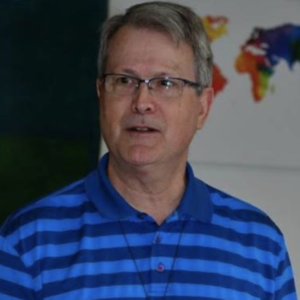 William Thiele is a certified teacher for CCT, founding director for The School for Contemplative Living, www.thescl.net, author of Monks in the World: Seeking God in a Frantic Culture and “A Contemplative Path” podcast on iTunes and blog on WordPress.com. He is adjunct professor for the Loyola University Institute for Ministry, a pastoral therapist and spiritual director in private practice, and leads retreats and workshops nationally. Dr. Thiele teaches CCT workshops and classes in New Orleans and in Nashville through the Vanderbilt University Divinity School. You may contact him by email.
Back to top of page
William Thiele is a certified teacher for CCT, founding director for The School for Contemplative Living, www.thescl.net, author of Monks in the World: Seeking God in a Frantic Culture and “A Contemplative Path” podcast on iTunes and blog on WordPress.com. He is adjunct professor for the Loyola University Institute for Ministry, a pastoral therapist and spiritual director in private practice, and leads retreats and workshops nationally. Dr. Thiele teaches CCT workshops and classes in New Orleans and in Nashville through the Vanderbilt University Divinity School. You may contact him by email.
Back to top of page
 Laura Banks is honored to be a Certified CCT Instructor and offer classes throughout the Washington DC metro area, including Northern Virginia, DC, and Maryland. While raising a family around the world, she has witnessed the power of compassion to transform suffering in a multitude of circumstances. She is inspired by and seeks to strengthen her own and others’ capacity to thrive and find meaning throughout life, especially through the cultivation of compassion. Laura’s joys include her family, their dog Harold, poetry, running and yoga, time with friends, and tasty food prepared and shared with others. To learn more, please visit her website or email her.
Back to top of page
Laura Banks is honored to be a Certified CCT Instructor and offer classes throughout the Washington DC metro area, including Northern Virginia, DC, and Maryland. While raising a family around the world, she has witnessed the power of compassion to transform suffering in a multitude of circumstances. She is inspired by and seeks to strengthen her own and others’ capacity to thrive and find meaning throughout life, especially through the cultivation of compassion. Laura’s joys include her family, their dog Harold, poetry, running and yoga, time with friends, and tasty food prepared and shared with others. To learn more, please visit her website or email her.
Back to top of page
 Karen Mott is an Oncology Nurse Navigator in Palliative Care at Dana-Farber Cancer Institute in Boston, MA. A former hospice nurse, now working in oncology for over a decade, Karen found yoga and meditation as a way to manage the stresses of caregiving and daily life. Now, she finds joy in bringing her certified compassion teaching skills to the wider world, and has personally experienced the benefits of mindfulness and compassion in her own life–increased resilience, greater self-compassion, and living with more joy. She has a special interest in working with health care providers, helping them cultivate the ability to access their innate compassion and increase their core resilience to promote health and well-being, and as an antidote to compassion fatigue and burnout. Karen completed the Compassion Cultivation Training (CCT) Teacher Certification Program through the Center for Compassion and Altruism Research and Education (CCARE) at Stanford University and the Compassion Institute in 2017. For information about upcoming CCT classes or to schedule a workshop please email her.
Back to top of page
Karen Mott is an Oncology Nurse Navigator in Palliative Care at Dana-Farber Cancer Institute in Boston, MA. A former hospice nurse, now working in oncology for over a decade, Karen found yoga and meditation as a way to manage the stresses of caregiving and daily life. Now, she finds joy in bringing her certified compassion teaching skills to the wider world, and has personally experienced the benefits of mindfulness and compassion in her own life–increased resilience, greater self-compassion, and living with more joy. She has a special interest in working with health care providers, helping them cultivate the ability to access their innate compassion and increase their core resilience to promote health and well-being, and as an antidote to compassion fatigue and burnout. Karen completed the Compassion Cultivation Training (CCT) Teacher Certification Program through the Center for Compassion and Altruism Research and Education (CCARE) at Stanford University and the Compassion Institute in 2017. For information about upcoming CCT classes or to schedule a workshop please email her.
Back to top of page
 Tommy Lee Woon is the Director of Diversity and Inclusion at Naropa University. Previously, Tommy served in senior positions directing diversity programs and multicultural education at Oberlin College, Brown University, Dartmouth College, Macalester College, and most recently, at Stanford University. His teaching experience includes 9 years of teaching emotional self-care classes at the Stanford and Dartmouth Medical Schools. He is a board member of the Somatic Experiencing Trauma Institute, an organization with a global mission to prevent and heal trauma; a Somatic Experiencing Practitioner (SEP); and a training assistant for all three levels of SE training. Tommy works and lives during the week in Boulder, CO, and on weekends in Minneapolis, MN, and hopes to offer classes in both locations.
Back to top of page
Tommy Lee Woon is the Director of Diversity and Inclusion at Naropa University. Previously, Tommy served in senior positions directing diversity programs and multicultural education at Oberlin College, Brown University, Dartmouth College, Macalester College, and most recently, at Stanford University. His teaching experience includes 9 years of teaching emotional self-care classes at the Stanford and Dartmouth Medical Schools. He is a board member of the Somatic Experiencing Trauma Institute, an organization with a global mission to prevent and heal trauma; a Somatic Experiencing Practitioner (SEP); and a training assistant for all three levels of SE training. Tommy works and lives during the week in Boulder, CO, and on weekends in Minneapolis, MN, and hopes to offer classes in both locations.
Back to top of page
 L. Lewis Wall is the Selina Okin Kim Conner Professor in Arts and Sciences for Medical Anthropology at Washington University in St. Louis. He is Professor of Anthropology in the College of Arts and Sciences and Professor of Obstetrics and Gynecology in the School of Medicine. He has extensive experience with women’s healthcare issues in sub-Saharan Africa, and has been involved in numerous charitable and philanthropic activities there for over 20 years. He is the founder of The Worldwide Fistula Fund, a not-for-profit charity devoted to helping African women with childbirth injuries. He also serves as the President of Hamlin Fistula USA, the charitable trust supporting the work of Hamlin Fistula Ethiopia and the Addis Ababa Fistula Hospital. Along with his wife, Helen, he founded Dignity Period, a charitable organization that provides menstrual hygiene supplies to adolescent Ethiopian girls to help them stay in school. He is currently developing a course on “The Anthropology of Compassion” and has taught Compassion Cultivation Training through the Brown School of Social Work at Washington University. He can be reached via email.
Back to top of page
L. Lewis Wall is the Selina Okin Kim Conner Professor in Arts and Sciences for Medical Anthropology at Washington University in St. Louis. He is Professor of Anthropology in the College of Arts and Sciences and Professor of Obstetrics and Gynecology in the School of Medicine. He has extensive experience with women’s healthcare issues in sub-Saharan Africa, and has been involved in numerous charitable and philanthropic activities there for over 20 years. He is the founder of The Worldwide Fistula Fund, a not-for-profit charity devoted to helping African women with childbirth injuries. He also serves as the President of Hamlin Fistula USA, the charitable trust supporting the work of Hamlin Fistula Ethiopia and the Addis Ababa Fistula Hospital. Along with his wife, Helen, he founded Dignity Period, a charitable organization that provides menstrual hygiene supplies to adolescent Ethiopian girls to help them stay in school. He is currently developing a course on “The Anthropology of Compassion” and has taught Compassion Cultivation Training through the Brown School of Social Work at Washington University. He can be reached via email.
Back to top of page
 Renee Murphy is a certified Standford Cultivating Compassion Training (CCT) instructor and a graduate of the IDP Meditation Teacher Training program. She studies American and Tibetan Buddhism with a focus on compassion practice and teaches CCT classes in NYC and in Boston, MA. For more information visit her website.
Back to top of page
Renee Murphy is a certified Standford Cultivating Compassion Training (CCT) instructor and a graduate of the IDP Meditation Teacher Training program. She studies American and Tibetan Buddhism with a focus on compassion practice and teaches CCT classes in NYC and in Boston, MA. For more information visit her website.
Back to top of page
 Bornali is a licensed psychologist with a psychotherapy practice in New York focused on compassion and mindfulness based approaches to cultivating joy. She is an adjunct assistant professor for the clinical psychology program at Columbia University, Teachers College. She received her B.A. from Mount Holyoke College, her MA from Columbia University, and her PhD in clinical psychology from the Derner Institute at Adelphi University. She completed her internship and a post-doctoral fellowship in cardiac psychology at the NYU School of Medicine. Previously, she was on the clinical faculty at the NYU School of Medicine, and was a senior staff psychologist at Bellevue Hospital where she founded, and was the Director of the Mind-Body Program. As a certified instructor of CCT, Bornali looks forward to helping healthcare professionals and students develop resilience and wellbeing through compassion. For information about upcoming CCT classes or to contact Bornali, please visit her website.
Bornali is a licensed psychologist with a psychotherapy practice in New York focused on compassion and mindfulness based approaches to cultivating joy. She is an adjunct assistant professor for the clinical psychology program at Columbia University, Teachers College. She received her B.A. from Mount Holyoke College, her MA from Columbia University, and her PhD in clinical psychology from the Derner Institute at Adelphi University. She completed her internship and a post-doctoral fellowship in cardiac psychology at the NYU School of Medicine. Previously, she was on the clinical faculty at the NYU School of Medicine, and was a senior staff psychologist at Bellevue Hospital where she founded, and was the Director of the Mind-Body Program. As a certified instructor of CCT, Bornali looks forward to helping healthcare professionals and students develop resilience and wellbeing through compassion. For information about upcoming CCT classes or to contact Bornali, please visit her website.
 Jane Chun is passionate about the intersection of compassionate states of being and social and systems change, and deepening our understanding of how this nexus can magnify positive social impact. She has worked with intergovernmental and nonprofit organizations including UNICEF, UNDP, IOM, and Search for Common Ground, and has conducted research for institutions such as The Brookings Institution, Oxford Refugee Studies Center, and Viet Nam Ministry of Agriculture and Rural Development on topics ranging from climate and environmental change, human ecology, migration and displacement, sustainable development, and decision sciences. Jane holds a DPhil from the University of Oxford where her research investigated these areas. She has actively contributed to global conversations and the development of international frameworks protecting vulnerable and displaced people in the context of climate change and disasters. She also holds an MA from American University in International Peace and Conflict Resolution. In a prior life, Jane was a classical pianist and holds an MM from Indiana University where she studied with Menahem Pressler. She offers a cross-disciplinary perspective and approach in her work, and is committed to co-creating change together with organizations and individuals so that we can move toward a present and future we want, for ourselves and for the planet.
Jane Chun is passionate about the intersection of compassionate states of being and social and systems change, and deepening our understanding of how this nexus can magnify positive social impact. She has worked with intergovernmental and nonprofit organizations including UNICEF, UNDP, IOM, and Search for Common Ground, and has conducted research for institutions such as The Brookings Institution, Oxford Refugee Studies Center, and Viet Nam Ministry of Agriculture and Rural Development on topics ranging from climate and environmental change, human ecology, migration and displacement, sustainable development, and decision sciences. Jane holds a DPhil from the University of Oxford where her research investigated these areas. She has actively contributed to global conversations and the development of international frameworks protecting vulnerable and displaced people in the context of climate change and disasters. She also holds an MA from American University in International Peace and Conflict Resolution. In a prior life, Jane was a classical pianist and holds an MM from Indiana University where she studied with Menahem Pressler. She offers a cross-disciplinary perspective and approach in her work, and is committed to co-creating change together with organizations and individuals so that we can move toward a present and future we want, for ourselves and for the planet.
 Elizabeth Pyjov is currently teaching Compassion Cultivation Training at Columbia University to graduate students and faculty, as well as to the general public at the renowned Tibet House in New York City. She has taught workshops about compassion at Columbia, NYU, Tibet House, and the Harvard Club of New York, where she leads a special-interest group about compassion. Elizabeth was born in Moscow, Russia, and grew up in the San Francisco Bay Area. She graduated from Harvard magna cum laude, with a degree in Romance Languages and Literatures and the Classics. She has worked for Global Justice in New York City, for Italian television at RAI International in Rome, at the United Nations in Geneva, and at the Stanford Center for Compassion and Altruism Research and Education at Stanford, CA. Elizabeth is fluent in Russian, French, Italian, Spanish, and English. She has traveled around the world and has worked or studied in Argentina, Italy, France, Peru, Switzerland, and Russia. Her international experience has led her to understand that among those of various traditions, customs, and religions, people still find happiness in many of the same ways. They want to be healthy, do meaningful work, and be close to their loved ones, and what is truly helpful is kindness, a caring attitude, and compassion. Elizabeth studied the neuroscience, philosophy, and pedagogy of compassion at Stanford Medical School while working for CCARE. She is currently the Editor-in-Chief of Stanford’s Compassion Journal. To learn more or to bring the Stanford compassion curriculum to your university, community, or business, you can contact her by email.
Back to top of page
Elizabeth Pyjov is currently teaching Compassion Cultivation Training at Columbia University to graduate students and faculty, as well as to the general public at the renowned Tibet House in New York City. She has taught workshops about compassion at Columbia, NYU, Tibet House, and the Harvard Club of New York, where she leads a special-interest group about compassion. Elizabeth was born in Moscow, Russia, and grew up in the San Francisco Bay Area. She graduated from Harvard magna cum laude, with a degree in Romance Languages and Literatures and the Classics. She has worked for Global Justice in New York City, for Italian television at RAI International in Rome, at the United Nations in Geneva, and at the Stanford Center for Compassion and Altruism Research and Education at Stanford, CA. Elizabeth is fluent in Russian, French, Italian, Spanish, and English. She has traveled around the world and has worked or studied in Argentina, Italy, France, Peru, Switzerland, and Russia. Her international experience has led her to understand that among those of various traditions, customs, and religions, people still find happiness in many of the same ways. They want to be healthy, do meaningful work, and be close to their loved ones, and what is truly helpful is kindness, a caring attitude, and compassion. Elizabeth studied the neuroscience, philosophy, and pedagogy of compassion at Stanford Medical School while working for CCARE. She is currently the Editor-in-Chief of Stanford’s Compassion Journal. To learn more or to bring the Stanford compassion curriculum to your university, community, or business, you can contact her by email.
Back to top of page
 Britta Eskey co-founded COR in 1977. She has been working internationally with people from all walks of life for over 35 years, with a background in social work, family and couple’s therapy, Family Constellation Work, Gestalt Therapy, dance, movement, emotional release, and life coaching. She co-developed and teaches all the workshops and trainings offered at COR and facilitates COR’s Leadership Development and Advanced Leadership and Facilitation Training. Britta is certified as a Compassion Cultivation Training instructor through CCARE at Stanford University and the Compassion Institute and she serves on the Board of Directors of the COR Community Foundation, which brings COR’s work to the underprivileged as well as to young people.
Britta Eskey co-founded COR in 1977. She has been working internationally with people from all walks of life for over 35 years, with a background in social work, family and couple’s therapy, Family Constellation Work, Gestalt Therapy, dance, movement, emotional release, and life coaching. She co-developed and teaches all the workshops and trainings offered at COR and facilitates COR’s Leadership Development and Advanced Leadership and Facilitation Training. Britta is certified as a Compassion Cultivation Training instructor through CCARE at Stanford University and the Compassion Institute and she serves on the Board of Directors of the COR Community Foundation, which brings COR’s work to the underprivileged as well as to young people.
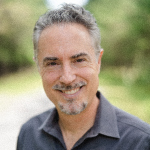 Lee Eskey, along with his wife Britta, is the co-founder and co-drector of COR. He has facilitated personal growth work with the Mankind Project (MKP) and with COR for more than 20 years. He is certified in Family Constellations and is a facilitator of Non-Violent Communication. Lee is the lead male facilitator for the Radiant Woman and Noble Man Weekends and facilitates COR’s leadership and advanced leadership training. He is a founding board member of the Non-profit COR Community Foundation which brings the work of emotional growth and healing to the underprivileged as well as to young people in middle and high school. Lee is also an adjunct professor at John Paul the Great Catholic University in Escondido, CA, where he teaches Mindfulness, Compassion Cultivation, as well as Acting, Voice & Speech, and Playing Shakespeare. He worked as an actor in television, on stage, and in film across the United States. It is as an actor that Lee discovered the value of a somatic approach to emotional growth and healing. That methodology is a founding principle which informs much of his teaching and facilitation.
Lee Eskey, along with his wife Britta, is the co-founder and co-drector of COR. He has facilitated personal growth work with the Mankind Project (MKP) and with COR for more than 20 years. He is certified in Family Constellations and is a facilitator of Non-Violent Communication. Lee is the lead male facilitator for the Radiant Woman and Noble Man Weekends and facilitates COR’s leadership and advanced leadership training. He is a founding board member of the Non-profit COR Community Foundation which brings the work of emotional growth and healing to the underprivileged as well as to young people in middle and high school. Lee is also an adjunct professor at John Paul the Great Catholic University in Escondido, CA, where he teaches Mindfulness, Compassion Cultivation, as well as Acting, Voice & Speech, and Playing Shakespeare. He worked as an actor in television, on stage, and in film across the United States. It is as an actor that Lee discovered the value of a somatic approach to emotional growth and healing. That methodology is a founding principle which informs much of his teaching and facilitation.
 A former Buddhist nun in the Tibetan tradition, Robin Hart completed the Compassion Cultivation Training (CCT) in 2014. Robin has worked for over a decade as a Programs Director for EngAge, a nonprofit organization devoted to life-enhancing programs for senior citizens living in independent living housing communities. Robin has recently relocated to the Triangle region of North Carolina and can be contacted by email for speaking engagements or to schedule a workshop.
Back to top of page
A former Buddhist nun in the Tibetan tradition, Robin Hart completed the Compassion Cultivation Training (CCT) in 2014. Robin has worked for over a decade as a Programs Director for EngAge, a nonprofit organization devoted to life-enhancing programs for senior citizens living in independent living housing communities. Robin has recently relocated to the Triangle region of North Carolina and can be contacted by email for speaking engagements or to schedule a workshop.
Back to top of page
 Adam Burn is a proud veteran of the United States Air Force who holds a master’s degree in Clinical Psychology. While engaged in graduate studies, Adam became fascinated with research into the neuro-scientific bases of contemplative practices as empirically demonstrated avenues toward wellbeing for persons suffering from trauma, depression, anxiety, and burnout. He has served in patient support capacities in neuropsychological assessment and therapeutic services at Mayo Clinic, Stanford University Medical Center, community-based mental health agencies, private psychology practices, and in detention centers. Adam’s current interests involve exploration into the nature of cultural implications underlying alternative treatment methodologies for veterans in need. He has found compassion meditation practice to be a deeply empowering vehicle through which resilience and thriving can be achieved in the face of life’s inevitable challenges. For more details, visit his website, Be Compassion.
Adam Burn is a proud veteran of the United States Air Force who holds a master’s degree in Clinical Psychology. While engaged in graduate studies, Adam became fascinated with research into the neuro-scientific bases of contemplative practices as empirically demonstrated avenues toward wellbeing for persons suffering from trauma, depression, anxiety, and burnout. He has served in patient support capacities in neuropsychological assessment and therapeutic services at Mayo Clinic, Stanford University Medical Center, community-based mental health agencies, private psychology practices, and in detention centers. Adam’s current interests involve exploration into the nature of cultural implications underlying alternative treatment methodologies for veterans in need. He has found compassion meditation practice to be a deeply empowering vehicle through which resilience and thriving can be achieved in the face of life’s inevitable challenges. For more details, visit his website, Be Compassion.
 Dawn-Starr Crowther is the owner and founder of Jade River Healing Arts Center, an integrative medicine clinic in Portland, Oregon. She practices Oriental Medicine and Acupuncture, and particularly enjoys working with people with chronic and/or severe illness, autoimmune conditions, cancer, chronic pain, those recovering from trauma, and at end of life. She finds compassion practices, coupled with mindfulness, a joyful and deeply enriching way to serve her patients. In addition to her private practice, she leads medical service trips to Fiji and the South Pacific to bring Oriental Medicine to under-served populations. She also participates in developing the Mindful Medicine program for physicians at Providence Medical Center, Portland. She has practiced meditation in the Tibetan Buddhist tradition for more than 20 years, studying in the Nyingma non-sectarian and Kagyu lineages. She is a Meditation Teacher with the Foundation for Active Compassion, and has led regular meditation groups in Portland, Oregon, since 1997. Since her first introduction to compassion practices in 2001 at a retreat shortly after 9/11 — when Lama John Makransky stressed the necessity of bringing compassion practices forward in the world — the heart-practices of compassion and loving-kindness have been her main practice and refuge. Her completion of the Stanford CCT Teacher Certification Program in 2013 has been an important milestone in manifesting her dedication to the integration of compassion practices for self and others more fully into the training, practice, and business of medicine. She teaches CCT in Portland, the greater Northwest, and other areas in the United States and abroad. For more information about her teaching, please visit her website or email her.
Dawn-Starr Crowther is the owner and founder of Jade River Healing Arts Center, an integrative medicine clinic in Portland, Oregon. She practices Oriental Medicine and Acupuncture, and particularly enjoys working with people with chronic and/or severe illness, autoimmune conditions, cancer, chronic pain, those recovering from trauma, and at end of life. She finds compassion practices, coupled with mindfulness, a joyful and deeply enriching way to serve her patients. In addition to her private practice, she leads medical service trips to Fiji and the South Pacific to bring Oriental Medicine to under-served populations. She also participates in developing the Mindful Medicine program for physicians at Providence Medical Center, Portland. She has practiced meditation in the Tibetan Buddhist tradition for more than 20 years, studying in the Nyingma non-sectarian and Kagyu lineages. She is a Meditation Teacher with the Foundation for Active Compassion, and has led regular meditation groups in Portland, Oregon, since 1997. Since her first introduction to compassion practices in 2001 at a retreat shortly after 9/11 — when Lama John Makransky stressed the necessity of bringing compassion practices forward in the world — the heart-practices of compassion and loving-kindness have been her main practice and refuge. Her completion of the Stanford CCT Teacher Certification Program in 2013 has been an important milestone in manifesting her dedication to the integration of compassion practices for self and others more fully into the training, practice, and business of medicine. She teaches CCT in Portland, the greater Northwest, and other areas in the United States and abroad. For more information about her teaching, please visit her website or email her.
 Lisa Emmerich teaches Compassion Cultivation Training courses in the Vancouver, Washington and Portland, Oregon metro areas. She is a high school principal in the Evergreen School District and specializes in working with educators including teachers, administrators, and para-professionals. She received a BA in Journalism from the University of Oregon, a Masters of Arts in Teaching from Western Oregon University, and her educational leadership credentials from the University of Oregon. For more information about Lisa and CCT in the Portland-Vancouver area, please visit her website, Journeys to Compassion or email her.
Lisa Emmerich teaches Compassion Cultivation Training courses in the Vancouver, Washington and Portland, Oregon metro areas. She is a high school principal in the Evergreen School District and specializes in working with educators including teachers, administrators, and para-professionals. She received a BA in Journalism from the University of Oregon, a Masters of Arts in Teaching from Western Oregon University, and her educational leadership credentials from the University of Oregon. For more information about Lisa and CCT in the Portland-Vancouver area, please visit her website, Journeys to Compassion or email her.
 Celedra Gildea is the founder of Portland Center for Compassion where she offers Compassion Cultivation Training, Mindful Self-Compassion training, and meditation groups. Celedra has been a practicing psychotherapist for 20+ years focusing on the many skills of depth therapy from years of advanced trainings. She spent a decade learning from the hundreds of men and women she had the privilege of being with through hospice work which was further informed through her dedication as a student of meditation for over 30 years with teachers in the Tibetan and Vipassana traditions. In 2007, Celedra’s spiritual connection to Tibetan Buddhism led her to a rural mountaintop in Eastern Tibet where she started a nonprofit for the Nangchen Nuns – an experience that continues to be transformative. “To study and teach compassion is both a privilege and a blessing that I never take for granted.” She can be reached via email.
Celedra Gildea is the founder of Portland Center for Compassion where she offers Compassion Cultivation Training, Mindful Self-Compassion training, and meditation groups. Celedra has been a practicing psychotherapist for 20+ years focusing on the many skills of depth therapy from years of advanced trainings. She spent a decade learning from the hundreds of men and women she had the privilege of being with through hospice work which was further informed through her dedication as a student of meditation for over 30 years with teachers in the Tibetan and Vipassana traditions. In 2007, Celedra’s spiritual connection to Tibetan Buddhism led her to a rural mountaintop in Eastern Tibet where she started a nonprofit for the Nangchen Nuns – an experience that continues to be transformative. “To study and teach compassion is both a privilege and a blessing that I never take for granted.” She can be reached via email.
 Aly Waibel specializes in lifelong learning, professional development, somatic learning, and contemplative education. She has taught mindfulness and compassion courses and workshops since 2012 and is a Senior Certified Teacher of the Compassion Cultivation Training course developed at Stanford University. Aly received her PhD in Teaching, Learning and Sociocultural Studies at the University of Arizona College of Education. She has held nonprofit leadership roles since 2015 and is currently the Associate Executive Director of Professional Training and Operations at the Center for Mindful Self-Compassion. Aly founded the nonprofit organization Compassion Education Alliance (CEA), a global collective that offers courses and support to compassion practitioners, educators and social change agents. For more information please visit the CEA website.
Aly Waibel specializes in lifelong learning, professional development, somatic learning, and contemplative education. She has taught mindfulness and compassion courses and workshops since 2012 and is a Senior Certified Teacher of the Compassion Cultivation Training course developed at Stanford University. Aly received her PhD in Teaching, Learning and Sociocultural Studies at the University of Arizona College of Education. She has held nonprofit leadership roles since 2015 and is currently the Associate Executive Director of Professional Training and Operations at the Center for Mindful Self-Compassion. Aly founded the nonprofit organization Compassion Education Alliance (CEA), a global collective that offers courses and support to compassion practitioners, educators and social change agents. For more information please visit the CEA website.
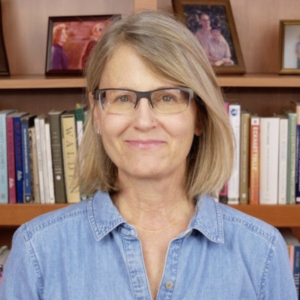 Sara Owens Woodard, PhD is a psychologist, teacher, and consultant. She lives in rural Oregon and teaches CCT in Portland, OR and McMinnville, OR. In addition to teaching CCT, Sara teaches individuals and groups to develop three main capacities: emotional regulation, healthy, collaborative relationships, and personal strength and resilience. She also provides reflective supervision and consultation to Head Start organizations and mental health organizations in Oregon. Sara has extensive training and passion for cultivating Infant Mental Health and Wellness. This is the practice of supporting the development of healthy, secure attachment relationships between infants and young children and their caregivers. This process is particularly difficult in the face of socio-economic barriers, multiple inequities and complex trauma. She specializes in the clinical application of attachment theory. Sara experienced burn-out and secondary trauma as a young psychologist working with very young and deeply traumatized infants and children. This was the impetus for her to begin a formal and sustained meditation practice 32 years ago. Sara really began her journey towards health and resilience over 30 years ago when she asked the question “How can I do the work I love and also be healthy and have good relationships?” She feels a strong connection to people working in the caregiving and first responder professions who are also prone to burn-out and secondary trauma. Sara has seen CCT and other compassion and self-compassion training help people in these communities recover from burn-out and develop resilience. She can be reached via email.
Back to top of page
Sara Owens Woodard, PhD is a psychologist, teacher, and consultant. She lives in rural Oregon and teaches CCT in Portland, OR and McMinnville, OR. In addition to teaching CCT, Sara teaches individuals and groups to develop three main capacities: emotional regulation, healthy, collaborative relationships, and personal strength and resilience. She also provides reflective supervision and consultation to Head Start organizations and mental health organizations in Oregon. Sara has extensive training and passion for cultivating Infant Mental Health and Wellness. This is the practice of supporting the development of healthy, secure attachment relationships between infants and young children and their caregivers. This process is particularly difficult in the face of socio-economic barriers, multiple inequities and complex trauma. She specializes in the clinical application of attachment theory. Sara experienced burn-out and secondary trauma as a young psychologist working with very young and deeply traumatized infants and children. This was the impetus for her to begin a formal and sustained meditation practice 32 years ago. Sara really began her journey towards health and resilience over 30 years ago when she asked the question “How can I do the work I love and also be healthy and have good relationships?” She feels a strong connection to people working in the caregiving and first responder professions who are also prone to burn-out and secondary trauma. Sara has seen CCT and other compassion and self-compassion training help people in these communities recover from burn-out and develop resilience. She can be reached via email.
Back to top of page
 Mary Bit Smith is a meditation instructor and a medical student in Philadelphia, PA. She has practiced meditation for the past 10 years and finds deep joy in sharing compassion-based practices with others. Before pursuing medicine, she earned her masters in Narrative Medicine from Columbia University and has a masters in applied Positive Psychology from the University of Pennsylvania. She currently teaches meditation within her medical school community and looks forward to continuing to offer CCT in the Philadelphia area. She can be reached via email.
Back to top of page
Mary Bit Smith is a meditation instructor and a medical student in Philadelphia, PA. She has practiced meditation for the past 10 years and finds deep joy in sharing compassion-based practices with others. Before pursuing medicine, she earned her masters in Narrative Medicine from Columbia University and has a masters in applied Positive Psychology from the University of Pennsylvania. She currently teaches meditation within her medical school community and looks forward to continuing to offer CCT in the Philadelphia area. She can be reached via email.
Back to top of page
 William Thiele is a certified teacher for CCT, founding director for The School for Contemplative Living, www.thescl.net, author of Monks in the World: Seeking God in a Frantic Culture and “A Contemplative Path” podcast on iTunes and blog on WordPress.com. He is adjunct professor for the Loyola University Institute for Ministry, a pastoral therapist and spiritual director in private practice, and leads retreats and workshops nationally. Dr. Thiele teaches CCT workshops and classes in New Orleans and in Nashville through the Vanderbilt University Divinity School. You may contact him by email.
Back to top of page
William Thiele is a certified teacher for CCT, founding director for The School for Contemplative Living, www.thescl.net, author of Monks in the World: Seeking God in a Frantic Culture and “A Contemplative Path” podcast on iTunes and blog on WordPress.com. He is adjunct professor for the Loyola University Institute for Ministry, a pastoral therapist and spiritual director in private practice, and leads retreats and workshops nationally. Dr. Thiele teaches CCT workshops and classes in New Orleans and in Nashville through the Vanderbilt University Divinity School. You may contact him by email.
Back to top of page
 Amy Anthony is a clinical psychologist who teaches CCT to both Veterans and staff at the VA North Texas Healthcare System. Teaching CCT offers a way to help staff connect with each other, experience personal growth, and better meet the challenges of caring for Veterans at a large medical center. In her work with Veterans, she has found CCT to be a powerful intervention to address depression, anxiety, PTSD, and a variety of problems in living related to undeveloped self-compassion, interpersonal alienation, loss of meaning, and fearfulness. Amy is also involved to a lesser degree in teaching CCT in the community as a pathway to rejuvenation and developing compassion for oneself and others. Additionally, she teaches mindfulness skills classes to staff and Veterans, and is involved in several meditation groups in the community. Amy has been practicing zazen meditation with the Maria Kannon Zen Center since 1998. She lives and works in Dallas, TX. To contact her regarding professional issues, please use her work e-mail. For social contacts, please use her personal e-mail.
Back to top of page
Amy Anthony is a clinical psychologist who teaches CCT to both Veterans and staff at the VA North Texas Healthcare System. Teaching CCT offers a way to help staff connect with each other, experience personal growth, and better meet the challenges of caring for Veterans at a large medical center. In her work with Veterans, she has found CCT to be a powerful intervention to address depression, anxiety, PTSD, and a variety of problems in living related to undeveloped self-compassion, interpersonal alienation, loss of meaning, and fearfulness. Amy is also involved to a lesser degree in teaching CCT in the community as a pathway to rejuvenation and developing compassion for oneself and others. Additionally, she teaches mindfulness skills classes to staff and Veterans, and is involved in several meditation groups in the community. Amy has been practicing zazen meditation with the Maria Kannon Zen Center since 1998. She lives and works in Dallas, TX. To contact her regarding professional issues, please use her work e-mail. For social contacts, please use her personal e-mail.
Back to top of page
 Christelle Estrada is the English Education Specialist at the Utah State Office of Education and the President and CEO of an education nonprofit, EON (Education Opportunity Now). Christelle received her doctorate in Education and Religion from Claremont University (1993) after graduate studies in psychological sciences, comparative religion, and process philosophy. She was previously the Chief Academic Officer for Stanford New Schools at Stanford University. She was an Urban Senior Research Fellow at Brown University and an Eisenhower Citizen Ambassador with the University of Rutgers’ delegation to China. She has presented papers on organizational collaboration and learner diversity in urban settings as a member of the Oxford Roundtable at Lincoln College in Oxford, UK, and as a participant in the International Whitehead Conference at the University of Salzburg, Austria. She was the recipient of the 2013 Inaugural Jane Vella Dialogue Education Award. Christelle’s research interests are grounded in her interdisciplinary background in the contemplative wisdom traditions, socio-cultural ethics, and the emerging field of affective neuroscience as it applies to policy studies and project development, specifically in low-income communities. Christelle teaches the Compassion Cultivation Training in the fall and spring of each year in Salt Lake City. Her most recent writing, presented at the 2014 Bounds of Ethics Conference in Bangalore, India, is published on the Cultivating Compassionate Wisdom website.
Christelle Estrada is the English Education Specialist at the Utah State Office of Education and the President and CEO of an education nonprofit, EON (Education Opportunity Now). Christelle received her doctorate in Education and Religion from Claremont University (1993) after graduate studies in psychological sciences, comparative religion, and process philosophy. She was previously the Chief Academic Officer for Stanford New Schools at Stanford University. She was an Urban Senior Research Fellow at Brown University and an Eisenhower Citizen Ambassador with the University of Rutgers’ delegation to China. She has presented papers on organizational collaboration and learner diversity in urban settings as a member of the Oxford Roundtable at Lincoln College in Oxford, UK, and as a participant in the International Whitehead Conference at the University of Salzburg, Austria. She was the recipient of the 2013 Inaugural Jane Vella Dialogue Education Award. Christelle’s research interests are grounded in her interdisciplinary background in the contemplative wisdom traditions, socio-cultural ethics, and the emerging field of affective neuroscience as it applies to policy studies and project development, specifically in low-income communities. Christelle teaches the Compassion Cultivation Training in the fall and spring of each year in Salt Lake City. Her most recent writing, presented at the 2014 Bounds of Ethics Conference in Bangalore, India, is published on the Cultivating Compassionate Wisdom website.
 Becca Peters is a Licensed Clinical Social Worker in private practice in Salt Lake City. She has practiced mindfulness meditation since her early 20’s while growing up in Southern California. She has since opened a Mindfulness Center in Salt Lake City as a way to share the benefits of mindfulness, meditation and Compassion Cultivation with her community. Becca’s clinical expertise is with children, adolescents, and adults. Over the years, she has created and contributed to adolescent mindfulness programs in Salt Lake City schools and after-school programs. She has recently begun working as an organizational consultant designing programs to cultivate a culture of wellness in professional settings. Her love of teaching and group facilitation led her to become a Certified Mindfulness Facilitator, an Authorized Mindful Awareness Practice Teacher, and an Intensive Practice Program Mentor through UCLA’s Mindful Awareness Research Center. She is deeply passionate about her role as a Certified Compassion Cultivation Training teacher; in fact it is the essence of her approach to living and to teaching. The depth of practice and authentic discussions born from the CCT curriculum is transformative and essential whether facilitating a parenting group, delivering a keynote address to middle schoolers, teaching a mindfulness course, or sitting with an individual client in her therapy practice – Becca’s approach is grounded in the principles and practices of CCT. To learn more about upcoming classes, visit her website or email her.
Back to top of page
Becca Peters is a Licensed Clinical Social Worker in private practice in Salt Lake City. She has practiced mindfulness meditation since her early 20’s while growing up in Southern California. She has since opened a Mindfulness Center in Salt Lake City as a way to share the benefits of mindfulness, meditation and Compassion Cultivation with her community. Becca’s clinical expertise is with children, adolescents, and adults. Over the years, she has created and contributed to adolescent mindfulness programs in Salt Lake City schools and after-school programs. She has recently begun working as an organizational consultant designing programs to cultivate a culture of wellness in professional settings. Her love of teaching and group facilitation led her to become a Certified Mindfulness Facilitator, an Authorized Mindful Awareness Practice Teacher, and an Intensive Practice Program Mentor through UCLA’s Mindful Awareness Research Center. She is deeply passionate about her role as a Certified Compassion Cultivation Training teacher; in fact it is the essence of her approach to living and to teaching. The depth of practice and authentic discussions born from the CCT curriculum is transformative and essential whether facilitating a parenting group, delivering a keynote address to middle schoolers, teaching a mindfulness course, or sitting with an individual client in her therapy practice – Becca’s approach is grounded in the principles and practices of CCT. To learn more about upcoming classes, visit her website or email her.
Back to top of page
 Laura Banks is honored to be a Certified CCT Instructor and offer classes throughout the Washington DC metro area, including Northern Virginia, DC, and Maryland. While raising a family around the world, she has witnessed the power of compassion to transform suffering in a multitude of circumstances. She is inspired by and seeks to strengthen her own and others’ capacity to thrive and find meaning throughout life, especially through the cultivation of compassion. Laura’s joys include her family, their dog Harold, poetry, running and yoga, time with friends, and tasty food prepared and shared with others. To learn more, please visit her website or email her.
Laura Banks is honored to be a Certified CCT Instructor and offer classes throughout the Washington DC metro area, including Northern Virginia, DC, and Maryland. While raising a family around the world, she has witnessed the power of compassion to transform suffering in a multitude of circumstances. She is inspired by and seeks to strengthen her own and others’ capacity to thrive and find meaning throughout life, especially through the cultivation of compassion. Laura’s joys include her family, their dog Harold, poetry, running and yoga, time with friends, and tasty food prepared and shared with others. To learn more, please visit her website or email her.
 Sam Lolak is currently a staff psychiatrist/psychooncologist at Inova Life with Cancer, which provides comprehensive psychosocial and other support services to cancer patients and their families in the Northern Virginia area. Dr. Lolak served as a faculty member and psychiatrist at University of Pittsburgh, Stanford University – where he received CCT teacher training – and most recently George Washington University before joining Inova. In addition to treating medical patients with psychiatric issues, Dr. Lolak also has a special interest in mind-body and contemplative practices especially mindfulness and compassion cultivation, as well as the issue of clinician burnout. He is hoping to offer CCT for cancer patients and clinicians in the near future through Life with Cancer. For cancer patients in Northern Virginia who are interested in the service, please check out the Life with Cancer website.
Back to top of page
Sam Lolak is currently a staff psychiatrist/psychooncologist at Inova Life with Cancer, which provides comprehensive psychosocial and other support services to cancer patients and their families in the Northern Virginia area. Dr. Lolak served as a faculty member and psychiatrist at University of Pittsburgh, Stanford University – where he received CCT teacher training – and most recently George Washington University before joining Inova. In addition to treating medical patients with psychiatric issues, Dr. Lolak also has a special interest in mind-body and contemplative practices especially mindfulness and compassion cultivation, as well as the issue of clinician burnout. He is hoping to offer CCT for cancer patients and clinicians in the near future through Life with Cancer. For cancer patients in Northern Virginia who are interested in the service, please check out the Life with Cancer website.
Back to top of page
 Tim Burnett practices and teaches meditation, mindfulness, compassion, and stress reduction in several settings. He founded a regional mindfulness training agency, Mindfulness Northwest, in 2011 as a way to offer the benefits of mindfulness meditation and practices to the greater Pacific Northwest. Tim has been teaching Mindfulness-Based Stress Reduction since 2010, and practicing meditation since 1986. He brings a background in traditional Dharma practice to his mindfulness and compassion work. He ordained as a Soto Zen priest in 2000 and over the course of a 20 year apprenticeship with the well known Zen teacher Zoketsu Norman Fischer, Tim received permission to teach Zen independently in 2011. As a Zen teacher, Tim directs Red Cedar Zen Community in Bellingham. Tim also has a varied professional background including work as an educator and scientist. Mindfulness takes the essence of a core Buddhist practice and makes it accessible and non-religious: a powerful coming together of modern psychological and medical understanding with ancient wisdom practices. Tim is happy to have strong background in both sides of this new (and old) way of healing and growth. To learn more about Tim, please see the Mindfulness Northwest and Red Cedar Zen websites. He is based in Bellingham and Seattle.
Tim Burnett practices and teaches meditation, mindfulness, compassion, and stress reduction in several settings. He founded a regional mindfulness training agency, Mindfulness Northwest, in 2011 as a way to offer the benefits of mindfulness meditation and practices to the greater Pacific Northwest. Tim has been teaching Mindfulness-Based Stress Reduction since 2010, and practicing meditation since 1986. He brings a background in traditional Dharma practice to his mindfulness and compassion work. He ordained as a Soto Zen priest in 2000 and over the course of a 20 year apprenticeship with the well known Zen teacher Zoketsu Norman Fischer, Tim received permission to teach Zen independently in 2011. As a Zen teacher, Tim directs Red Cedar Zen Community in Bellingham. Tim also has a varied professional background including work as an educator and scientist. Mindfulness takes the essence of a core Buddhist practice and makes it accessible and non-religious: a powerful coming together of modern psychological and medical understanding with ancient wisdom practices. Tim is happy to have strong background in both sides of this new (and old) way of healing and growth. To learn more about Tim, please see the Mindfulness Northwest and Red Cedar Zen websites. He is based in Bellingham and Seattle.
 Amy Colvin first discovered compassion meditation through a Taoist teacher in 1996, and has studied and practiced in the areas of mind-body wellness, meditation, and compassion cultivation since that time. She is currently employed as a massage therapist at Google, and began facilitating meditation for Google employees in 2011. In June 2013, she was invited to create post for the Google Official Blog discussing her facilitation of meditation in the workplace. Through her years as a massage therapist, Amy has seen that self-compassion is in short supply. Instead, often people live stress-filled lives, over which they have more control than they may realize. She is inspired to help people help themselves by offering access to tools and techniques that may in turn assist them in cultivating self-acceptance, self-compassion, and compassion for others. If you’re ready to move beyond criticism and judgment for self and others, and embrace peace and acceptance, or if you’d like to move through and beyond depression and anxiety into a place of resilience, creativity, and joy, please join us for our next course. Amy facilitates Compassion Cultivation Training (CCT) in the greater Puget Sound region (Seattle to Bellingham). She also facilitates a different compassion meditation curriculum online and in weekend workshops. For more information about Amy or her upcoming courses please visit her website or email her.
Amy Colvin first discovered compassion meditation through a Taoist teacher in 1996, and has studied and practiced in the areas of mind-body wellness, meditation, and compassion cultivation since that time. She is currently employed as a massage therapist at Google, and began facilitating meditation for Google employees in 2011. In June 2013, she was invited to create post for the Google Official Blog discussing her facilitation of meditation in the workplace. Through her years as a massage therapist, Amy has seen that self-compassion is in short supply. Instead, often people live stress-filled lives, over which they have more control than they may realize. She is inspired to help people help themselves by offering access to tools and techniques that may in turn assist them in cultivating self-acceptance, self-compassion, and compassion for others. If you’re ready to move beyond criticism and judgment for self and others, and embrace peace and acceptance, or if you’d like to move through and beyond depression and anxiety into a place of resilience, creativity, and joy, please join us for our next course. Amy facilitates Compassion Cultivation Training (CCT) in the greater Puget Sound region (Seattle to Bellingham). She also facilitates a different compassion meditation curriculum online and in weekend workshops. For more information about Amy or her upcoming courses please visit her website or email her.
 Diane Hetrick is a physical therapist with Swedish Medical Center working with individual patients, and as a teacher for Compassion Cultivation Training classes and Mindfulness-Based Stress Reduction classes. Her years of experience working with patients with chronic pain and/or illnesses led her to explore various body and movement practices, such as yoga and qigong, and to explore the area of mindfulness meditation both personally and professionally, in order to help people with stress, pain, or dysfunction find more ease and well-being in their lives. After receiving a Certificate in Mindfulness Facilitation through the Mindfulness Awareness Research Center at UCLA, Diane completed the Compassion Cultivation Training (CCT) Teacher Certification Program through Stanford University. This education and experience has been transformative for Diane, helping her see the world through the lens of compassion and wanting to share this information with others. For information about upcoming CCT classes, or to schedule a workshop or speaking engagement, please visit her website or contact her by email.
Diane Hetrick is a physical therapist with Swedish Medical Center working with individual patients, and as a teacher for Compassion Cultivation Training classes and Mindfulness-Based Stress Reduction classes. Her years of experience working with patients with chronic pain and/or illnesses led her to explore various body and movement practices, such as yoga and qigong, and to explore the area of mindfulness meditation both personally and professionally, in order to help people with stress, pain, or dysfunction find more ease and well-being in their lives. After receiving a Certificate in Mindfulness Facilitation through the Mindfulness Awareness Research Center at UCLA, Diane completed the Compassion Cultivation Training (CCT) Teacher Certification Program through Stanford University. This education and experience has been transformative for Diane, helping her see the world through the lens of compassion and wanting to share this information with others. For information about upcoming CCT classes, or to schedule a workshop or speaking engagement, please visit her website or contact her by email.
 Nancy Isenberg is a cognitive neurologist. She is the Director of the Center for Healthy Aging at Swedish Neuroscience Institute and a Clinical Associate Professor of Neurology at the University of Washington School of Medicine where she co-leads Project ECHO Dementia. Compassion deepens her interests in family-centered dementia care, population health and medical education by focusing on our interdependence. In teaching CCT to dementia care partners, health care providers and hospice staff, she has witnessed how compassion cultivation can strengthen relationships and promote resilience in work and life. She can be reached through email.
Nancy Isenberg is a cognitive neurologist. She is the Director of the Center for Healthy Aging at Swedish Neuroscience Institute and a Clinical Associate Professor of Neurology at the University of Washington School of Medicine where she co-leads Project ECHO Dementia. Compassion deepens her interests in family-centered dementia care, population health and medical education by focusing on our interdependence. In teaching CCT to dementia care partners, health care providers and hospice staff, she has witnessed how compassion cultivation can strengthen relationships and promote resilience in work and life. She can be reached through email.
 Maya Nader is a native of Beirut, Lebanon. After earning her BA in Political Science from the American University in Beirut, she moved to the US in 1989, at the height of the Lebanese War. As she continued her quest for peace in her country and region, Maya obtained a master’s degree in Communication and Marketing from Boston University. She speaks French, Arabic, and English and is grateful for the cultural richness these languages encompass. Through this lens, Maya views compassion as a bridge between cultures and religions and as the cornerstone of a more peaceful world. Maya currently teaches CCT in the yoga community and to yoga teachers in training in urban Seattle. She continues to practice self-help and assist others with broadening compassion, which ultimately creates opportunities for peace.
Maya Nader is a native of Beirut, Lebanon. After earning her BA in Political Science from the American University in Beirut, she moved to the US in 1989, at the height of the Lebanese War. As she continued her quest for peace in her country and region, Maya obtained a master’s degree in Communication and Marketing from Boston University. She speaks French, Arabic, and English and is grateful for the cultural richness these languages encompass. Through this lens, Maya views compassion as a bridge between cultures and religions and as the cornerstone of a more peaceful world. Maya currently teaches CCT in the yoga community and to yoga teachers in training in urban Seattle. She continues to practice self-help and assist others with broadening compassion, which ultimately creates opportunities for peace.
 Irakli has taught CCT in the health care setting, and to faculty and graduate students at the University of Washington School of Medicine, where he practices pain medicine. Irakli’s main interest is to teach CCT to diverse populations but especially in health care, to faculty, staff and graduate students. He also believes that introducing compassion cultivation in medical education can improve patient-centered health care, as well as help trainees to develop resilience as they face realities of medical practice that can differ from their original expectations. Irakli plans to introduce CCT to pain clinic populations and is interested in scientifically studying effectiveness of compassion cultivation in chronic pain. Irakli is also very interested in the interface between compassion and mindfulness practices and has completed all educational requirements toward teacher certification in mindfulness based stress reduction (MBSR). He can be reached via email.
Back to top of page
Irakli has taught CCT in the health care setting, and to faculty and graduate students at the University of Washington School of Medicine, where he practices pain medicine. Irakli’s main interest is to teach CCT to diverse populations but especially in health care, to faculty, staff and graduate students. He also believes that introducing compassion cultivation in medical education can improve patient-centered health care, as well as help trainees to develop resilience as they face realities of medical practice that can differ from their original expectations. Irakli plans to introduce CCT to pain clinic populations and is interested in scientifically studying effectiveness of compassion cultivation in chronic pain. Irakli is also very interested in the interface between compassion and mindfulness practices and has completed all educational requirements toward teacher certification in mindfulness based stress reduction (MBSR). He can be reached via email.
Back to top of page
 Angela Rose Black is a Complementary & Integrative Health Research Fellow at The University of Wisconsin-Madison, where she explores the cultural relevance of existing mindfulness and compassion training for African American women. Dr. Black’s interdisciplinary background in Psychology, Human Development and Family Studies, Women’s Studies, Public Health, and Mind-Body Medicine is supported by training at Tulane University, University of Georgia, University of Illinois, the University of Wisconsin, Stanford, and the Mayo Clinic. For the last 15 years she has committed her journey to making room for black women’s voices in health disparities research and practice. Dr. Black also seeks to increase access to culturally-relevant mind-body training for communities of color. She advocates for mindfulness and compassion research that is self-reflexive and community-engaged—an “inside-out” approach that provides a necessary “pause” for researchers and re-centers the voices and lived experiences of communities of color as expert bodies of knowledge. In between teaching CCT and conducting community-engaged research in Madison and Milwaukee, Dr. Black serves as a proud board member of COMPASSION IT and Founder/Senior Practitioner at OneBreath Wellness.
Back to top of page
Angela Rose Black is a Complementary & Integrative Health Research Fellow at The University of Wisconsin-Madison, where she explores the cultural relevance of existing mindfulness and compassion training for African American women. Dr. Black’s interdisciplinary background in Psychology, Human Development and Family Studies, Women’s Studies, Public Health, and Mind-Body Medicine is supported by training at Tulane University, University of Georgia, University of Illinois, the University of Wisconsin, Stanford, and the Mayo Clinic. For the last 15 years she has committed her journey to making room for black women’s voices in health disparities research and practice. Dr. Black also seeks to increase access to culturally-relevant mind-body training for communities of color. She advocates for mindfulness and compassion research that is self-reflexive and community-engaged—an “inside-out” approach that provides a necessary “pause” for researchers and re-centers the voices and lived experiences of communities of color as expert bodies of knowledge. In between teaching CCT and conducting community-engaged research in Madison and Milwaukee, Dr. Black serves as a proud board member of COMPASSION IT and Founder/Senior Practitioner at OneBreath Wellness.
Back to top of page
 Patricia is a clinical psychologist, co-founder of the Aquietar group, in Buenos Aires, Argentina. Over the years, she has gained a vast experience in leading Mindfulness & Compassion workshops aimed at professionals and the general public. Certified instructor in the Attention Matters (AM) by the Eline Snel method; also trained in Compassion Focused Therapy (CFT), and in Mindfulness for Psychotherapists. Patricia actively collaborates with projects involving people who suffer from severe physical illnesses and/or need end-of-life care; agents in charge of palliative care and meditation in prisons. She is currently doing the Yoga Instructor training and incorporates this practice for self-care and body awareness. Based on her own personal experience, Patricia is in the path of Compassion training, reaffirming her desire to help others awake their qualities of the heart, specially focusing on those who have suffered losses, have a terminal illness, and/or are in high vulnerability conditions.
Back to top of page
Patricia is a clinical psychologist, co-founder of the Aquietar group, in Buenos Aires, Argentina. Over the years, she has gained a vast experience in leading Mindfulness & Compassion workshops aimed at professionals and the general public. Certified instructor in the Attention Matters (AM) by the Eline Snel method; also trained in Compassion Focused Therapy (CFT), and in Mindfulness for Psychotherapists. Patricia actively collaborates with projects involving people who suffer from severe physical illnesses and/or need end-of-life care; agents in charge of palliative care and meditation in prisons. She is currently doing the Yoga Instructor training and incorporates this practice for self-care and body awareness. Based on her own personal experience, Patricia is in the path of Compassion training, reaffirming her desire to help others awake their qualities of the heart, specially focusing on those who have suffered losses, have a terminal illness, and/or are in high vulnerability conditions.
Back to top of page
 Dr. Petrina Barson is a medical general practitioner, and teaches medical students at the University of Melbourne. She has a longstanding interest in promoting empathy and compassion within medical education, and is currently teaching CCT to second year medical students. She is a mother of three, and has a passion for educating people to access their natural compassion. One day, her tomb stone will read: ‘we have more in common than divides us.’ She teaches in Melbourne, Victoria, Australia.
Dr. Petrina Barson is a medical general practitioner, and teaches medical students at the University of Melbourne. She has a longstanding interest in promoting empathy and compassion within medical education, and is currently teaching CCT to second year medical students. She is a mother of three, and has a passion for educating people to access their natural compassion. One day, her tomb stone will read: ‘we have more in common than divides us.’ She teaches in Melbourne, Victoria, Australia.
 Amy Finlay-Jones is a researcher and group facilitator committed to helping others realize their personal growth, wellbeing, and performance goals through compassion and mindfulness-based training. Amy is compelled by the innate nature of compassion and her work is oriented in the desire to help people nurture this capacity through self-reflection, education, and experiential practice. Her research examines how cultivating compassion for oneself and others can promote more balanced, connected, and meaningful lives, and aid in the provision of compassionate care. She is a Compassion Cultivation Teacher of the Centre for Compassion and Altruism Research and Education, Stanford University. She is also a Mindful Self-Compassion Teacher Trainee enrolled through the MSC Teacher Training program at the UCSD Center for Mindfulness. She teaches in Perth, Australia, and London, UK.
Back to top of page
Amy Finlay-Jones is a researcher and group facilitator committed to helping others realize their personal growth, wellbeing, and performance goals through compassion and mindfulness-based training. Amy is compelled by the innate nature of compassion and her work is oriented in the desire to help people nurture this capacity through self-reflection, education, and experiential practice. Her research examines how cultivating compassion for oneself and others can promote more balanced, connected, and meaningful lives, and aid in the provision of compassionate care. She is a Compassion Cultivation Teacher of the Centre for Compassion and Altruism Research and Education, Stanford University. She is also a Mindful Self-Compassion Teacher Trainee enrolled through the MSC Teacher Training program at the UCSD Center for Mindfulness. She teaches in Perth, Australia, and London, UK.
Back to top of page
 Stephania Verhaegen grew up in Belgium where she earned degrees in law and philosophy from the Université catholique de Louvain. After 3+ years as a corporate lawyer, she gave birth to two little girls while relocating to Switzerland and then to the US She completed the Stanford CCT Teacher Certification Program in 2015. Stephania is passionate about the connections between CCT and religion, has taught CCT in church communities in San Jose (USA) and is excited to bring CCT to Belgium, her home country. Stephania is fluent in French, Dutch and English.
Back to top of page
Stephania Verhaegen grew up in Belgium where she earned degrees in law and philosophy from the Université catholique de Louvain. After 3+ years as a corporate lawyer, she gave birth to two little girls while relocating to Switzerland and then to the US She completed the Stanford CCT Teacher Certification Program in 2015. Stephania is passionate about the connections between CCT and religion, has taught CCT in church communities in San Jose (USA) and is excited to bring CCT to Belgium, her home country. Stephania is fluent in French, Dutch and English.
Back to top of page
 Vívian is a Brazilian psychologist who has been working in the social policies for over a decade, having experience in care of young people in conflict with the law who were deprived of their liberty, in a mental health service, in the prison system and in care of families in domestic violence circumstance. She has a master’s degree on public care for women in situations of violence. Concurrently with the beginning of her professional life, she began her personal meditation practice in the context of a buddhist community. The insights of meditative methods made her experience a mental clarity, less judgmental and more compassionate mind and to find a greater balance when take care of others. She is a Certified Teacher of Compassion Cultivation Training (CCT) by the Compassion Institute and Nirakara Institute (Spain). For more information, you are welcome to contact her in Brasilia by email.
Vívian is a Brazilian psychologist who has been working in the social policies for over a decade, having experience in care of young people in conflict with the law who were deprived of their liberty, in a mental health service, in the prison system and in care of families in domestic violence circumstance. She has a master’s degree on public care for women in situations of violence. Concurrently with the beginning of her professional life, she began her personal meditation practice in the context of a buddhist community. The insights of meditative methods made her experience a mental clarity, less judgmental and more compassionate mind and to find a greater balance when take care of others. She is a Certified Teacher of Compassion Cultivation Training (CCT) by the Compassion Institute and Nirakara Institute (Spain). For more information, you are welcome to contact her in Brasilia by email.
 Moira Malzoni is a co-founder of Moved by Mindfulness, a meditation studio in Sao Paulo, Brazil. Loving Kindness practice is at the core of her work, and she is passionate about sharing mindfulness and compassion practices in Brazil and Portugal. She facilitates mindfulness and compassion programs, meditation practices and lectures to the general public and in corporate contexts. Moira is a Certified Mindfulness Teacher, Professional Level (CMT-P), from the International Mindfulness Teachers Association (IMTA), a trained mindfulness facilitator from University of California Los Angeles (UCLA) and a UCLA affiliated teacher of mindfulness in the program Mindful Awareness Practices (MAPs) since 2017. Moira is a Certified Compassion Cultivation Training (CCT) teacher since 2019 and is enthusiastic about offering CCT in Portuguese. For more information, please visit her website or contact her by email.
Moira Malzoni is a co-founder of Moved by Mindfulness, a meditation studio in Sao Paulo, Brazil. Loving Kindness practice is at the core of her work, and she is passionate about sharing mindfulness and compassion practices in Brazil and Portugal. She facilitates mindfulness and compassion programs, meditation practices and lectures to the general public and in corporate contexts. Moira is a Certified Mindfulness Teacher, Professional Level (CMT-P), from the International Mindfulness Teachers Association (IMTA), a trained mindfulness facilitator from University of California Los Angeles (UCLA) and a UCLA affiliated teacher of mindfulness in the program Mindful Awareness Practices (MAPs) since 2017. Moira is a Certified Compassion Cultivation Training (CCT) teacher since 2019 and is enthusiastic about offering CCT in Portuguese. For more information, please visit her website or contact her by email.
 Cristiano Ramalho has a BA in History from the University of Brasilia (Brazil). He has been involved in mind training and martial arts since 2009, and currently is a black belt (1st dan) of Aikido by the Aikikai Foundation. He became a certified Compassion Cultivation Training (CCT) teacher by the Center for Compassion and Altruism Research and Education (CCARE) / Compassion Institute (2017-2018 cohort). In the same year (2017), he got certified as teacher of Cultivating Emotional Balance (CEB) by the Santa Barbara Institute for Consciousness Studies (CA/US). In Brasília, Brazil, he has been working in public service since 2003, and since 2018 he has been offering – besides the 8-week CCT training and CEB based training – small talks, courses, and training on meditation, well-being, and compassion in many different settings – public services, schools, enterprises, banks, etc. To find out about upcoming CCT classes, you may email him. For more information, see his website.
Cristiano Ramalho has a BA in History from the University of Brasilia (Brazil). He has been involved in mind training and martial arts since 2009, and currently is a black belt (1st dan) of Aikido by the Aikikai Foundation. He became a certified Compassion Cultivation Training (CCT) teacher by the Center for Compassion and Altruism Research and Education (CCARE) / Compassion Institute (2017-2018 cohort). In the same year (2017), he got certified as teacher of Cultivating Emotional Balance (CEB) by the Santa Barbara Institute for Consciousness Studies (CA/US). In Brasília, Brazil, he has been working in public service since 2003, and since 2018 he has been offering – besides the 8-week CCT training and CEB based training – small talks, courses, and training on meditation, well-being, and compassion in many different settings – public services, schools, enterprises, banks, etc. To find out about upcoming CCT classes, you may email him. For more information, see his website.
 Marcelo is a psychiatrist passionate about mind-body medicine and the integration of contemplative practices, neuroscience, positive psychology/psychiatry, health promotion and genuine wellbeing. He is the founder of Viva Mindfulness, an organization aiming to promote mindfulness and compassion in the Brazilian society. He completed the Compassion Cultivation Training (CCT) Teacher Certification Program through Compassion Institute and Stanford University, is a mindfulness teacher certified by Mente Aberta – Brazilian Center for Mindfulness and Health Promotion and has training in Mindfulness-Based Cognitive Therapy by the Oxford Mindfulness Centre. He is currently investigating the effectiveness of mindfulness training to enhance quality of life, reduce burnout and promote mental health in police officers for his PhD. Marcelo works in private practice and offers talks, workshops and programs to the general public and in academic and corporate contexts. He is happy to offer CCT in Portuguese. For more information, please visit his website or you are welcome to contact him by email.
Marcelo is a psychiatrist passionate about mind-body medicine and the integration of contemplative practices, neuroscience, positive psychology/psychiatry, health promotion and genuine wellbeing. He is the founder of Viva Mindfulness, an organization aiming to promote mindfulness and compassion in the Brazilian society. He completed the Compassion Cultivation Training (CCT) Teacher Certification Program through Compassion Institute and Stanford University, is a mindfulness teacher certified by Mente Aberta – Brazilian Center for Mindfulness and Health Promotion and has training in Mindfulness-Based Cognitive Therapy by the Oxford Mindfulness Centre. He is currently investigating the effectiveness of mindfulness training to enhance quality of life, reduce burnout and promote mental health in police officers for his PhD. Marcelo works in private practice and offers talks, workshops and programs to the general public and in academic and corporate contexts. He is happy to offer CCT in Portuguese. For more information, please visit his website or you are welcome to contact him by email.
 Viviam is founder of Centro de Promoção de Mindfulness (CPM) pioneer mindfulness center in Brazil, where she offers mindfulness and compassion programs for the general and clinical population, workshops, lectures and professional training. She is a Clinical Psychologist, Master in Psychology and PhD in Sciences by the Universidade Federal de São Paulo (UNIFESP) and a founding member of the Brazilian Center for Research and Training in Mindfulness-Based Relapse Prevention (MBRP Brasil). Viviam is trained in Mindfulness-Based Relapse Prevention (MBRP) from the University of California, San Diego School of Medicine, Advanced MBRP Teacher Training from the Center for Addiction Treatment Studies – Warminster – England and in Mindfulness-Based Cognitive Therapy by the Oxford Mindfulness Center. She is also a Certified Teacher of Compassion Cultivation Training (CCT) by the Compassion Institute and Nirakara Institute (Spain). For more information, please visit her website or you are welcome to contact her in Sao Paulo by e-mail.
Back to top of page
Viviam is founder of Centro de Promoção de Mindfulness (CPM) pioneer mindfulness center in Brazil, where she offers mindfulness and compassion programs for the general and clinical population, workshops, lectures and professional training. She is a Clinical Psychologist, Master in Psychology and PhD in Sciences by the Universidade Federal de São Paulo (UNIFESP) and a founding member of the Brazilian Center for Research and Training in Mindfulness-Based Relapse Prevention (MBRP Brasil). Viviam is trained in Mindfulness-Based Relapse Prevention (MBRP) from the University of California, San Diego School of Medicine, Advanced MBRP Teacher Training from the Center for Addiction Treatment Studies – Warminster – England and in Mindfulness-Based Cognitive Therapy by the Oxford Mindfulness Center. She is also a Certified Teacher of Compassion Cultivation Training (CCT) by the Compassion Institute and Nirakara Institute (Spain). For more information, please visit her website or you are welcome to contact her in Sao Paulo by e-mail.
Back to top of page
 Laurisa Dill, M.Ed, RP has a background as a Registered Psychotherapist and former Director of The Mindfulness Clinic in Toronto. As a Mindful Leadership Trainer, she consults with groups and individuals to inspire growth and positive change, helping them to develop the psychological skills needed to cope with stress and improve resilience. Laurisa is a Stanford Certified Compassion Cultivation Training (CCT) teacher, a UC San Diego Trained Mindful Self-Compassion (MSC) Teacher and a Search Inside Yourself Teacher in Training (SIYLI). She is engaged as a speaker and workshop presenter by community agencies, health care providers, and workplace organizations. She is the founder of Mindful Momentum, a Toronto based organization devoted to offering Mindfulness and Compassion Training Programs. You can find out more about the next CCT class she is offering at her website.
Laurisa Dill, M.Ed, RP has a background as a Registered Psychotherapist and former Director of The Mindfulness Clinic in Toronto. As a Mindful Leadership Trainer, she consults with groups and individuals to inspire growth and positive change, helping them to develop the psychological skills needed to cope with stress and improve resilience. Laurisa is a Stanford Certified Compassion Cultivation Training (CCT) teacher, a UC San Diego Trained Mindful Self-Compassion (MSC) Teacher and a Search Inside Yourself Teacher in Training (SIYLI). She is engaged as a speaker and workshop presenter by community agencies, health care providers, and workplace organizations. She is the founder of Mindful Momentum, a Toronto based organization devoted to offering Mindfulness and Compassion Training Programs. You can find out more about the next CCT class she is offering at her website.
 Dawn MacDonald’s belief in the resiliency of the human spirit has inspired her to lead Compassion Project education and formation programs as a way to co-create cultures of compassion within Health and Human Services in Winnipeg, Manitoba, Canada. For 20 years, Dawn journeyed with people living with severe and persistent mental health struggles in acute inpatient psychiatry and adolescent trauma units as a Therapeutic Recreation Specialist. In addition to CCT certification, Dawn has completed all the professional training courses offered at the Oasis Institute for Mindfulness-based Professional Education and Training at the University of Massachusetts Medical School, is an instructor for the Institute of Mindful Leadership, and is a qualified teacher of Mindful Self Compassion. She is currently completing an MSW and is passionate about the practice of yoga, loves her family, big hairy dogs, and oatmeal. You can contact Dawn via telephone, 204-235-3700, or email.
Dawn MacDonald’s belief in the resiliency of the human spirit has inspired her to lead Compassion Project education and formation programs as a way to co-create cultures of compassion within Health and Human Services in Winnipeg, Manitoba, Canada. For 20 years, Dawn journeyed with people living with severe and persistent mental health struggles in acute inpatient psychiatry and adolescent trauma units as a Therapeutic Recreation Specialist. In addition to CCT certification, Dawn has completed all the professional training courses offered at the Oasis Institute for Mindfulness-based Professional Education and Training at the University of Massachusetts Medical School, is an instructor for the Institute of Mindful Leadership, and is a qualified teacher of Mindful Self Compassion. She is currently completing an MSW and is passionate about the practice of yoga, loves her family, big hairy dogs, and oatmeal. You can contact Dawn via telephone, 204-235-3700, or email.
 Dr. Scully graduated medical school at University College Dublin in 1979. She then trained in internal medicine & pediatrics working in hospitals affiliated with University College & Trinity College in Dublin. In 1984, she volunteered as a community pediatrician at Gaden Shartse Norling Monastery in Mundgod, India. In 1985, she moved to Toronto Canada, where she married her late husband Dr. Chau Nguyen in 1987. She continued her training at the University of Toronto, Queen’s, McGill and Université de Montréal. Between 1991 – 1997, she worked as a pediatric Hematologist/Oncologist in Saint John, New Brunswick. Between 1997 – 2016, she worked as an adult Hematologist/Oncologist at the Health Sciences Centre and as an associate professor at Memorial University. Presently working as a part-time clinician with non-urgent benign hematology patients (Interests include Hereditary Bleeding Disorders, Trauma Informed Care and Meditation). Passionately creating a not for profit org. – BeKindNL.
Dr. Scully graduated medical school at University College Dublin in 1979. She then trained in internal medicine & pediatrics working in hospitals affiliated with University College & Trinity College in Dublin. In 1984, she volunteered as a community pediatrician at Gaden Shartse Norling Monastery in Mundgod, India. In 1985, she moved to Toronto Canada, where she married her late husband Dr. Chau Nguyen in 1987. She continued her training at the University of Toronto, Queen’s, McGill and Université de Montréal. Between 1991 – 1997, she worked as a pediatric Hematologist/Oncologist in Saint John, New Brunswick. Between 1997 – 2016, she worked as an adult Hematologist/Oncologist at the Health Sciences Centre and as an associate professor at Memorial University. Presently working as a part-time clinician with non-urgent benign hematology patients (Interests include Hereditary Bleeding Disorders, Trauma Informed Care and Meditation). Passionately creating a not for profit org. – BeKindNL.
 Micheline St-Hilaire has been passionate about community and organizational change and development for the past 15 years. Inspired by a commitment to continuing a 300 year old legacy of compassion and hope begun by Marguerite D’Youville, Micheline has been instrumental in creating, leading, and launching the Compassion Project – an initiative designed to find and offer creative, innovative, and evidence-based ways to co-create cultures of compassion within health and human service. As Executive Producer of This Film is About Compassion, she co-created a resource toolkit to bring this documentary out into the world in impactful ways. Dedicated at heart to community development, Micheline has studied and offered compassion-based programs including Mindfulness Based Stress Reduction, Mindful Self Compassion and most recently Compassion Cultivation Training. Micheline is also fluent in French and is a graduate of the MBA program at the Asper School of Business and holds a Masters of Science from the University of Manitoba specializing in Family Studies. She lives in Winnipeg, Manitoba, affectionately known as the Heart of the Continent, with her spouse and two sons. For information about upcoming classes, including CCT, please visit the Compassion Project’s website.
Micheline St-Hilaire has been passionate about community and organizational change and development for the past 15 years. Inspired by a commitment to continuing a 300 year old legacy of compassion and hope begun by Marguerite D’Youville, Micheline has been instrumental in creating, leading, and launching the Compassion Project – an initiative designed to find and offer creative, innovative, and evidence-based ways to co-create cultures of compassion within health and human service. As Executive Producer of This Film is About Compassion, she co-created a resource toolkit to bring this documentary out into the world in impactful ways. Dedicated at heart to community development, Micheline has studied and offered compassion-based programs including Mindfulness Based Stress Reduction, Mindful Self Compassion and most recently Compassion Cultivation Training. Micheline is also fluent in French and is a graduate of the MBA program at the Asper School of Business and holds a Masters of Science from the University of Manitoba specializing in Family Studies. She lives in Winnipeg, Manitoba, affectionately known as the Heart of the Continent, with her spouse and two sons. For information about upcoming classes, including CCT, please visit the Compassion Project’s website.
 Magdalena Szpala is an experienced facilitator and Senior Sustainability Advisor for a social housing agency in British Columbia. In the last 15 years, she has led many educational sessions in a variety of settings including businesses, the public sector, and non-profits. She has been teaching the Compassion Cultivation Training program since 2013. Magda is passionate about offering the CCT program as a way to build inner resilience to face personal and global challenges. She received her master’s degree in Strategic Leadership toward Sustainability from the Blekinge Institute of Technology in Sweden, and a B.Sc. (Hons) degree in Psychology from Hull University, U.K. She has also studied the non-violent martial art of Aikido for the last ten years and holds a first-degree black belt. Magda is currently offering Compassion Cultivation Training courses in Vancouver, B.C., Canada. To inquire about the next CCT course, please visit her website.
Back to top of page
Magdalena Szpala is an experienced facilitator and Senior Sustainability Advisor for a social housing agency in British Columbia. In the last 15 years, she has led many educational sessions in a variety of settings including businesses, the public sector, and non-profits. She has been teaching the Compassion Cultivation Training program since 2013. Magda is passionate about offering the CCT program as a way to build inner resilience to face personal and global challenges. She received her master’s degree in Strategic Leadership toward Sustainability from the Blekinge Institute of Technology in Sweden, and a B.Sc. (Hons) degree in Psychology from Hull University, U.K. She has also studied the non-violent martial art of Aikido for the last ten years and holds a first-degree black belt. Magda is currently offering Compassion Cultivation Training courses in Vancouver, B.C., Canada. To inquire about the next CCT course, please visit her website.
Back to top of page
 Claudia Jorquera Bernales has been teaching yoga for 20 years and has been practicing meditation since an early age. She did her BA in Psychology from the Santiago de Chile’s University and she also studied Theater at Escuela Internacional del Gesto y la Imagen at La Mancha. Her three children gave her the opportunity to instill her daily activities with her extensive practice. Inspired by this personal growth at that time of her life, she participated in her first CCT in 2013. After experiencing the benefits of the practice in her own persona and in her surroundings, she was committed to devote herself to cultivating compassion. She participated in the first CCT Teaching Training in Spanish. She´s certified by the Compassion Institute and Nirakara in Madrid (Spain). More information is available on her website.
Claudia Jorquera Bernales es profesora de Yoga desde hace 20 años y practicante de Meditación desde muy temprana edad. Realizó estudios de Psicología en la Universidad de Santiago de Chile y de Teatro en La Mancha, Escuela Internacional del Gesto y la Imagen. Su maternidad (tres hijos) le ha dado la oportunidad de llevar sus años de práctica al dia a dia. Motivada por su crecimiento personal en esta fase de su vida, participa de su primer CCT en 2013, donde nace su profunda intención de dedicarse al cultivo de la compasión, al experimentar los beneficios en su propia persona y en su entorno. Participa de la primera Formación de Instructores del programa CCT-TT en Español y obtiene la certificación internacional por el Compassion Institute y Nirakara. Más información está disponible en su sitio web.
Claudia Jorquera Bernales has been teaching yoga for 20 years and has been practicing meditation since an early age. She did her BA in Psychology from the Santiago de Chile’s University and she also studied Theater at Escuela Internacional del Gesto y la Imagen at La Mancha. Her three children gave her the opportunity to instill her daily activities with her extensive practice. Inspired by this personal growth at that time of her life, she participated in her first CCT in 2013. After experiencing the benefits of the practice in her own persona and in her surroundings, she was committed to devote herself to cultivating compassion. She participated in the first CCT Teaching Training in Spanish. She´s certified by the Compassion Institute and Nirakara in Madrid (Spain). More information is available on her website.
Claudia Jorquera Bernales es profesora de Yoga desde hace 20 años y practicante de Meditación desde muy temprana edad. Realizó estudios de Psicología en la Universidad de Santiago de Chile y de Teatro en La Mancha, Escuela Internacional del Gesto y la Imagen. Su maternidad (tres hijos) le ha dado la oportunidad de llevar sus años de práctica al dia a dia. Motivada por su crecimiento personal en esta fase de su vida, participa de su primer CCT en 2013, donde nace su profunda intención de dedicarse al cultivo de la compasión, al experimentar los beneficios en su propia persona y en su entorno. Participa de la primera Formación de Instructores del programa CCT-TT en Español y obtiene la certificación internacional por el Compassion Institute y Nirakara. Más información está disponible en su sitio web.
 Gonzalo Brito is a Chilean clinical psychologist who has worked with diverse populations in Chile and Peru, integrating Western psychological approaches with local traditional medicine, mindfulness, and yoga. As a certified yoga teacher and Mindfulness-Based Stress Reduction (MBSR) instructor, he has included these practices in his clinical work and workshops for health care professionals and educators over the last eight years. His current doctoral dissertation involves developing and teaching the first Spanish version of Stanford’s Compassion Cultivation Training (CCT) course, assessing the adaptability of CCT for South American populations, and comparing the effects of CCT and MBSR. He has led mindfulness and compassion cultivation workshops in English and Spanish in the San Francisco Bay Area, Chile, and Argentina. Gonzalo is also the founder of Red Mindfulness, a Spanish-speaking network of 2,000 members that focuses on bringing contemplative practices and insights into education, work, and society at large. More information is available at Gonzalo’s Spanish-language website, Cultivar la Mente.
Back to top of page
Gonzalo Brito is a Chilean clinical psychologist who has worked with diverse populations in Chile and Peru, integrating Western psychological approaches with local traditional medicine, mindfulness, and yoga. As a certified yoga teacher and Mindfulness-Based Stress Reduction (MBSR) instructor, he has included these practices in his clinical work and workshops for health care professionals and educators over the last eight years. His current doctoral dissertation involves developing and teaching the first Spanish version of Stanford’s Compassion Cultivation Training (CCT) course, assessing the adaptability of CCT for South American populations, and comparing the effects of CCT and MBSR. He has led mindfulness and compassion cultivation workshops in English and Spanish in the San Francisco Bay Area, Chile, and Argentina. Gonzalo is also the founder of Red Mindfulness, a Spanish-speaking network of 2,000 members that focuses on bringing contemplative practices and insights into education, work, and society at large. More information is available at Gonzalo’s Spanish-language website, Cultivar la Mente.
Back to top of page
 Olga Restrepo Botero is the founder of “Sendero Mindful,” a Digital Mindfulness Studio. Nowadays, she facilitates online mindfulness and compassion programs, meditation practices, and seminars for Spanish speaking women in different countries. Some of her favorite teaching subjects are creativity, empowerment, emotional regulation, and soft skills. In 2017, she completed “Training in Mindfulness Facilitation” at the Mindful Awareness Research Center of the University of California. Her academic background is in administration and consulting. She has been a professor at graduate schools, small companies, and multinationals throughout her professional life. In each situation, mindfulness has been a fundamental tool for addressing her students. She feels a deep love for teaching as a reciprocal learning process.
Olga Restrepo Botero is the founder of “Sendero Mindful,” a Digital Mindfulness Studio. Nowadays, she facilitates online mindfulness and compassion programs, meditation practices, and seminars for Spanish speaking women in different countries. Some of her favorite teaching subjects are creativity, empowerment, emotional regulation, and soft skills. In 2017, she completed “Training in Mindfulness Facilitation” at the Mindful Awareness Research Center of the University of California. Her academic background is in administration and consulting. She has been a professor at graduate schools, small companies, and multinationals throughout her professional life. In each situation, mindfulness has been a fundamental tool for addressing her students. She feels a deep love for teaching as a reciprocal learning process.
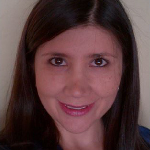 Marcela Erazo is medical doctor, she works in a pain and palliative care unit in a hospital in Bogotá Colombia, where she is also part of the humanization of care group, there she promotes spaces aimed at improving the work experience for health workers, as well as improve the warmth of care provided to people during health care events. Since 2017 he teaches yoga and meditation classes and workshops aimed at health personnel with a focus on self-care. She currently leads an institutional project to train in cultivation of compassion to health personnel and students of medicine, psychology and nursing.
Marcela Erazo es médico, trabaja en una unidad de dolor y cuidados paliativos en un hospital en Bogotá Colombia, donde también hace parte del grupo de humanización de la atención, allí promueve espacios orientados a mejorar la experiencia laboral para los trabajadores de la salud, al igual que mejorar la calidez de la atención brindada a las personas durante eventos de atención en salud. Desde el 2017 imparte clases y talleres de yoga y meditación dirigidos a personal de salud con enfoque hacia al autocuidado. Actualmente lidera un proyecto institucional para entrenar en el cultivo de la compasión a personal de la salud y estudiantes de medicina, psicología y enfermería.
Marcela Erazo is medical doctor, she works in a pain and palliative care unit in a hospital in Bogotá Colombia, where she is also part of the humanization of care group, there she promotes spaces aimed at improving the work experience for health workers, as well as improve the warmth of care provided to people during health care events. Since 2017 he teaches yoga and meditation classes and workshops aimed at health personnel with a focus on self-care. She currently leads an institutional project to train in cultivation of compassion to health personnel and students of medicine, psychology and nursing.
Marcela Erazo es médico, trabaja en una unidad de dolor y cuidados paliativos en un hospital en Bogotá Colombia, donde también hace parte del grupo de humanización de la atención, allí promueve espacios orientados a mejorar la experiencia laboral para los trabajadores de la salud, al igual que mejorar la calidez de la atención brindada a las personas durante eventos de atención en salud. Desde el 2017 imparte clases y talleres de yoga y meditación dirigidos a personal de salud con enfoque hacia al autocuidado. Actualmente lidera un proyecto institucional para entrenar en el cultivo de la compasión a personal de la salud y estudiantes de medicina, psicología y enfermería.
 Maria Paula Jimenez is a psychologist in Colombia and has a minor degree in business administration, both from Los Andes University in Bogotá. She is an expert in integrative medicine from El Rosario University School of Medicine and an expert in Corporate Social Responsibility from La Sergio Arboleda University. As a therapist, Maria Paula combined contemplative practices, integrative medicine, and clinical psychology. Maria Paula is also a corporate consultant in the fields of strategic planning, marketing research, and corporate social responsibility specifically for non-profit organizations and foundations. Maria Paula moved to Palo Alto in 2013 to participate as a full time trainee in the Compassion Cultivation Training Teacher Certification Program at the Center for Compassion and Altruism Research and Education at Stanford. She had the chance to be trained in the Cancer Support Community at Walnut Creek by Margaret Cullen, one of the Senior Teachers of the program. Currently, Maria is a full time CCT ambassador in Colombia and Latin America, offering the training in Spanish for a wide variety of entities including healthcare providers, corporations, universities, as well as the general public. She’s based in Bogotá and Medellín but offers the Compassion Cultivation Training across Latin America having recently hosted sessions in Ecuador and Chile. Ms. Jimenez is fluent in Spanish and English. More information is available in Maria Paula’s Spanish website. She can be contacted by email in Spanish or English.
Maria Paula Jimenez is a psychologist in Colombia and has a minor degree in business administration, both from Los Andes University in Bogotá. She is an expert in integrative medicine from El Rosario University School of Medicine and an expert in Corporate Social Responsibility from La Sergio Arboleda University. As a therapist, Maria Paula combined contemplative practices, integrative medicine, and clinical psychology. Maria Paula is also a corporate consultant in the fields of strategic planning, marketing research, and corporate social responsibility specifically for non-profit organizations and foundations. Maria Paula moved to Palo Alto in 2013 to participate as a full time trainee in the Compassion Cultivation Training Teacher Certification Program at the Center for Compassion and Altruism Research and Education at Stanford. She had the chance to be trained in the Cancer Support Community at Walnut Creek by Margaret Cullen, one of the Senior Teachers of the program. Currently, Maria is a full time CCT ambassador in Colombia and Latin America, offering the training in Spanish for a wide variety of entities including healthcare providers, corporations, universities, as well as the general public. She’s based in Bogotá and Medellín but offers the Compassion Cultivation Training across Latin America having recently hosted sessions in Ecuador and Chile. Ms. Jimenez is fluent in Spanish and English. More information is available in Maria Paula’s Spanish website. She can be contacted by email in Spanish or English.
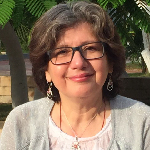 Clara Patricia Ordonez, MD is a Dermatologist, Master in Science and Clinical Epidemiology of Javeriana University and certified instructor of Satyananda Yoga. She is passionate about contemplative practices, health/wellbeing promotion. She completed the first Spanish version of Compassion Cultivation Training (CCT) Teacher Certification Program through Compassion Institute and Nirakara Institute in Madrid (Spain). For more information for upcoming CCT classes, please email her.
Back to top of page
Clara Patricia Ordonez, MD is a Dermatologist, Master in Science and Clinical Epidemiology of Javeriana University and certified instructor of Satyananda Yoga. She is passionate about contemplative practices, health/wellbeing promotion. She completed the first Spanish version of Compassion Cultivation Training (CCT) Teacher Certification Program through Compassion Institute and Nirakara Institute in Madrid (Spain). For more information for upcoming CCT classes, please email her.
Back to top of page
 Lineth Jezek is authorized through Stanford University’s Center for Compassion and Altruism Research and Education (CCARE) and the Compassion Institute to teach Compassion Cultivation Training – CCT. Born and raised in Costa Rica, she relocated to the United States in 2008 to continue her work in global business where she worked collaboratively in global organizations and delivered positive business results for many years. Now she works with similar organizations to help build their employees’ resiliency and support their physical and emotional well-being. Lineth is passionate about improving lives and community health through compassionate well-being. Lineth holds an MBA from Universidad Latina de Costa Rica and is the founder of Genuine Compassion, a company dedicated to providing Compassion Education and Mindfulness programs. She works with communities in the U.S. and Costa Rica, bringing the benefits of compassion training and meditation to a variety of organizations and people from different backgrounds, teaching in both English and Spanish. You may contact Lineth and learn about compassion training in Spanish on her websites.
Back to top of page
Lineth Jezek is authorized through Stanford University’s Center for Compassion and Altruism Research and Education (CCARE) and the Compassion Institute to teach Compassion Cultivation Training – CCT. Born and raised in Costa Rica, she relocated to the United States in 2008 to continue her work in global business where she worked collaboratively in global organizations and delivered positive business results for many years. Now she works with similar organizations to help build their employees’ resiliency and support their physical and emotional well-being. Lineth is passionate about improving lives and community health through compassionate well-being. Lineth holds an MBA from Universidad Latina de Costa Rica and is the founder of Genuine Compassion, a company dedicated to providing Compassion Education and Mindfulness programs. She works with communities in the U.S. and Costa Rica, bringing the benefits of compassion training and meditation to a variety of organizations and people from different backgrounds, teaching in both English and Spanish. You may contact Lineth and learn about compassion training in Spanish on her websites.
Back to top of page
 Nanja Holland Hansen is a licensed psychologist in Denmark and California. She trained at Stanford University as a Compassion Cultivation Training teacher and is a certified through the Center for Compassion Altruism Research and Education (CCARE). She originally got involved with compassion through her work as a therapist. The search for new and effective ways to work with clients developed into the interest in cultivating compassion for self and others. Nanja recently moved back to Copenhagen, Denmark, after working at Stanford University as a therapist. She is currently at the Dansk Center for Mindfulness, Aarhus Universitet, Denmark where she teaches the CCT course in Copenhagen and Aarhus, and currently writing a book on compassion. Nanja H. Hansen has been accepted into the PhD program at Aarhus University, Health and will be conducting research on CCT and caregivers of people with a mental illness. She finds great joy, curiosity, and courage as she teaches the CCT course. For more information, visit her website.
Nanja Holland Hansen is a licensed psychologist in Denmark and California. She trained at Stanford University as a Compassion Cultivation Training teacher and is a certified through the Center for Compassion Altruism Research and Education (CCARE). She originally got involved with compassion through her work as a therapist. The search for new and effective ways to work with clients developed into the interest in cultivating compassion for self and others. Nanja recently moved back to Copenhagen, Denmark, after working at Stanford University as a therapist. She is currently at the Dansk Center for Mindfulness, Aarhus Universitet, Denmark where she teaches the CCT course in Copenhagen and Aarhus, and currently writing a book on compassion. Nanja H. Hansen has been accepted into the PhD program at Aarhus University, Health and will be conducting research on CCT and caregivers of people with a mental illness. She finds great joy, curiosity, and courage as she teaches the CCT course. For more information, visit her website.
 Ida Hertz is a social psychologist based in Copenhagen, Denmark. She is a main driver behind the Danish Center for Resilience (Center for Mental Robusthed). Her core field is resilience training and boosting overall psychological well-being in the workplace. Over the last seven years she has gained extensive experience in developing and teaching scientific validated psycho-educational programs and methods that enhance psychological resilience in private and governmental organizations e.g. hospitals and the army. She is a sought out keynote speaker and dedicated to sharing knowledge about resilience, compassion, and mindtraining. For over a decade, Ida has been attending retreats at Kopan Monastery in Nepal, as well as other meditation and mindtraining retreats in Europe. A long-time meditator herself, Ida began teaching meditation in 2014.
Back to top of page
Ida Hertz is a social psychologist based in Copenhagen, Denmark. She is a main driver behind the Danish Center for Resilience (Center for Mental Robusthed). Her core field is resilience training and boosting overall psychological well-being in the workplace. Over the last seven years she has gained extensive experience in developing and teaching scientific validated psycho-educational programs and methods that enhance psychological resilience in private and governmental organizations e.g. hospitals and the army. She is a sought out keynote speaker and dedicated to sharing knowledge about resilience, compassion, and mindtraining. For over a decade, Ida has been attending retreats at Kopan Monastery in Nepal, as well as other meditation and mindtraining retreats in Europe. A long-time meditator herself, Ida began teaching meditation in 2014.
Back to top of page
 Chantal Lacau is a French clinical psychologist who studied at Paris Descartes University (Paris V). For the past two decades, her clinical practice has been primarily in Neurology and Geriatrics at the Assistance Publique Hôpitaux Parisiens (APHP), offering psychotherapy to people during hospitalization and in outpatient consultations. Chantal is certified as a CCT teacher through the Compassion Institute (CI) and Stanford University’s Center for Compassion and Altruism Research and Education (CCARE). She looks forward to supporting healthcare professionals and any other individuals who are curious about developing their inner compassion resources for sustainable well-being while deepening their resilience, motivation, and sense of connection, even in demanding life circumstances. Her wish is to share CCT among Francophone communities and to contribute to a better world. For information on upcoming CCT classes in French, please visit her website.
Back to top of page
Chantal Lacau is a French clinical psychologist who studied at Paris Descartes University (Paris V). For the past two decades, her clinical practice has been primarily in Neurology and Geriatrics at the Assistance Publique Hôpitaux Parisiens (APHP), offering psychotherapy to people during hospitalization and in outpatient consultations. Chantal is certified as a CCT teacher through the Compassion Institute (CI) and Stanford University’s Center for Compassion and Altruism Research and Education (CCARE). She looks forward to supporting healthcare professionals and any other individuals who are curious about developing their inner compassion resources for sustainable well-being while deepening their resilience, motivation, and sense of connection, even in demanding life circumstances. Her wish is to share CCT among Francophone communities and to contribute to a better world. For information on upcoming CCT classes in French, please visit her website.
Back to top of page
 Nitesh is the founder of The Mindful Initiative. The Mindful Initiative collaborates with individuals and organisations to realise their true potential by adopting a holistic approach towards personal well-being and professional growth.
It was in 2007 that Nitesh attended his first Yoga class. It was that class that marked the beginning of his quest to discover the depths of Indian culture and history. After several years of practice and training under his teacher, he started Ashtanga Yoga Sadhna Program in Bangalore. His passion led him to become a Media Professional and produce two award winning feature films in India. Prior to becoming an entrepreneur, Nitesh worked for financial firms like Freddie Mac and Fannie Mae. You may reach him in Bangalore via email.
Back to top of page
Nitesh is the founder of The Mindful Initiative. The Mindful Initiative collaborates with individuals and organisations to realise their true potential by adopting a holistic approach towards personal well-being and professional growth.
It was in 2007 that Nitesh attended his first Yoga class. It was that class that marked the beginning of his quest to discover the depths of Indian culture and history. After several years of practice and training under his teacher, he started Ashtanga Yoga Sadhna Program in Bangalore. His passion led him to become a Media Professional and produce two award winning feature films in India. Prior to becoming an entrepreneur, Nitesh worked for financial firms like Freddie Mac and Fannie Mae. You may reach him in Bangalore via email.
Back to top of page
 Amy is a pioneer in bringing Compassion Cultivation Training (CCT) to Asia. She is the first CCT teacher in South East Asia, certified by Stanford University’s Center for Compassion and Altruism Research and Education (CCARE) and Compassion Institute (CI). Amy is the founder of Just4Mind, an organization which focuses on bringing compassion, mindfulness, emotional intelligence and resilience training into companies, universities, schools, government organisations and non-profits throughout Asia.
Amy holds an MBA from INSEAD and has 10 years of experience in management consulting and finance. She worked at Bain & Company and Ernst & Young before starting her own venture. Understanding the emotional struggles in a fast-paced corporate environment, Amy has conducted various compassion and mindfulness workshops across Asia for leaders and executives at multinationals like Microsoft, Unilever, P&G and PricewaterhouseCoopers. Amy is passionate about transforming individuals and organization culture by cultivating compassionate leadership, and integrating mindfulness, wisdom, and compassion into our everyday life.
Back to top of page
Amy is a pioneer in bringing Compassion Cultivation Training (CCT) to Asia. She is the first CCT teacher in South East Asia, certified by Stanford University’s Center for Compassion and Altruism Research and Education (CCARE) and Compassion Institute (CI). Amy is the founder of Just4Mind, an organization which focuses on bringing compassion, mindfulness, emotional intelligence and resilience training into companies, universities, schools, government organisations and non-profits throughout Asia.
Amy holds an MBA from INSEAD and has 10 years of experience in management consulting and finance. She worked at Bain & Company and Ernst & Young before starting her own venture. Understanding the emotional struggles in a fast-paced corporate environment, Amy has conducted various compassion and mindfulness workshops across Asia for leaders and executives at multinationals like Microsoft, Unilever, P&G and PricewaterhouseCoopers. Amy is passionate about transforming individuals and organization culture by cultivating compassionate leadership, and integrating mindfulness, wisdom, and compassion into our everyday life.
Back to top of page
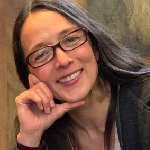 Gabriela is a dancer, body psychotherapist, educator and activist. Graduated in Contemporary Dance from the National Institute of Fine Arts, Body Therapist with studies in Psychosynthesis and Psycho-body Techniques, she has some specialties in alternative therapies and psycho-education and offers services in body psychotherapy. Trained in Contemplative Accompaniment in Death by the Nirakara Institute-Madrid, she accompanies the elderly and people with chronic-degenerative and terminal diseases. She teaches Development of artistic skills and Movement for consciousness.
She is a founding member of the Centro Ateneo Ítaca AC, an organization oriented to human development that offers academic training in prevention of mental health, as well as therapeutic services from the approach of Traditional Indigenous Medicine, and the design and operation of socio-educational projects for vulnerable communities in Mexico. For more information, visit their website.
Gabriela is a dancer, body psychotherapist, educator and activist. Graduated in Contemporary Dance from the National Institute of Fine Arts, Body Therapist with studies in Psychosynthesis and Psycho-body Techniques, she has some specialties in alternative therapies and psycho-education and offers services in body psychotherapy. Trained in Contemplative Accompaniment in Death by the Nirakara Institute-Madrid, she accompanies the elderly and people with chronic-degenerative and terminal diseases. She teaches Development of artistic skills and Movement for consciousness.
She is a founding member of the Centro Ateneo Ítaca AC, an organization oriented to human development that offers academic training in prevention of mental health, as well as therapeutic services from the approach of Traditional Indigenous Medicine, and the design and operation of socio-educational projects for vulnerable communities in Mexico. For more information, visit their website.
 Odette is a Certified Instructor of Compassion Cultivation Training (CCT™) through the Compassion Institute and Stanford University´s Center for Compassion and Altruism Research and Education. She is also a Senior Instructor, lecturer, and curriculum designer for AtentaMente Consultores, a leading Mexican non-profit organization that develops and implements Social and Emotional Learning and contemplative programs. She has co-authored the book Las emociones de mi bebé (suggestions for promoting emotional development in children ages zero to three). Odette has been offering conferences and trainings in educational, government, and organizational settings in Mexico and internationally since 2012.
Odette is a Certified Instructor of Compassion Cultivation Training (CCT™) through the Compassion Institute and Stanford University´s Center for Compassion and Altruism Research and Education. She is also a Senior Instructor, lecturer, and curriculum designer for AtentaMente Consultores, a leading Mexican non-profit organization that develops and implements Social and Emotional Learning and contemplative programs. She has co-authored the book Las emociones de mi bebé (suggestions for promoting emotional development in children ages zero to three). Odette has been offering conferences and trainings in educational, government, and organizational settings in Mexico and internationally since 2012.
 Since 2013, Alberto has been teaching workshops and giving conferences related to contemplative practice, aimed at the general public, private companies, and governmental and social organizations. He leads the meditation workshops at the National Autonomous University of Mexico’s (UNAM), Acatlán School of Higher Education, and is currently implementing an inter-institutional project to introduce meditation to vulnerable sectors of the population. He is leading another project to promote a more natural approach to death, as well as the creation of community support networks to help cope with bereavement and the end of life. For more information, please visit his website.
Alberto imparte desde el año 2013 talleres y conferencias relacionados con las prácticas contemplativas, dirigidos al público en general, empresas privadas, gobierno y organizaciones sociales. Dirige los talleres de meditación en la Universidad Nacional Autónoma de México, Facultad de Estudios Superiores de Acatlán. Actualmente conduce un proyecto interinstitucional para llevar la meditación a poblaciones vulnerables y otro dedicado a promover una aproximación de mayor naturalidad hacia la muerte y la creación de redes de apoyo comunitario para la vida y la muerte. Para más información, visita su sitio web.
Since 2013, Alberto has been teaching workshops and giving conferences related to contemplative practice, aimed at the general public, private companies, and governmental and social organizations. He leads the meditation workshops at the National Autonomous University of Mexico’s (UNAM), Acatlán School of Higher Education, and is currently implementing an inter-institutional project to introduce meditation to vulnerable sectors of the population. He is leading another project to promote a more natural approach to death, as well as the creation of community support networks to help cope with bereavement and the end of life. For more information, please visit his website.
Alberto imparte desde el año 2013 talleres y conferencias relacionados con las prácticas contemplativas, dirigidos al público en general, empresas privadas, gobierno y organizaciones sociales. Dirige los talleres de meditación en la Universidad Nacional Autónoma de México, Facultad de Estudios Superiores de Acatlán. Actualmente conduce un proyecto interinstitucional para llevar la meditación a poblaciones vulnerables y otro dedicado a promover una aproximación de mayor naturalidad hacia la muerte y la creación de redes de apoyo comunitario para la vida y la muerte. Para más información, visita su sitio web.
 Yanel González Mogas has been practicing contemplative practices since the year 2000 under the guidance of teachers like Ven. Alan Wallace and Marco Antonio Karam. She is a UCLA Certified Mindfulness Facilitator and a Stanford University trained Compassion Cultivating Training teacher. Yanel holds a master´s degree in Humanistic Studies from Instituto Tecnológico de Estucios Superiores in Monterrey. She is a mindfulness and compassion facilitator and curriculum designer for AtentaMente Consultores, a Mexican organization that believes that by cultivating an attentive mind that is more calm, clear, and kind, each and every one of us can contribute to global cultural change from the inside out. She offers different mindfulness and CCT workshops in Monterrey, México. If you want to know more about the programs, you can visit her website or contact her directly in English or Spanish via email. Read this biography in Spanish here.
Yanel González Mogas has been practicing contemplative practices since the year 2000 under the guidance of teachers like Ven. Alan Wallace and Marco Antonio Karam. She is a UCLA Certified Mindfulness Facilitator and a Stanford University trained Compassion Cultivating Training teacher. Yanel holds a master´s degree in Humanistic Studies from Instituto Tecnológico de Estucios Superiores in Monterrey. She is a mindfulness and compassion facilitator and curriculum designer for AtentaMente Consultores, a Mexican organization that believes that by cultivating an attentive mind that is more calm, clear, and kind, each and every one of us can contribute to global cultural change from the inside out. She offers different mindfulness and CCT workshops in Monterrey, México. If you want to know more about the programs, you can visit her website or contact her directly in English or Spanish via email. Read this biography in Spanish here.
 Valentín is a Mexican psychologist whose main interest has been the intersection between Buddhist contemplative practices and western sciences like psychology, neuroscience, and education. He is certified by Paul Ekman PhD and the Alan Wallace PhD´s Santa Barbara Institute for Consciousness Studies as teacher for the “Cultivating Emotional Balance” program, and he is also a certified teacher of the “.b” program, for teaching mindfulness to the youth, a curriculum developed by The Mindfulness in Schools Project. His training includes retreats of one, two, and three months for the practice and study of Buddhist contemplative practices. This training has taken place in several retreats centers and monasteries in India, Nepal, and Thailand, where he has lived for more than two years in several periods of study and practice. Currently he is leading a Project called “Cien por México” (One hundred for (the service) of Mexico) aimed to create a constructive impact in society. It consists of spreading several evidence-based protocols for the cultivation of compassion, mindfulness, and emotional balance to society in a very accessible way. You can find resources as guided meditations, articles, and more information about the programs he teaches at his website (in Spanish). Read this biography in Spanish here.
Back to top of page
Valentín is a Mexican psychologist whose main interest has been the intersection between Buddhist contemplative practices and western sciences like psychology, neuroscience, and education. He is certified by Paul Ekman PhD and the Alan Wallace PhD´s Santa Barbara Institute for Consciousness Studies as teacher for the “Cultivating Emotional Balance” program, and he is also a certified teacher of the “.b” program, for teaching mindfulness to the youth, a curriculum developed by The Mindfulness in Schools Project. His training includes retreats of one, two, and three months for the practice and study of Buddhist contemplative practices. This training has taken place in several retreats centers and monasteries in India, Nepal, and Thailand, where he has lived for more than two years in several periods of study and practice. Currently he is leading a Project called “Cien por México” (One hundred for (the service) of Mexico) aimed to create a constructive impact in society. It consists of spreading several evidence-based protocols for the cultivation of compassion, mindfulness, and emotional balance to society in a very accessible way. You can find resources as guided meditations, articles, and more information about the programs he teaches at his website (in Spanish). Read this biography in Spanish here.
Back to top of page
 Barbara Piper is an entrepreneur and teacher specializing in workplace wellbeing. She is the owner of Be Rooted, a Netherlands-based company focused on providing support to corporate and academic professionals. In her work with professionals across the globe, she creates safe spaces for individuals and groups to connect and learn about the application of applied contemplative and compassionate practices. Barbara holds a master’s degree in Communications and has over 20 years of experience in both corporate environments and health care management. Today, as a Stanford-trained and certified Applied Compassion Ambassador, her focus is on workplace wellbeing and bringing the qualities of compassion, kindness, and empathy into organizations. She additionally serves as a mentor, coach, and facilitator for Young Professionals all over the world. For more information, please visit her website or contact her by email.
Back to top of page
Barbara Piper is an entrepreneur and teacher specializing in workplace wellbeing. She is the owner of Be Rooted, a Netherlands-based company focused on providing support to corporate and academic professionals. In her work with professionals across the globe, she creates safe spaces for individuals and groups to connect and learn about the application of applied contemplative and compassionate practices. Barbara holds a master’s degree in Communications and has over 20 years of experience in both corporate environments and health care management. Today, as a Stanford-trained and certified Applied Compassion Ambassador, her focus is on workplace wellbeing and bringing the qualities of compassion, kindness, and empathy into organizations. She additionally serves as a mentor, coach, and facilitator for Young Professionals all over the world. For more information, please visit her website or contact her by email.
Back to top of page
 Having studied economics, philosophy, anthropology and music at different universities; Rubén teaches mindfulness and compassion based programs and interventions in healthcare, education, and corporate contexts in Spain, Norway, Sweden and Iceland, and sometimes other northern countries, teaching fluently in 3 languages. He also works with leadership, mindful communication, compassion and mindfulness at work, and teaches programs for the end of life / palliative care / being with dying. A practitioner of meditation and yoga for 30 years, Rubén spends 3 months annually on meditation retreats with different teachers like Pema Chödrön, Dzigar Kongtrul, and Khempo Gawang. For more information, please visit his website or contact him by email.
Back to top of page
Having studied economics, philosophy, anthropology and music at different universities; Rubén teaches mindfulness and compassion based programs and interventions in healthcare, education, and corporate contexts in Spain, Norway, Sweden and Iceland, and sometimes other northern countries, teaching fluently in 3 languages. He also works with leadership, mindful communication, compassion and mindfulness at work, and teaches programs for the end of life / palliative care / being with dying. A practitioner of meditation and yoga for 30 years, Rubén spends 3 months annually on meditation retreats with different teachers like Pema Chödrön, Dzigar Kongtrul, and Khempo Gawang. For more information, please visit his website or contact him by email.
Back to top of page
 Amy is a pioneer in bringing Compassion Cultivation Training (CCT) to Asia. She is the first CCT teacher in South East Asia, certified by Stanford University’s Center for Compassion and Altruism Research and Education (CCARE) and Compassion Institute (CI). Amy is the founder of Just4Mind, an organization which focuses on bringing compassion, mindfulness, emotional intelligence and resilience training into companies, universities, schools, government organisations and non-profits throughout Asia.
Amy holds an MBA from INSEAD and has 10 years of experience in management consulting and finance. She worked at Bain & Company and Ernst & Young before starting her own venture. Understanding the emotional struggles in a fast-paced corporate environment, Amy has conducted various compassion and mindfulness workshops across Asia for leaders and executives at multinationals like Microsoft, Unilever, P&G and PricewaterhouseCoopers. Amy is passionate about transforming individuals and organization culture by cultivating compassionate leadership, and integrating mindfulness, wisdom, and compassion into our everyday life.
Back to top of page
Amy is a pioneer in bringing Compassion Cultivation Training (CCT) to Asia. She is the first CCT teacher in South East Asia, certified by Stanford University’s Center for Compassion and Altruism Research and Education (CCARE) and Compassion Institute (CI). Amy is the founder of Just4Mind, an organization which focuses on bringing compassion, mindfulness, emotional intelligence and resilience training into companies, universities, schools, government organisations and non-profits throughout Asia.
Amy holds an MBA from INSEAD and has 10 years of experience in management consulting and finance. She worked at Bain & Company and Ernst & Young before starting her own venture. Understanding the emotional struggles in a fast-paced corporate environment, Amy has conducted various compassion and mindfulness workshops across Asia for leaders and executives at multinationals like Microsoft, Unilever, P&G and PricewaterhouseCoopers. Amy is passionate about transforming individuals and organization culture by cultivating compassionate leadership, and integrating mindfulness, wisdom, and compassion into our everyday life.
Back to top of page
 Merlene Nieuwoudt is a business consultant, Integral executive Coach, Mindfulness and Compassion Educator based in the Cape Town metro area. She has 30+ years’ experience as a senior executive/ senior director within international FTSE 100 and Blue Chip organizations. She holds a Doctorate in Business Administration (DBA and MBA) plus Masters in Coaching. In addition to being a certified CCT Teacher through CCARE at Stanford University in collaboration with the Compassion Institute, she has completed MBI, MBSR and studies in Buddhism and Psychology. She is a student of life exploring the intersection of embodied presence and contemplative practices. To reach her, please email or visit her website.
Back to top of page
Merlene Nieuwoudt is a business consultant, Integral executive Coach, Mindfulness and Compassion Educator based in the Cape Town metro area. She has 30+ years’ experience as a senior executive/ senior director within international FTSE 100 and Blue Chip organizations. She holds a Doctorate in Business Administration (DBA and MBA) plus Masters in Coaching. In addition to being a certified CCT Teacher through CCARE at Stanford University in collaboration with the Compassion Institute, she has completed MBI, MBSR and studies in Buddhism and Psychology. She is a student of life exploring the intersection of embodied presence and contemplative practices. To reach her, please email or visit her website.
Back to top of page
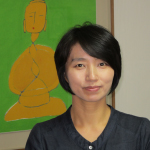 Seona Gwon works as a teacher, producer, writer and translator in South Korea, and occasionally in California. She is an International Dharma Instructor, certified by the Jogye Order of Korean Buddhism. Also, Seona is a certified teacher of CCT and Mindful Self Compassion (MSC), teaching in both Korean and English. For 15 years, Seona was an Instructor at Joongang Sangha University, the primary Buddhist university in Korea for monks and nuns, and taught in the graduate school of Dongguk University’s Buddhist Department and at the International School of Buddhist Studies (ISBS). As a producer, she brought Zen Master Thich Nhat Hanh to South Korea in 2003, and Zen teacher Norman Fischer in 2017. Seona has a Phd in Buddhist Studies. She has been a practitioner of Korean Zen (Seon) since childhood. Her central path is developing and deepening her own compassion and then bringing connection, kindness, and compassion to the larger world.
Back to top of page
Seona Gwon works as a teacher, producer, writer and translator in South Korea, and occasionally in California. She is an International Dharma Instructor, certified by the Jogye Order of Korean Buddhism. Also, Seona is a certified teacher of CCT and Mindful Self Compassion (MSC), teaching in both Korean and English. For 15 years, Seona was an Instructor at Joongang Sangha University, the primary Buddhist university in Korea for monks and nuns, and taught in the graduate school of Dongguk University’s Buddhist Department and at the International School of Buddhist Studies (ISBS). As a producer, she brought Zen Master Thich Nhat Hanh to South Korea in 2003, and Zen teacher Norman Fischer in 2017. Seona has a Phd in Buddhist Studies. She has been a practitioner of Korean Zen (Seon) since childhood. Her central path is developing and deepening her own compassion and then bringing connection, kindness, and compassion to the larger world.
Back to top of page
 Belén Colomina is a psychologist and Gestalt Psychotherapist by the AETG and FEAP, specializing in childhood and adolescence. Professor of different psychotherapy, psychology and mindfulness and yoga programs. She is a meditation instructor by the CIDEB and CCT certified instructor by the Compassion Institute and Nirakara Institute and a yoga teacher for children by the YOGA ALLIANCE. Member of the teaching and psychotherapeutic team of the Gestalt Therapy Institute of Valencia since 2002 and of Elephant Plena, center of psychology and contemplative sciences where she coordinates the area of psychology and child-youth meditation. She is also a member of the emergency psychology team of the Official College of Psychology. She has extensive experience in the field of psychotherapy and psychosocial intervention projects with families and teenagers in vulnerable situations. Author of the books, Mindfulness para Familias. Una maravillosa expedición con miles de estrellas (2017) and La adolescencia. 7 claves para prevenir los problemas de conducta (2014), and the “Bummda Omm” program by Mindfulness for Families. Collaborator in different social media and meditation App. To know more about her, you can visit her website.
Belén Colomina es Psicóloga y Psicoterapeuta Gestalt por la AETG y FEAP, especializada en infancia y adolescencia. Profesora de diferentes formaciones de psicoterapia, psicología y programas de mindfulness y yoga. Es instructora de Meditación por el CIDEB, instructora certificada de CCT por el Compassion Institute y Nirakara Institute y Profesora de Yoga para niños por el YOGA ALLIANCE. Miembro del equipo docente y psicoterapéutico del Instituto de Terapia Gestalt de Valencia desde el año 2002 y de Elephant Plena, centro de psicología y ciencias contemplativas donde coordina el área de psicología y meditación infanto-juvenil. También es miembro del equipo de psicología de emergencias del Colegio Oficial de Psicología. Cuenta con una amplia experiencia en el ámbito de la psicoterapia y en proyectos de intervención psicosocial con familias y adolescentes en situación de vulnerabilidad. Autora de los libros “Mindfulness para Familias. Una maravillosa expedición con miles de estrellas” (2017) y “La adolescencia. 7 claves para prevenir los problemas de conducta” (2014) y del programa “Bummda Omm” de Mindfulness para Familias. Colaboradora en diferentes medios de comunicación y App de meditación. Para saber más de ella, puedes visitar su web.
Belén Colomina is a psychologist and Gestalt Psychotherapist by the AETG and FEAP, specializing in childhood and adolescence. Professor of different psychotherapy, psychology and mindfulness and yoga programs. She is a meditation instructor by the CIDEB and CCT certified instructor by the Compassion Institute and Nirakara Institute and a yoga teacher for children by the YOGA ALLIANCE. Member of the teaching and psychotherapeutic team of the Gestalt Therapy Institute of Valencia since 2002 and of Elephant Plena, center of psychology and contemplative sciences where she coordinates the area of psychology and child-youth meditation. She is also a member of the emergency psychology team of the Official College of Psychology. She has extensive experience in the field of psychotherapy and psychosocial intervention projects with families and teenagers in vulnerable situations. Author of the books, Mindfulness para Familias. Una maravillosa expedición con miles de estrellas (2017) and La adolescencia. 7 claves para prevenir los problemas de conducta (2014), and the “Bummda Omm” program by Mindfulness for Families. Collaborator in different social media and meditation App. To know more about her, you can visit her website.
Belén Colomina es Psicóloga y Psicoterapeuta Gestalt por la AETG y FEAP, especializada en infancia y adolescencia. Profesora de diferentes formaciones de psicoterapia, psicología y programas de mindfulness y yoga. Es instructora de Meditación por el CIDEB, instructora certificada de CCT por el Compassion Institute y Nirakara Institute y Profesora de Yoga para niños por el YOGA ALLIANCE. Miembro del equipo docente y psicoterapéutico del Instituto de Terapia Gestalt de Valencia desde el año 2002 y de Elephant Plena, centro de psicología y ciencias contemplativas donde coordina el área de psicología y meditación infanto-juvenil. También es miembro del equipo de psicología de emergencias del Colegio Oficial de Psicología. Cuenta con una amplia experiencia en el ámbito de la psicoterapia y en proyectos de intervención psicosocial con familias y adolescentes en situación de vulnerabilidad. Autora de los libros “Mindfulness para Familias. Una maravillosa expedición con miles de estrellas” (2017) y “La adolescencia. 7 claves para prevenir los problemas de conducta” (2014) y del programa “Bummda Omm” de Mindfulness para Familias. Colaboradora en diferentes medios de comunicación y App de meditación. Para saber más de ella, puedes visitar su web.
 Silvia is a Spanish psychologist, empathy researcher, yoga teacher, and hospice care volunteer. Her intention is to foster compassion and healing among populations facing death, trauma, and violence. She received her PhD at The New School for Social Research in NYC. For her dissertation, she lived one year in Varanasi investigating how diverse groups in India manage death and dying. She did a documentary reflecting this work. She has years of experience teaching social psychology, research methods, and empathy at The New School and CUNY. She has created and implemented research-based empathy and emotion regulation workshops for rape crisis advocates at New York hospitals and lawyers working at the International Justice Project. Silvia was trained at CCARE Stanford’s School of Medicine to become a certified CCT instructor. For the past year, she has been teaching CCT to lawyers and social workers involved in criminal justice at Columbia University. Silvia is moving back to Spain with the intention to teach CCT in Madrid and Barcelona and continue to promote social justice and compassion through her work. For information about upcoming CCT classes, or to schedule a workshop, visit her website or email her.
Silvia is a Spanish psychologist, empathy researcher, yoga teacher, and hospice care volunteer. Her intention is to foster compassion and healing among populations facing death, trauma, and violence. She received her PhD at The New School for Social Research in NYC. For her dissertation, she lived one year in Varanasi investigating how diverse groups in India manage death and dying. She did a documentary reflecting this work. She has years of experience teaching social psychology, research methods, and empathy at The New School and CUNY. She has created and implemented research-based empathy and emotion regulation workshops for rape crisis advocates at New York hospitals and lawyers working at the International Justice Project. Silvia was trained at CCARE Stanford’s School of Medicine to become a certified CCT instructor. For the past year, she has been teaching CCT to lawyers and social workers involved in criminal justice at Columbia University. Silvia is moving back to Spain with the intention to teach CCT in Madrid and Barcelona and continue to promote social justice and compassion through her work. For information about upcoming CCT classes, or to schedule a workshop, visit her website or email her.
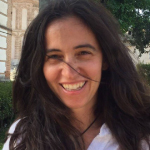 Natalia is a journalist who writes about health, psychology and wellbeing. She also teaches at Universidad Carlos III de Madrid (UC3M). A Fulbright scholar, she holds an MA in Journalism from the University of Missouri-Columbia as well as an MA from Escuela de Periodismo UAM/El País. She has been a correspondent based in the USA and worked as freelance from Brazil, China and Scotland. She started practicing yoga and meditation in 2001, while living in San Francisco, and has attended numerous trainings and retreats since. She´s a certified yoga teacher and active member of Zen master Thich Nhat Hanh´s Spanish sangha. Her main goal is to promote compassion in the educational and news media contexts. For more information, please visit her website or contact her by email.
Natalia Martín Cantero es periodista especializada en salud, psicología y bienestar, y profesora en la Universidad Carlos III de Madrid. Máster en periodismo con una beca Fulbright en la Universidad de Missouri-Columbia y en la Escuela de Periodismo UAM/El País. Trabajó como corresponsal en EEUU durante diez años y como freelance en Brasil, China y Escocia. Comenzó su práctica de yoga y meditación en 2001, cuando vivía en San Francisco, y desde entonces ha continuado asistiendo a retiros y formaciones en todo el mundo. Es profesora certificada de yoga y miembro de la sangha del maestro Zen Thich Nhat Hanh en España. Su principal objetivo es promover la compasión en el contexto educativo, de los medios y, eventualmente, empresarial. Para más información, por favor visita su página web o contacta por email.
Natalia is a journalist who writes about health, psychology and wellbeing. She also teaches at Universidad Carlos III de Madrid (UC3M). A Fulbright scholar, she holds an MA in Journalism from the University of Missouri-Columbia as well as an MA from Escuela de Periodismo UAM/El País. She has been a correspondent based in the USA and worked as freelance from Brazil, China and Scotland. She started practicing yoga and meditation in 2001, while living in San Francisco, and has attended numerous trainings and retreats since. She´s a certified yoga teacher and active member of Zen master Thich Nhat Hanh´s Spanish sangha. Her main goal is to promote compassion in the educational and news media contexts. For more information, please visit her website or contact her by email.
Natalia Martín Cantero es periodista especializada en salud, psicología y bienestar, y profesora en la Universidad Carlos III de Madrid. Máster en periodismo con una beca Fulbright en la Universidad de Missouri-Columbia y en la Escuela de Periodismo UAM/El País. Trabajó como corresponsal en EEUU durante diez años y como freelance en Brasil, China y Escocia. Comenzó su práctica de yoga y meditación en 2001, cuando vivía en San Francisco, y desde entonces ha continuado asistiendo a retiros y formaciones en todo el mundo. Es profesora certificada de yoga y miembro de la sangha del maestro Zen Thich Nhat Hanh en España. Su principal objetivo es promover la compasión en el contexto educativo, de los medios y, eventualmente, empresarial. Para más información, por favor visita su página web o contacta por email.
 Marisol Martínez Avila is a nurse in a trauma intensive care unit in a hospital in Madrid. Degree in Geography and History. Master in Physical Anthropology: Evolution and Human Biodiversity from the Universidad Autónoma de Madrid (archeology and prehistory has been one of my passions). Expert in Mindfulness in Health Contexts from the Universidad Complutense de Madrid. Therapeutic yoga teacher. Member of Project HUCI (Humanization Project of Intensive Care). Teacher in the Master of Humanization of Healthcare: patients, families and professionals, teaching the practice of Yoga and Mindfulness as a tool for self-care. The context in which I would like to teach the Cultivation of Compassion is in the Hospital, as sometimes I have the feeling that we have “dehumanized”, that we are not fully aware of how we treat people who face disease and pain, who feel tremendously vulnerable and who seek in us the relief of their suffering … and we are not always able to welcome and accompany that suffering.
Marisol Martínez Avila es enfermera en una unidad de cuidados intensivos de trauma en un hospital en Madrid.Licenciada en Geografía e Historia. Máster en Antropología Física: Evolución y Biodiversidad humana por la Universidad Autónoma de Madrid (la arqueología y la prehistoria han sido una de mis pasiones). Experta en Mindfulness en Contextos de Salud por la Universidad Complutense de Madrid. Profesora de yoga terapéutico. Miembro de Proyecto HUCI (Proyecto de Humanización de los Cuidados Intensivos). Profesora en el Máster de Humanización de la Asistencia Sanitaria: pacientes, familias y profesionales, enseñando la práctica de Yoga y Mindfulness como herramienta de auto-cuidado.El contexto en el que me gustaría enseñar el Cultivo de la Compasión es en el Hospital, a veces tengo la sensación que nos hemos “deshumanizado”, que no somos del todo conscientes de cómo tratamos a las personas que se enfrentan a la enfermedad y al dolor, que se sienten tremendamente vulnerables y que buscan en nosotros el alivio de su sufrimiento…y nosotros no somos siempre capaces de arropar, acoger y acompañar ese sufrimiento.
Marisol Martínez Avila is a nurse in a trauma intensive care unit in a hospital in Madrid. Degree in Geography and History. Master in Physical Anthropology: Evolution and Human Biodiversity from the Universidad Autónoma de Madrid (archeology and prehistory has been one of my passions). Expert in Mindfulness in Health Contexts from the Universidad Complutense de Madrid. Therapeutic yoga teacher. Member of Project HUCI (Humanization Project of Intensive Care). Teacher in the Master of Humanization of Healthcare: patients, families and professionals, teaching the practice of Yoga and Mindfulness as a tool for self-care. The context in which I would like to teach the Cultivation of Compassion is in the Hospital, as sometimes I have the feeling that we have “dehumanized”, that we are not fully aware of how we treat people who face disease and pain, who feel tremendously vulnerable and who seek in us the relief of their suffering … and we are not always able to welcome and accompany that suffering.
Marisol Martínez Avila es enfermera en una unidad de cuidados intensivos de trauma en un hospital en Madrid.Licenciada en Geografía e Historia. Máster en Antropología Física: Evolución y Biodiversidad humana por la Universidad Autónoma de Madrid (la arqueología y la prehistoria han sido una de mis pasiones). Experta en Mindfulness en Contextos de Salud por la Universidad Complutense de Madrid. Profesora de yoga terapéutico. Miembro de Proyecto HUCI (Proyecto de Humanización de los Cuidados Intensivos). Profesora en el Máster de Humanización de la Asistencia Sanitaria: pacientes, familias y profesionales, enseñando la práctica de Yoga y Mindfulness como herramienta de auto-cuidado.El contexto en el que me gustaría enseñar el Cultivo de la Compasión es en el Hospital, a veces tengo la sensación que nos hemos “deshumanizado”, que no somos del todo conscientes de cómo tratamos a las personas que se enfrentan a la enfermedad y al dolor, que se sienten tremendamente vulnerables y que buscan en nosotros el alivio de su sufrimiento…y nosotros no somos siempre capaces de arropar, acoger y acompañar ese sufrimiento.
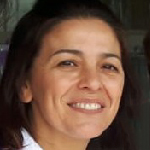 Isabel Murcia-Saez is an Intensive Care physician and part of the donation and transplant team at her hospital within the Spanish National Transplant Organization. Tutor of doctors in training, collaborator in training in the accompaniment in the end of life, she likes to learn and also share knowledge. Through her work, she has known situations of suffering, compassion and altruism and in these situations meditation and compassion have given her stability, clarity and strength. She is a Certified Teacher of Compassion Cultivation Training (CCT) by the Compassion Institute and Nirakara Institute. Isabel’s main interest is to teach CCT to diverse populations, but especially in health care, to professors, staff and students.
Isabel Murcia-Sáez es médico intensivista y forma parte del equipo de donación y trasplante de su Hospital dentro de la Organización Nacional de Trasplantes de España.
Es tutora de residentes (médicos intensivistas en formación), colaboradora en formación en el acompañamiento al final de la vida, le gusta aprender y también compartir el conocimiento. A través de su trabajo ha conocido situaciones de sufrimiento, compasión y altruismo y en estas situaciones la meditación y la compasión le ha proporcionado estabilidad, claridad y fuerza. Certificada como instructora en el entrenamiento en el cultivo de la compasión (ECC) por el Compassion Institute y el Instituto Nirakara
El principal interés de Isabel es enseñar el ECC a poblaciones diversas, pero especialmente en atención médica, a personal, profesores y estudiantes.
Isabel Murcia-Saez is an Intensive Care physician and part of the donation and transplant team at her hospital within the Spanish National Transplant Organization. Tutor of doctors in training, collaborator in training in the accompaniment in the end of life, she likes to learn and also share knowledge. Through her work, she has known situations of suffering, compassion and altruism and in these situations meditation and compassion have given her stability, clarity and strength. She is a Certified Teacher of Compassion Cultivation Training (CCT) by the Compassion Institute and Nirakara Institute. Isabel’s main interest is to teach CCT to diverse populations, but especially in health care, to professors, staff and students.
Isabel Murcia-Sáez es médico intensivista y forma parte del equipo de donación y trasplante de su Hospital dentro de la Organización Nacional de Trasplantes de España.
Es tutora de residentes (médicos intensivistas en formación), colaboradora en formación en el acompañamiento al final de la vida, le gusta aprender y también compartir el conocimiento. A través de su trabajo ha conocido situaciones de sufrimiento, compasión y altruismo y en estas situaciones la meditación y la compasión le ha proporcionado estabilidad, claridad y fuerza. Certificada como instructora en el entrenamiento en el cultivo de la compasión (ECC) por el Compassion Institute y el Instituto Nirakara
El principal interés de Isabel es enseñar el ECC a poblaciones diversas, pero especialmente en atención médica, a personal, profesores y estudiantes.
 I’m a Family Doctor working in Primary Health Care. MD (Medical Humanities) and expert in Bioethics and Palliative Care. I participated in the first International CCT Teaching Training in Spanish. I’m certified by the Compassion Institute and Nirakara in Madrid (Spain) in December 2019. My intention is to foster compassion in healthcare professionals, in women victims of gender violence, and in prisons. You may reach me via email.
Soy médica de familia y trabajo en atención primaria de salud. Doctora en Medicina (Humanidades médicas) y experta en Bioética y en Cuidados Paliativos. Participé en la primera Formación Internacional de Instructores del programa CCT-TT en Español, obteniendo la certificación internacional por el Compassion Institute y Nirakara en diciembre de 2019. Mi intención es promover la compasión en los profesionales sanitarios, en las mujeres víctimas de violencia de género y en prisiones. Puede contactarme por correo electrónico.
I’m a Family Doctor working in Primary Health Care. MD (Medical Humanities) and expert in Bioethics and Palliative Care. I participated in the first International CCT Teaching Training in Spanish. I’m certified by the Compassion Institute and Nirakara in Madrid (Spain) in December 2019. My intention is to foster compassion in healthcare professionals, in women victims of gender violence, and in prisons. You may reach me via email.
Soy médica de familia y trabajo en atención primaria de salud. Doctora en Medicina (Humanidades médicas) y experta en Bioética y en Cuidados Paliativos. Participé en la primera Formación Internacional de Instructores del programa CCT-TT en Español, obteniendo la certificación internacional por el Compassion Institute y Nirakara en diciembre de 2019. Mi intención es promover la compasión en los profesionales sanitarios, en las mujeres víctimas de violencia de género y en prisiones. Puede contactarme por correo electrónico.
 Having studied economics, philosophy, anthropology and music at different universities; Rubén teaches mindfulness and compassion based programs and interventions in healthcare, education, and corporate contexts in Spain, Norway, Sweden and Iceland, and sometimes other northern countries, teaching fluently in 3 languages. He also works with leadership, mindful communication, compassion and mindfulness at work, and teaches programs for the end of life / palliative care / being with dying. A practitioner of meditation and yoga for 30 years, Rubén spends 3 months annually on meditation retreats with different teachers like Pema Chödrön, Dzigar Kongtrul, and Khempo Gawang. For more information, please visit his website or contact him by email.
Having studied economics, philosophy, anthropology and music at different universities; Rubén teaches mindfulness and compassion based programs and interventions in healthcare, education, and corporate contexts in Spain, Norway, Sweden and Iceland, and sometimes other northern countries, teaching fluently in 3 languages. He also works with leadership, mindful communication, compassion and mindfulness at work, and teaches programs for the end of life / palliative care / being with dying. A practitioner of meditation and yoga for 30 years, Rubén spends 3 months annually on meditation retreats with different teachers like Pema Chödrön, Dzigar Kongtrul, and Khempo Gawang. For more information, please visit his website or contact him by email.
 Blanca Rojas is an Ophthalmologist and Assistant Professor at Medical School at the University Complutense in Madrid. Through her work she is witnessing the psychological distress experienced by physicians and medical students and the negative impact of this situation in medical practice, leading to uncompassionate care. She has been a Certified Instructor of the CCT program since 2019 and of a Mindfulness in Education program for children and teenagers since 2020. Her main goal is to promote humanization of medicine from the university.
Blanca Rojas es Oftalmólogo y Profesor Titular en la Facultad de Medicina de la Universidad Complutense de Madrid. Por su trabajo, es testigo del malestar emocional que sufren los médicos y los estudiantes de medicina y del impacto negativo de esta situación en la práctica de la medicina, cuyo resultado es un cuidado del paciente poco compasivo. Es Instructora Certificada del Programa CCT desde 2019 y de un Programa de Mindfulness en Educación dirigido a niños y adolescentes desde 2020. Su principal objetivo es promover la humanización de la medicina desde la Universidad.
Blanca Rojas is an Ophthalmologist and Assistant Professor at Medical School at the University Complutense in Madrid. Through her work she is witnessing the psychological distress experienced by physicians and medical students and the negative impact of this situation in medical practice, leading to uncompassionate care. She has been a Certified Instructor of the CCT program since 2019 and of a Mindfulness in Education program for children and teenagers since 2020. Her main goal is to promote humanization of medicine from the university.
Blanca Rojas es Oftalmólogo y Profesor Titular en la Facultad de Medicina de la Universidad Complutense de Madrid. Por su trabajo, es testigo del malestar emocional que sufren los médicos y los estudiantes de medicina y del impacto negativo de esta situación en la práctica de la medicina, cuyo resultado es un cuidado del paciente poco compasivo. Es Instructora Certificada del Programa CCT desde 2019 y de un Programa de Mindfulness en Educación dirigido a niños y adolescentes desde 2020. Su principal objetivo es promover la humanización de la medicina desde la Universidad.
 Luna Serna Montero is a Registered Nurse for Mental Health nursing and works in the Mental Health Unit in Son Espases Hospital in Palma de Mallorca (Balearic Islands). She teaches in Son Espases University Hospital Teaching department, as well as for other Mental Health Care and Health institutions and organizations. Her professional training includes: Group analytical psychotherapy Master (Basque Foundation for Mental Health Research); Qualified MBSR (Mindfulness Based Stress Reduction) Teacher (Esmindfulness, Barcelona), which follows the requirements and teaching plan given by the University of Massachusetts; MBTB (Mindfulness Based Tibetan Buddhism) Teacher (Monasterio budista Luz Serena); and Certified Instructor of Compassion Cultivation Training at Stanford University. Her meditation practice goes back to 1996. She regularly attends Vipassana and Zen meditation retreats.
Luna Serna Montero Enfermera de salud mental. Trabaja en el Area de Salud Mental de Son Espases Islas Balerares. Docente de diferentes organizaciones, entre otros de la Unidad docente del Hospital Universitario Son espases. Máster en psicoterapia analítica grupal (Fundación vasca para la investigación en salud mental). MBSR (Mindfulnes basado en reducción de estrés) y Practicum (Instituto Esmindfulness Barcelona) siguiendo el plan formativo de la Universidad de Massachusetts. MBTB (Mindfulness basado en tradición budista Monasterio Budista Luz Serena). Instructora certificada del programa de Entrenamiento en el Cultivo de la Compasión (ECC) de la Universidad de Stanford. Desde el año 1996 practica meditación y asiste a retiros de meditación Vipassana y Zen.
Luna Serna Montero is a Registered Nurse for Mental Health nursing and works in the Mental Health Unit in Son Espases Hospital in Palma de Mallorca (Balearic Islands). She teaches in Son Espases University Hospital Teaching department, as well as for other Mental Health Care and Health institutions and organizations. Her professional training includes: Group analytical psychotherapy Master (Basque Foundation for Mental Health Research); Qualified MBSR (Mindfulness Based Stress Reduction) Teacher (Esmindfulness, Barcelona), which follows the requirements and teaching plan given by the University of Massachusetts; MBTB (Mindfulness Based Tibetan Buddhism) Teacher (Monasterio budista Luz Serena); and Certified Instructor of Compassion Cultivation Training at Stanford University. Her meditation practice goes back to 1996. She regularly attends Vipassana and Zen meditation retreats.
Luna Serna Montero Enfermera de salud mental. Trabaja en el Area de Salud Mental de Son Espases Islas Balerares. Docente de diferentes organizaciones, entre otros de la Unidad docente del Hospital Universitario Son espases. Máster en psicoterapia analítica grupal (Fundación vasca para la investigación en salud mental). MBSR (Mindfulnes basado en reducción de estrés) y Practicum (Instituto Esmindfulness Barcelona) siguiendo el plan formativo de la Universidad de Massachusetts. MBTB (Mindfulness basado en tradición budista Monasterio Budista Luz Serena). Instructora certificada del programa de Entrenamiento en el Cultivo de la Compasión (ECC) de la Universidad de Stanford. Desde el año 1996 practica meditación y asiste a retiros de meditación Vipassana y Zen.
 Luis is a psychologist, PhD, specialized for 30 years in the field of autism and disability. His main occupation is working with families and professionals in the field of autism and intellectual disability. He works in the non-profit association, ALEPH-TEA, in Madrid, Spain. He combines his work with training activities for families and professionals throughout Spain and several Latin American countries. He offers training courses on various topics such as Autism, Positive Behavioral Support, Executive Function and Self-Regulation, Anxiety, Support and Communication with Families, Quality of Life Models, International Cooperation, Leisure and others. He has worked for three years as a volunteer with his family in Bolivia in international cooperation projects. He has a book published on Autism, a guide to cooperation and disability and other works. He has been accredited as a trainer in the first promotion of CCT in the Spanish language. His main objective is to extend compassion in himself and in families and professionals in the field of autism, disability and education.
Luis es un psicólogo, PhD, especializado desde hace 30 años en el campo del autismo y la discapacidad. Su principal ocupación es el trabajo con familias y profesionales en el campo del autismo y la discapacidad intelectual. Trabaja en la asociación sin ánimo de lucro, ALEPH-TEA, en Madrid, España. Compagina su trabajo con actividades de formación a familias y profesionales de toda España y de varios países de Latinoamérica. Ofrece cursos de formación varios temas como Autismo, Apoyo Conductual Positivo, Función ejecutiva y autorregulación, Ansiedad, Apoyo y comunicación con familias, Modelos de Calidad de Vida, Cooperación internacional, Ocio y otros. Ha trabajado tres años como voluntario con su familia en Bolivia en proyectos de cooperación internacional. Tiene un libro publicado sobre Autismo, una guía de cooperación y discapacidad y otros trabajos. Se ha acreditado como formador en la primera promoción de CCT en lengua hispana. Su principal objetivo es extender la compasión en sí mismo y en familias y profesionales del campo del autismo, la discapacidad y la educación.
Back to top of page
Luis is a psychologist, PhD, specialized for 30 years in the field of autism and disability. His main occupation is working with families and professionals in the field of autism and intellectual disability. He works in the non-profit association, ALEPH-TEA, in Madrid, Spain. He combines his work with training activities for families and professionals throughout Spain and several Latin American countries. He offers training courses on various topics such as Autism, Positive Behavioral Support, Executive Function and Self-Regulation, Anxiety, Support and Communication with Families, Quality of Life Models, International Cooperation, Leisure and others. He has worked for three years as a volunteer with his family in Bolivia in international cooperation projects. He has a book published on Autism, a guide to cooperation and disability and other works. He has been accredited as a trainer in the first promotion of CCT in the Spanish language. His main objective is to extend compassion in himself and in families and professionals in the field of autism, disability and education.
Luis es un psicólogo, PhD, especializado desde hace 30 años en el campo del autismo y la discapacidad. Su principal ocupación es el trabajo con familias y profesionales en el campo del autismo y la discapacidad intelectual. Trabaja en la asociación sin ánimo de lucro, ALEPH-TEA, en Madrid, España. Compagina su trabajo con actividades de formación a familias y profesionales de toda España y de varios países de Latinoamérica. Ofrece cursos de formación varios temas como Autismo, Apoyo Conductual Positivo, Función ejecutiva y autorregulación, Ansiedad, Apoyo y comunicación con familias, Modelos de Calidad de Vida, Cooperación internacional, Ocio y otros. Ha trabajado tres años como voluntario con su familia en Bolivia en proyectos de cooperación internacional. Tiene un libro publicado sobre Autismo, una guía de cooperación y discapacidad y otros trabajos. Se ha acreditado como formador en la primera promoción de CCT en lengua hispana. Su principal objetivo es extender la compasión en sí mismo y en familias y profesionales del campo del autismo, la discapacidad y la educación.
Back to top of page
 After 25 years in a hectic career as a CEO and entrepreneur, two panic attacks changed the course of his life. Instead of only chasing short term goals and deadlines, he wanted to explore what creates real and sustainable success for individuals and organizations. This led him on a journey into contemplative traditions and science and to the fields of culture, values, and relationships that everything rests on. He developed The Hostmanship Philosophy as a way to harmonious individuals, organizations, and societies. The approach is spread by his books, lectures, workshops, and Keynotes around the world. Today there are Hostmanship offices in Sweden, Norway, Denmark, The Netherlands, and Uganda. Jan gives lectures and workshops on the art of making people feel welcome. Often we encounter people who suffer, where cultivating compassion is a way to be at service to others and to strengthen ourselves in these interactions. In 2015, Jan was certified as a teacher after completing the CCT Teacher Certification Program at CCARE. For more information, visit his website.
Back to top of page
After 25 years in a hectic career as a CEO and entrepreneur, two panic attacks changed the course of his life. Instead of only chasing short term goals and deadlines, he wanted to explore what creates real and sustainable success for individuals and organizations. This led him on a journey into contemplative traditions and science and to the fields of culture, values, and relationships that everything rests on. He developed The Hostmanship Philosophy as a way to harmonious individuals, organizations, and societies. The approach is spread by his books, lectures, workshops, and Keynotes around the world. Today there are Hostmanship offices in Sweden, Norway, Denmark, The Netherlands, and Uganda. Jan gives lectures and workshops on the art of making people feel welcome. Often we encounter people who suffer, where cultivating compassion is a way to be at service to others and to strengthen ourselves in these interactions. In 2015, Jan was certified as a teacher after completing the CCT Teacher Certification Program at CCARE. For more information, visit his website.
Back to top of page
 Amy Finlay-Jones is a researcher and group facilitator committed to helping others realize their personal growth, wellbeing, and performance goals through compassion and mindfulness-based training. Amy is compelled by the innate nature of compassion and her work is oriented in the desire to help people nurture this capacity through self-reflection, education, and experiential practice. Her research examines how cultivating compassion for oneself and others can promote more balanced, connected, and meaningful lives, and aid in the provision of compassionate care. She is a Compassion Cultivation Teacher of the Centre for Compassion and Altruism Research and Education, Stanford University. She is also a Mindful Self-Compassion Teacher Trainee enrolled through the MSC Teacher Training program at the UCSD Center for Mindfulness. She teaches in Perth, Australia, and London, UK.
Amy Finlay-Jones is a researcher and group facilitator committed to helping others realize their personal growth, wellbeing, and performance goals through compassion and mindfulness-based training. Amy is compelled by the innate nature of compassion and her work is oriented in the desire to help people nurture this capacity through self-reflection, education, and experiential practice. Her research examines how cultivating compassion for oneself and others can promote more balanced, connected, and meaningful lives, and aid in the provision of compassionate care. She is a Compassion Cultivation Teacher of the Centre for Compassion and Altruism Research and Education, Stanford University. She is also a Mindful Self-Compassion Teacher Trainee enrolled through the MSC Teacher Training program at the UCSD Center for Mindfulness. She teaches in Perth, Australia, and London, UK.
 Susanne is a sustainability professional with 8+ years of experience working in a multinational corporate context, a long-time practitioner of multiple meditation techniques, a wellness enthusiast and philosophical seeker at heart. Offering classes in both a corporate setting and the broader community, she feels privileged to share with others the enriching practices of Compassion Cultivation Training, which have been transformative in her own life.
Susanne is a sustainability professional with 8+ years of experience working in a multinational corporate context, a long-time practitioner of multiple meditation techniques, a wellness enthusiast and philosophical seeker at heart. Offering classes in both a corporate setting and the broader community, she feels privileged to share with others the enriching practices of Compassion Cultivation Training, which have been transformative in her own life.
 Alongside CCT training, Emily’s work varies from consultancy to teaching kids fire making. This diverse experience helps her relate CCT to wide ranging walks of like. As a Londoner, Emily particularly appreciates the calming, energising nature of CCT which can help deal with our often hectic modern lives. Emily brings over 15 years of practise to classes (ranging from corporate to community groups) – along with a British sense of humour! For more information please visit her website or email her.
Back to top of page
Alongside CCT training, Emily’s work varies from consultancy to teaching kids fire making. This diverse experience helps her relate CCT to wide ranging walks of like. As a Londoner, Emily particularly appreciates the calming, energising nature of CCT which can help deal with our often hectic modern lives. Emily brings over 15 years of practise to classes (ranging from corporate to community groups) – along with a British sense of humour! For more information please visit her website or email her.
Back to top of pageJazaieri, H., McGonigal, K., Jinpa, T., Doty, J. R., Gross, J. J., & Golden, P. R. (2013). A randomized controlled trial of compassion cultivation training: Effects on mindfulness, affect, and emotion regulation. Motivation and Emotion, 38, 23-35. doi: 10.1007/s11031-013-9368-z
Researchers compared the effects of a 9-week compassion cultivation training (CCT) program to a wait-list (WL) control group on mindfulness, affect, and emotion regulation. Compared to WL, CCT resulted in increased mindfulness and happiness, as well as decreased worry and emotional suppression. Implications for cognitive and emotion factors in relation to psychological well-being are discussed.
“Defining Compassion, Empathy & Altruism: Scientific, Economic, Philosophical & Contemplative Perspectives,” which took place March 4th to 5th, 2009, was put on by CCARE. This part of the conference was the session on Empathy, Compassion and Altruism in Psychology. The speakers of this session were: James Doty, MD, Thupten Jinpa, PhD, Jeanne Tsai, PhD, Paul Ekman, PhD, Tracy Spinrad, PhD, and Robert Sapolsky, PhD.
Jazaieri, H., Jinpa, G., McGonigal, K., Rosenberg, E., Finkelstein, J., Simon-Thomas, E., Cullen, M., Doty, J., Gross, J., & Goldin, P. (2012). Enhancing compassion: A randomized controlled trial of a Compassion Cultivation Training program. Journal of Happiness Studies, 14, 1113-1126. doi:10.1007/s10902-012-9373-z
This study measured the impact of a compassion training program on fear of compassion and self-compassion. Furthermore, the study asked whether compassion can be trained and cultivated. Participants filled out questionnaires before and after a 9-week Compassion Cultivation Training (CCT) program. The scientists observed a decrease in fear of compassion and an increase in self-compassion. The data also suggest that certain elements of compassion can be cultivated through training.
December 11, 2012

Most English speakers who have attended the teachings of the Dalai Lama have actually heard his wisdom through the voice of Thupten Jinpa, who has served as translator for His Holiness since 1985. A highly trained Buddhist scholar and practitioner in his own right, Jinpa’s monastic training at the Shartse College of Ganden culminated in the distinguished Geshe Lharam degree. He then obtained a BA in philosophy and a Ph.D. in religious studies, both from Cambridge University. He has translated and edited more than twelve books by the Dalai Lama and written books of his own. And yet, what is striking about Jinpa’s presence with His Holiness is not only his exquisite fluency with the English language, and the depth of his understanding of complex and subtle aspects of Buddhist philosophy, but the genuine warmth, humor and unstinting affection displayed on stage between these two remarkable men. More often than not, they are leaning in toward each other, the tops of their heads almost touching, until one or the other roars with laughter.
Jinpa was invited to be a visiting research scholar by the recently established Center for Compassion and Altruism Research and Education (CCARE) at Stanford University, where he has developed a program titled Compassion Cultivation Training. This eight-week secular program consists of a sequence of exercises that progressively cultivate mental stability through present-focused attention and compassion for friends and family, self, strangers and disliked people. (To learn more about this program, read the accompanying article Opening the Heart at Stanford, Google and Beyond.)
To read the full article, click here.
May 1, 2012

What happens when you bring together a bunch of neuroscientists, psychologists, educators, medical researchers and a scholar of Eastern religion who happens to be the Dalai Lama’s own editor in the creative, academic setting of Stanford University? You get CCARE, the Center for Compassion and Altruism Research and Education.
Founded by Dr. James R. Doty, a clinical professor of neurosurgery at Stanford, CCARE is at the forefront of a growing number of research centers where scholars, researchers, and philosophical and contemplative thinkers are turning their attention to the science of compassion.
But CCARE also focuses on applying the results of those efforts in practical ways, particularly through an innovative teacher-training program that instructs people on how to teach compassion.
I spoke with Leah Weiss Ekstrom, director of compassion education at CCARE, about the programs she’s developing. Ekstrom has been active in the world of compassionate education for years. She’s a co-founder of the Foundation for Active Compassion, a nonprofit organization that teaches compassion-based meditation practices to individuals involved in social service and social change — people whose daily work includes a great deal of stress and the potential for rapid burnout.
THE CHANGING WAY OF LOOKING AT THINGS
According to Ekstrom, there are number of research groups interested in mapping out compassion and empathy in the brain. It’s part of a changing mindset in scientific study, she says.
“The last generation focused on amoral behavior as the way in; the new generation is looking a pro-social behavior. They are asking what prompts more compassion and what prompts more empathy. The questions were really not framed that way before, and it’s really exciting that you can ask a new question and open up a whole new world of information.”compassion words
For Ekstrom, as an educator, and for CCARE, the main point is to demonstrate not only that you can map the presence of empathy and compassion in the brain but that you can demonstrate that these things are trainable.
“We’ve had a sea change in valuing social and emotional intelligence, but let’s get specific: How do we really go about embedding that in education for children and adults?”
Ekstrom says that people often react with astonishment when she tells them about her work at CCARE. “I can’t believe that you can train in compassion,” they say.
COMPASSION TRAINING
Ekstrom told me about two groups she’s currently working with: military veterans with post-traumatic stress disorder and Stanford freshmen who are very likely to go pre-med. The veterans, she says, are often troubled by their inability to feel the way they should when they’re back with their friends and families. The students can’t yet conceive of a way to motivate themselves without large portion of self-criticism, even beating up on themselves for beating up on themselves. Her regime helps them combat these patterns.
THE TEACHING PROGRAM
CCARE’s unique new teacher-training program is designed to train the trainer — to create a whole group of people from all walks of life who can pass their compassion training from CCARE on. The program’s students range from social workers and business people to clinicians and meditation practitioners. Designed by Thupten Jinpa, the course covers neuroscience, philosophical, religious and humanistic aspects of compassion, as well as the art of teaching. Check back for a full course listing here soon.
CURRENT WORK
A visit to CCARE’s website lists highlights of the group’s current research programs, including titles like “Neural Networks of Social Compassion and Nurturing: Optical Deconstruction of Altruistic Behavior,” which loosely translates to using lasers on rats’ brains to stimulate pro-social behavior. Another large research study is following the turns of behavior of former gang members to discover what makes them more compassionate.
And CCARE is planning further courses for the Stanford student body. Students can already take courses on compassion that combine neuroscience, philosophy, psychology and religious studies. Medical schools are particularly interested in setting up compassion training programs through CCARE and similar research institutions at Emory University, Boston University and the University of Wisconsin, signaling a shift away from the traditional “strict boundaries” approach to a more empathetic relationship between doctor and patient.
Ekstrom is also in the process of designing a course with the Stanford School of Business that would feature business leaders interested in compassion and would ask the question: Why would you be afraid of being compassionate?
“I want to get it all out on the table,” she says, “with a problematizing rather than a whitewashing perspective — to get the whole idea that if you’re compassionate, you’re a sucker out there on the table and get it engaged with.”
All of which bodes well for the future. “If you can convince the healthcare world and corporations it’s worth their time,” Ekstrom says, “you’re on your way.”
December 13, 2011

Written by Margaret Cullen.
Five years ago, a professor of neurosurgery at Stanford had a revolutionary idea: open a center dedicated to compassion right in the middle of the university. Today, the Center for Compassion and Altruism Research and Education (CCARE) flourishes within this citadel of academia. Here, it quietly pursues its mission of supporting and conducting rigorous scientific studies of compassion and altruism, developing ways to cultivate compassion and promote altruism within individuals and throughout society.
Thupten Jinpa was enlisted as a visiting research scholar at CCARE, during which time he developed a course of study called the Compassion Cultivation Training (CCT). An eight-week program modeled after Mindfulness-Based Stress Reduction (founded at the University of Massachusetts by renowned meditation teacher Jon Kabat-Zinn), CCT teaches Buddhist meditation practices in a completely secular way. Instead of focusing on mindfulness, though, this training emphasizes practices of the heart.
Beginning by developing a foundation of breath awareness, the program systematically teaches students to cultivate the qualities of kindness (metta) and compassion (karuna). Each series of the program begins by sending kindness to people such as grandparents, friends and children—those individuals toward whom it is easy to access tenderness. From there, participants progress to thinking of people about whom they are ambivalent or who cause them downright frustration: the barista at the local café, the bagger at the grocery store, the ex-husband’s new wife. The CCT strives to help individuals imagine each of these people happy and flourishing. But the program also encourages participants to remember or imagine times when they themselves have been hurt, shamed, ill or suffering in some way. By working through such progressions, participants can learn to strengthen the muscle of the heart. Such strengthening can engender a fearlessness that allows them not only to send others wishes of love, and compassion, but to also breathe others suffering into their own hearts and to breathe out relief and ease.
To read the full article, click here.